Month: March 2024
Islamic Glossary
| Islamic Glossary |
Verbal English equivalents and explanations are given for the purpose of helping the reader develop some initial notion concerning such technical Islamic terms, although their meanings would require considerable background to understand. |

-A-
‘Âbid:
One who worships much; devoted.
Adâ:
Performing acts of worship, such as salât, fasting, hajj or zakât, in their appointed times.
Adab: (pl. âdâb)There is a special adab in doing everything. The adab of doing something means to follow the conditions necessary for doing it in the best way.
Adhân:
At each namâz time, a Muslim goes up the minaret and calls all Muslims to namâz. He has to recite prescribed words.
‘Âdil:
A Sunnî Muslim who avoids grave sins and who does not habitually commit venial sins.
Adilla ash-Shar’iyya:
The sources from which Islamic rules were derived: the Book (The Qur’ân al-karîm), the Sunna, qiyas al-fuqahâ, and ijmâ’ al-Umma.
Afdal:
It means more meritorious.
Ahâdîth: pl. of hadîth.
Ahd-i Atik:
The Old Testament.
Ahd-i Jadid:
The New Testament.
Ahkâm:
Rules, conclusions.
Ahl:
People.
Ahl al-Bait:
Immediate relatives of our Master the Prophet: (according to most ‘ulamâ’) ‘Alî (first cousin and son-in-law), Fâtima (daughter), Hasan and Husain (grandsons).
Ahl as-Sunnat: see Ahl as-Sunna (wa’l-Jamâ’a)
Ahl as-Sunna (wa’l-Jamâ’a):
The true pious Muslims who follow our Master the Prophet and as-Sahâbat al-kirâm. These are called Sunnî Muslims. A Sunnî Muslim adapts himself to one of the four Madhhabs. These Madhhabs are Hanafî, Mâlikî, Shâfi’î and Hanbalî.
Ahl-i Kitâb: [lit. the people of the Book]Jews and Christians.
Ahl-i Qibla:
A Muslim who believes all those religious matters that are indispensable and known through tawâtur (consensus).
Ahl-i zimmat: see zimmî.
A’immat al-madhâhib:
It is the plural of imâm al-madhhab.
Âisa:
Old woman; older than 55 for Hanafî, 70 for Mâlikî.
Âkhirat:
It is the endless life which begins when a person dies.
‘Alaihis-salâm:
A supplication said or written whenever the names of prophets mentioned, meaning “Peace be upon Him.”
Alastu:
Allah’s declaration: Alastu bi-rab-bikum? “Am I not your Rabb?” which, when He created Hadrat Adam, He asked all the souls of Hadrat Adam’s descendants that would come until the end of the world.
‘Âlim: (pl. ‘ulamâ’)
A Muslim scholar of Islam.
‘Alîm:
One of the 99 Beautiful Names of Allahu ta’âlâ, which means the Omniscient.
Allahu ta’âlâ:
Allah the Most High.
‘Amal: (pl. a’mâl)
Deed; practice of, living up to ‘ilm; ‘ibâda.
Amal-i kasîr:
Actions that are so many as to nullify the namâz are termed amal-i kasîr.
Amal-i qalîl:
Few actions that do not nullify the namâz are termed amal-i qalîl.
Âmantu:
The prayer in which all six tenets of belief in Islam are declared.
Âmîn:
(To Allahu ta’âlâ) “Accept my prayer.”
Amr-i-bi-l-ma’rûf:
Duty to teach Allahu ta’âlâ’s commandments and prohibitions.
Angels of Haphaza:
The two angels called Kirâman kâtibîn, who are on a person’s shoulders and who write down good and bad deeds, and those angels who protect a person against genies are called Angels of Haphaza.
Ansâr:
Those Muslims who lived in Madîna and helped Rasûlullah when he migrated to Madîna. Those companions of the Prophet who migrated to Madîna from Mecca are called Muhâjir.
‘Âqil bâligh:
Sane and pubert, who has reached the age when he or she started to perform ghusl.
Aqîqa:
It means sacrificing an animal (by cutting its throat) to thank Allahu ta’âlâ for a newly born child. Two are sacrificed for a son, while one is sacrificed for a daughter. It is not fard, but mustahab, to sacrifice it. That is, it is not sinful not to sacrifice it.
‘Aql:
Wisdom; it is a comprehensive power that has been created so as to distinguish right from wrong, good from bad, useful from harmful.
‘Aql-i salîm:
The wisdom which is salîm never goes wrong and never errs. It never does anything to necessitate repentance. It does not make mistakes in the things it considers. It always follows the course of actions that are good and that turn out good. It thinks properly and finds the right way. Its deeds are always correct. This wisdom existed in Prophets only. They were successful in every activity they had started. They would not do anything that would make them repent or that would harm them. The one which is close to theirs is the wisdom of the Sahâba, of the Tâbi’ûn, of the Taba-i tâbi’ûn, and of the religious imâms. Theirs was a wisdom that was suitable for the rules of the Sharî’at.
‘Aql-i saqîm:
The wisdom that is saqîm is quite the opposite. It errs in its acts and thoughts, which always incur sorrow, repentance, harm and trouble.
A’râf:
The high parts of the barrier located between Paradise and Hell and which prevents them from affecting each other.
‘Arafât:
The open space located 24 kilometers north of Mecca.
‘Ârif:
A great scholar who comprehended through his heart the knowledge about Allahu ta’âlâ and His Attributes. For one to be an ’ârif, it is necessary to make progress and be promoted in the way of tasawwuf.
‘Arsh:
The end of matter bordering the seven skies and the Kursî, which is outside the seventh sky and inside the ‘Arsh.
As-hâb-i Kahf:
The seven Believers (in a cave in Tarsus) who attained high status because of emigrating to another place in order not to lose their faith when disbelievers invaded their land.
As-hâb-i Kirâm:
A person who saw Hadrat Muhammad at least once when he was alive, is called a ‘Sahâbî’. It goes without saying that a Sahâbî is a Muslim. Ashâb is the plural form of Sahâbî. All the Sahâbîs are called ‘Ashâb-i Kirâm’. If a Muslim has seen the Prophet, or talked to him, at least once when the Prophet was alive, he is called Sahabî. Plural form of Sahabî is Sahâba or As’hâb. The word Sahâba-i Kirâm includes all those great people each of whom has seen the Prophet at least once. The lowest of the Sahâba is much higher than the highest of other Muslims. If a person has not seen the Prophet but has seen or talked to one of the Sahâba at least once, he or she is called Tâbi’.Its plural form is Tâbi’în. In other words, the Tâbi’în are the successors of the Sahâba. If a person has not seen any of the Sahâba but has seen at least one of the Tabi’în, he or she is called Taba’î Tâbi’în. The Sahâba, the Tâbi’în and the Taba’i tabi’în altogether are called the Salaf-i Sâlihin (the early savants).
‘Asr-i awwal:
The beginning of the time of the late afternoon namâz according to Imâm-i Yûsuf and Imâm-i Muhammad.
‘Asr-i thânî:
The beginning of the time of the late afternoon namâz according to Imâm-i A’zam.
‘Asr as-Sa’âda:
The “Era of Prosperity,” the time when our Prophet lived.
A’ûdhu:
A’ûdhu billâhi min-ash-shaytânirrajîm (I seek refuge with Allah from the cursed Satan).
Awâmir-i Ashara:
The Ten Commandments which Allahu ta’âlâ gave Mûsâ (Moses ‘alaihissalâm) on Mount Tur.
Awlâ:
It means better.
Awliyâ:
A person whom Allahu ta’âlâ loves is called a walî. Awliyâ’ is the plural form of walî, though we sometimes use the word for both singular and plural.
Awrat parts:
They are parts on one’s body which one must not open or show others and it is forbidden for others to see outside or during namâz. In Hanafî and Shâfi’î Madhhabs a man’s awrat parts for namâz and at all times are between his navel and lower parts of his knees. The knees are awrat in Hanafî and the navel is awrat in Shâfi’î. All parts of women, except their palms and faces, including their wrists, outer parts of their hands, hanging parts of their hair and under their feet are awrat for namâz, in Hanafî. There are also valuable books saying that outer parts of hands are not awrat. When alone and not performing namâz, it is fard for women to cover between their knees and navels, wâjib to cover their backs and bellies, and adab to cover their other parts. It is harâm in all the four Madhhabs for women to show nâmahram men and female non-Muslims their bodies other than their faces and inside and outside their hands, and for these people to look at them.”
Âyat (karîma): (pl. âyât)
(1) a sign, a miracle; (2) a verse of the Qur’ân al-karîm. There are 6236 âyats in the Holy Koran.
Âyat-al-Kursî:
One of the âyats in the Qur’ân. It explains the greatness of Allahu ta’âlâ and the fact that His power is infinite.
‘Ayn-ul-yaqîn:
Certainty coming from direct observation and seeing.
Azîmat:
The more meritorious and difficult ways in carrying out commandments, which Islam holds superior.
Azrâ’il:
One of the four archangels, who takes the souls of human beings.
-B-
Balâghat-i ilâhî:
Divine Eloquence.
Bâligh:
A boy whose genitalia has started producing spermatozoa becomes a bâligh. When a girl first begins menstruating, she becomes a bâligha (adolescent). From that day forth, it is incumbent on them to observe the commandments and prohibitions of Islam. The age limit for them to be considered as such is 9 for girls and 12 for boys. A boy who has not had sperm yet and a girl who has not experienced menses are counted bâligh and bâligha once they are beyond the age of fifteen.
Banî Israil:
Sons of Israel; Israelites; Jews.
Barakah:
Abundance; blessing.
Basmala:
The Arabic phrase Bismillâhirrahmânirrahîm (In the name of Allah, the Compassionate, the Merciful).
Bâtil:
Invalid, wrong, vain.
Bâtin:
Interior, hidden knowledge pertaining to the heart and soul; bâtinî, of bâtin.
Bâtinî:
A follower of the Batiniyya heresy or Bâtinism.
Bayyad-Allahu wajhah:
May Allahu ta’âlâ make his face luminous.
Bid’at: (pl. bida’)
Heresy; a heretical conduct or belief. Bid’at means something that was concocted afterwards. They are things that had not existed during the time of our Prophet and his four caliphs “radiy-Allahu anhum” which were, afterwards, fabricated and done in the name of Islamic belief or worships. All bida’ are corrupt.
Bi’that:
The year in which Hadrat Muhammad “sall-Allahu alaihi wa sallam” was informed that he was the Prophet.
Bughd-i fillah:
To dislike for the sake of Allah.
Burâq:
The animal of Paradise which took Rasûlullah from Mecca to Jerusalem during the Mi’râj event. It was white, very fast, sexless, smaller than a mule, and bigger than an ass.
-D-
Dajjâl:
He will appear in the time period close to Doomsday. He will be an enemy of Islam commanding innumerable soldiers. He will kill Muslims and bring discomfort and disorder. After shedding much blood, he will be killed by Mahdî.
Dalâlah:
Deviating, going astray; deviating from the true path which our master the Prophet and his Ashâb showed.
Dalk:
To rub the washed limbs gently with the palm or with a towel.
Dâr-ul-Islam:
It refers to those countries where the Muslim law is in force.
Darûrat:
(1)Strong necessity, a samâwî (involuntary) reason that forces one to do something, that is, a situation which arises beyond one’s will, is called a darûrat; (2) an involuntary excuse such as the danger of dying or losing a limb, or severe pain. These excuses make it mubâh [allowed] to perform an act that is normally harâm [forbidden] in Islam.
Dhât:
Person, essence.
Dhikr:
Remembering, keeping in mind, Allahu ta’âlâ every moment.
Dîn: (also Deen)
It means religion. It generally refers to Islam.
Du’â:
Supplication, invocation. Human beings present their needs and requests to Allahu ta’âlâ through du’â.
-E-
Effendi:
A title given by the Ottoman State to statesman and especially to religious scholars; a form of address, meaning “Your Great Personage.”
Emân:
Pardon; protection; guarantee.
-F-
Faid: (also fayz or fayd)
Outpouring that flow from the guide’s heart to a heart, which thus gains motion, cleanliness, and exaltation; ma’rifa.
Fâiz: (or fâidh=interest)
A percentage of a sum of money loaned to someone or borrowed from someone, which is harâm.
Fanâ:
It means forgetting everything except Allahu ta’âlâ.
Faqîh: (pl. fuqahâ’)‘Âlim of fiqh.
Faqîr:
(1) Form of introduction of oneself, meaning poor, humble servant in need of Mercy; (2) a poor Muslim who has more than his or her subsistence but less than nisâb.
Fard:
Obligatory; an obligation clearly commanded by Allahu ta’âlâ in the Qur’ân al-karîm. It is a grave sin to omit a fard. When this commandment is incumbent on every individual Muslim, it is termed fard-i-’ayn. Otherwise, if all Muslims are absolved from a certain Islamic commandment when only one Muslim performs it, it is termed fard-i-kifâya.
Fâsid:
Wrong, invalid, null and void.
Fâsiq:
A Muslim who commits sins habitually and frankly.
Fâtiha:
The first sûra in the Qur’ân al-kerîm. It is recited during every standing position when performing namâz. It is also recited for the souls of dead Muslims.
Fatwâ:
It means communicating if something conforms or not with the Sharî’at. It is not a fatwâ only to say “It conforms” or “It is not permissible.” It is necessary also to say from which book of fiqh and from which writing this answer has been derived. The fatwâs that are not conformable with books of fiqh are wrong. It is not permissible to depend on them.
Fermân:
Command, especially given by the Ottoman Sultans.
Fiqh:
Jurisprudence; knowledge dealing with what Muslims must do and must not do, actions, deeds, ’ibâdât; rules pertaining to religious practices.
Fitna:
It means mischief, commotion, sedition, turmoil, chaos, instigation, etc. Any act, behaviour, statement, writing, article or attitude that would lead to harmful consequences is fitna, and therefore harâm, even if it is done with good intentions apparently.
Fitra:
Alms that must be given when the month of Ramadân is over.
-G-
Ghaban fâhish:
(Being cheated much by buying at a) price higher than the current prices; an exorbitant price.
Ghayb:
The unseen; the unknown; not being present; hidden.
1. Things that are not communicated by Islam, by calculations, or by experiments;
2. Those things that cannot be known through the mind and sense organs but can be known only through prophets’ informing us about them, e.g., Allah’s Attributes, the Day of Judgement, resurrection after death, creatures’ assembling in the place of Mahshar, etc;
Having îmân in the ghayb is to confirm, that is, to accept and to approvingly believe in the religion which Rasûlullah communicated as the Prophet without consulting mind, experience, and philosophy to see whether it accords with them.
3. Things that are known by some creatures but not known by the others.
Ghazâ:
A battle against non-Muslims to convert them to Islam; jihâd.
Ghâzî:
A Muslim engaged in ghazâ.
Ghinâ’:
A human voice accompanied with instrumental music is called ghinâ’ [that is, music].
Ghusl:
It is ritual washing. It is fard for every woman or man who is junub and for every woman after haid (menstruation) and nifâs (puerperium, postnatal bleeding) to perform a ghusl when there is enough time to perform the time’s namâz before that namâz’s time expires.
-H-
Hadîth (sharîf):
Any blessed word or tradition of Rasûlullah [the Messenger of Allah] “sall-Allahu ‘alaihi wa sallam”.
Hadîth-i qudsî:
A hadîth inspired by Allahu ta’âlâ but said by the Prophet.
Hadji:
A Muslim pilgrim.
Hadrat:
A title of respect used before the names of great people like prophets and Islamic scholars.
Haid:
Menstruation.
Hajj:
It is the pilgrimage to Mecca, performance of which once in one’s life time becomes fard under certain conditions and circumstances prescribed by the Islamic Sharî’at.
Hâl:
Continuous variation of the kashfs and manifestations that come to the heart.
Halâk:
Lexical meaning of halâk is destruction, perishing, exhaustion. In the context, it is used to mean “the measure of harm or danger which Islam dictated as a gauge whereby to decide about the step to be taken.”
Halâl:
Things that are not prohibited, or though prohibited, their prohibition has been abolished through one of the reasons which the Sharî’at accepts as an excuse, a hindrance, or a necessity, are called halâl.
Halwat:
Staying together at a lonely place.
Hamd-u thanâ:
Thanking, praising, and lauding.
Hanafî:
(a member) of the madhhab founded by Imâm-i A’zam.
Hanbalî:
(a member) of the madhhab founded by Imâm-i Ahmad bin Hanbal.
Haqq-ul-yaqîn:
Certainty coming from experience.
Haraj:
When it is difficult to prevent something from hindering the doing of a fard or from causing a harâm to be committed, the case is called haraj; difficulty.
Harâm:
Prohibited, not permitted in Islam. It is a grave sin to commit a harâm act.
Harbî: see zimmî.
Hâshâ:
It means “Never!” This exclamation is used before saying a blasphemy.
Hâshiya:
Footnotes, annotation; explanatory notes writtenon the page margins of a book.
Hashr:
Assembling in the space of Arasât after the Resurrection.
Hawâ:
The things which the nafs loves; desires.
Hegira:
Hadrat Muhammad’s (‘alaihissalâm) emigration from Mecca to Medina in 622; al-Hijra.
Hidâyah:
Ithas these senses: the true path, the righteous path, Islam. Its opposite is dalâlah [going astray, deviating]. Hidâyah is to enter the right path after seeing right as right and wrong as wrong; it is to turn away from dalâlah and wrong path, to have îmân, and to become a Muslim.
Hijrî:
Of the Hegira.
Hikmah: (1) prophethood; (2) useful knowledge; (3) word of wisdom; (4) a hidden cause, benefit; (5) the knowledge of fiqh, the knowledge pertaining to halâls and harâms; (6) ‘ilm-i ladun, spiritual knowledge; (7) the sunnat of our Prophet.
Hikmat-i amalî:
Ethics of Islam.
Hikmat-i nazarî:
Scientific knowledge.
Hubb-i fillah:
To love for the sake of Allah.
Hujrat as-Sa’âda:
The room where the graves of the Prophet and of his two immediate caliphs are.
-I-
‘Ibâda: (pl. -ât)
An act of worship, rite; carrying out the rules of our religion as prescribed by it.
Ifrât:
Too much of something.
Iftâr:
The act of breaking a fast. Iftâr is done when the sun sets.
Ihrâm:
A special garment worn during the rites of pilgrimage in Mecca.
I’jâz-i ilâhî:
Divine Conciseness (of the Qur’ân al-karîm).
Ijmâ’:
It means the consensus of the Sahaba. If something has not been communicated with consensus by the Sahaba, the consensus of the Tabi’un becomes ijma’ for that thing. If it has not been communicated with consensus by the Tabi’un either, the consensus of the Taba at-Tabi’in becomes ijma’ for it.
Ijtihâd:
It means working with all one’s might, striving and taking pains. In other words, it is to strive to derive the rules to solve problems that have not been explained clearly and openly in the Qur’ân or in the hadîths by likening them to matters that have been explained clearly and in detail. This can be done only by our Prophet (sall Allahu ’alaihi wa sallam), by all his Ashâb, and from among other Muslims, by those who have been promoted to the grade of ijtihâd; these exalted people are called Mujtahids.
Ikhlâs:
Sincerity; doing all the good deeds and worships for the sake of Allahu ta’âlâ and for the purpose of obtaining His love and pleasure.
Ilâh:
God. (God means ma’bûd [that which, or who, is, or is to be, worshipped]. Anything which is worshipped is called a god. The name of Allahu ta’âlâ is Allah, not God. There is no ilâh [god] besides Allahu ta’âlâ. It would be a very vile mistake to say “God” instead of “Allah.”)
Ilhâd:
Deviating from the right path.
‘Ilm:
Knowledge, science.
‘Ilm-i hâl book:
A book written for the religiously non-educated people and that briefly and clearly describes the knowledge of kalâm, morals and fiqh which every Muslim must know and do.
‘Ilm-i Kalâm:
This is the branch of knowledge that explains the Kalimat ash-shahâdat and the six tenets of îmân relative to it.
‘Ilm-i Ladun:
It is the knowledge imparted by Allah without you making any effort. It is a kind of ghayb or secret knowledge.
‘Ilm-i Tasawwuf:
It explains the things to be done or avoided with the heart and the ways to purify the heart and the soul. This is also called ‘ilm-i akhlâq or ‘ilm-i ikhlâs.
‘Ilm-ul-yaqîn:
Certainty coming from knowledge.
Îmâ:
It means making signs with one’s head instead of making ruku’ and sajda (when there is an excuse prescribed by our religion). Those who perform namâz by îmâ bend a little for the ruku’ and again bend even more for the sajda.
Imâm: (pl. a’imma)
(1) Profound savant; Imâm-al-Madhhab, leader, founder of a Madhhab; twelve a’imma (imâms), three male members of the Ahl-i bayt and their nine successors; Imâm-i a’zam (the greatest leader), title of Abû Hanîfa, leader of the Hanafî Madhhab. (2) Leader in public salât (namâz in jamâ’at).
Imâmayn:
The two imâms, namely, Imâm-i Muhammad and Imâm-i Abû Yûsuf.
Îmân:
Belief; faith; îmân means believing in the six fundamental principles of faith (Âmantu) along with all the commandments and prohibitions revealed to Hadrat Muhammad by Allahu ta’âlâ and delivered by him to us, and stating this belief with the tongue.
Imsâk:
It is the time when fasting begins. Imsâk is the time when the whiteness appears on any place on the horizon. Six to ten minutes after imsâk time, when the whiteness has spread over the horizon like a thread, the time of morning namâz starts.
Inâbat:
Repenting for having sinned. It has been used to mean to get attached and to adapt oneself to an Islamic savant.
Inshâ-Allah:
It means “If Allah wills.”
Iqâmat:
The words recited while standing before beginning one of the five daily fard namâzes.
Irâda-i juz’iyya:
Partial will.
Irshâd:
Enlightenment; guiding; inspiring.
Isha-i awwal:
The beginning of the time for Salat al-Isha according to Imam-i Muhammad and Imam-i Abu Yusuf.
Isha-i thani:
The beginning of the time for Salat al-Isha according to Imam-i A’zam.
Ishrâq:
The time when the lower edge of the Sun is as high as the length of a spear from the line of the apparent horizon.
Ism-i A’zam:
It is a Name of Allahu ta’âlâ which He likes best among His Names which He has communicated. He will positively accept a prayer sent by mentioning this Name. We do not know this Name.
Isrâf:
Spending or using wastefully.
Istibrâ:
Lexical meaning of “istibrâ” is to exert yourself, to free yourself from something disagreeable or impure. In the Islamic branch of fiqh, it means “after urination, to make sure that there is no urine left in the urethra lest it should drop into your pants afterwards and dirty them and break your ablution.” Istibrâ is done by gently squeezing urine drops out of the penis, by walking up and down for a while (about twenty minutes), or by lying on your left-hand side for a while. Istibrâ has yet another meaning in the branch of fiqh, used in matters pertaining to conjugal relationships.
Istidlâl:
Itmeans inferring the existence of the doer of the work by seeing the work, that is, to know the existence of the Creator by seeing creatures.
Istidrâj:
Allah’s inciting a sinner to perdition by granting that person success.
Istighfâr:
Seeking forgiveness from Allahu ta’âlâ; prayer for repentance; prescribed prayer recited in order to entreat Allahu ta’âlâ for forgiveness.
Istihâda:
Excuse; flux of blood from a woman other than catamenia and lochia. Istihâda does not prevent the performance of either namâz or fast.
Istikhâra: see salât of istikhâra.
Istinbât:
It means extracting the essence of something.
Îthâr:
Giving precedence to others despite your own acute needs and necessities.
I’tiqâd:
Îmân; the tenets to be believed.
I’tiqâf:
Retreat, religious seclusion during Ramadân.
‘Iyd:
One of the two Islamic festivals.
‘Izzat:
Superiority, honor, and glory.
Izâr:
An outer garment worn below the waist.
-J-
Jâiz:
Permitted, permissible.
Jalsa:
Sitting for a while between the two sajdas.
Jamâ’at:
A congregation of Muslims who perform namâz together adapting themselves to the movements of the imâm, the person who is staying in the front.
Janâbat:
The state of being junub; impurity caused by sexual intercourse or by the flow of semen.
Janâza:
Funeral.
Jannat:
Paradise.
Jâriya:
A woman slave captured in a holy war.
Jazm:
It means not adding a vowel to a final consonant.
Jihâd:
War against non-Muslims (or the nafs) to convert them (it) to Islam. Jihâd means amr-i-ma’rûf and nahy-i-’an-il-munkar. The former means “introducing Islam to disbelievers, and thereby rescuing them from the blight of disbelief,” and the latter means teaching Muslims Islam’s practices, and thereby protecting them from committing Islam’s prohibitions.” There are three ways of performing either one of these two duties (of jihâd). The first way is to do it physically, or in clearer terms, to perform jihâd by employing all sorts of weaponry; this sort of jihâd is conducted against dictators and imperialistic powers for the purpose of eliminating their obstructive policies over hapless masses of people who have fallen into the pit of disbelief as a result of being unaware of Islam or blindly following others or living under tyranny, oppression, persecution, exploitation, or misguidance. This type of jihâd is done only by Islamic states or by their armies. It is never permissible for any individual Muslim to attack and rob any disbeliever without the prior order, permission, and knowledge of an Islamic state. The second way of Islamic jihâd is to exploit all sorts of means of communication to spread Islam and to announce it to humanity. This type of jihâd is done only by Islamic scholars with the help and under the control of Islamic states. The third way of jihâd is to do it through prayer [supplication]. It is “fard-i-‘ayn,” or in other words, it is a must duty for every Muslim to perform this type of jihâd. Not performing this type of jihâd is a grave sin. Performing this third type of jihâd is done by praying for those who perform the first two types of jihâd. Those who are doing the first two types of jihâd are in need of the prayers of those who are not actively participating in the first two types of jihâd. All prayers performed with sincerity will surely be accepted.
Jizya:
The tax which disbelievers under Muslim control pay to a Muslim government. Allahu ta’âlâ commands the jizya in the Qur’ân in order to disgrace disbelief.
Junub:
A person who needs a ghusl. What causes a person to become junub is prescribed by Islam.
-K-
Kâ’ba:
The big structure in the great mosque in Mecca.
Kâfir:
Islam divides people into two groups: (1) Muslims; (2) Those who are not Muslims. People who are not Muslims are called disbelievers (kâfir) or non-Muslims.
Disbelievers in turn are divided into two groups: (1) Disbelievers with a holy book; (2) Disbelievers without a holy book. Christians and Jews are disbelievers with a holy book. But atheists, polytheists, Buddhists, Zoroastrians, and those who follow other religions are called disbelievers without a holy book. All disbelievers, those with a holy book and those without a holy book alike, will go to Jahannam.
Kalimat:
Word or statement.
Kalima-i shahâdat:
It is the statement “Ash-hadu an lâ ilâha ill-Allah wa ash-hadu anna Muhammadan ’abduhû wa rasûluh.” It is the first of the five fundamentals of Islam; declaring one’s belief in Islam.
It means: “There is no ilâh (being to be worshipped) except Allah; and Muhammad (‘alaihis-salâm) is His born slave and His Messenger whom He has sent to (guide) all humanity.”
Kalimat at-tawhîd:
It is the statement “Lâ ilâha ill-Allah Muhammadun Rasûl-Allah.” It means “There is no ilâh except Allah and Muhammad (‘alaihis-salâm) is His Messenger.
Kâmil:
Perfect.
Karâhat time:
The time wherein it is not permissible to perform namâz.
Karamah (pl. karamat):
Phenomena which happen beyond the laws of causation through the awliyâ of the ummats of prophets are called karâmat.
Kashf:
Manifestation, appearance of Allahu ta’âlâ’s Attributes.
Khair:
Good, goodness.
Khalîfa: (pl. khulafâ’)
Caliph.
Khârijîs: (also Khârijites, Khawârij)
Those heretics who are hostile to Ahl al-Bait and to their posterity.
Khatm:
It is to read the Qur’ân al-karîm from beginning to end. There is much thawâb in it, especially in the holy month of Ramadân.
Khatm-i tahlîl:
Saying “Lâ ilâha ill-Allah” seventy thousand times.
Khawf:
Fear.
Khodja:
Master (especially in a religious school); a person who leads people in religious affairs.
Khushû’:
Deep and humble reverence.
Khutba:
Sermon, the speech made in the mosque by the îmâm during Friday namâz or ’iyd namâz.
Kufr:
Disbelief, blasphemy; to disbelieve, to reject those matters that must be known and believed in indispensably in Islam and those Islamic rules that have been communicated through tawâtur (consensus); not to accept a commonly known Islamic rule.
There are three types of kufr (disbelief):
Kufr-i jahlî (Disbelief out of ignorance):
This is the disbelief of those who have not heard (about a certain Islamic tenet) and do not think about it.
Kufr-i juhûdî (Disbelief out of obstinacy):
People who are in this group choose disbelief knowingly either because they are fond of worldly ranks or they are haughty or they are afraid that people may despise them when they convert to a new religion. It is kufr-i juhûdî to deny Islam’s rules or to despise them or Islamic scholars. For example, Pharaoh and his companions had this type of disbelief.
Kufr-i hukmî (Disbelief by judgement):
A person who says or does something which Islam dictates as a sign of disbelief will become a disbeliever even though he or she really believes by heart and professes to be a Muslim. It is kufr to mock, to insult, or to despise anything which Islam holds valuable and precious. Anyone who says something which is not worthy of Allahu ta’âlâ becomes a disbeliever.
Kutub-i Sitta:
Of the Hadîth books that have been unanimously confirmed to be correct by all Islamic savants, six have become famous all over the world. These six books are called Kutub-i Sitta. It is stated in ijmâ’ (unanimity of scholars) that the hadîth-i sharîfs in these books are sahîh.
-L-
Lâ-madhhabî:
A person who does not follow any of the four true madhhabs.
Lawh-i Mahfûz:
In pre-eternity, Allahu ta’âlâ knew everything that would happen in the world. He explains His knowledge of eternity and His eternal Word to angels at a place called Lawh-i mahfûz. Angels do what they learn from the Lawh-i mahfûz.
Leave a namâz to qadâ:
To postpone a namâz till after its prescribed time is over.
-M-
Ma’âl:
The explanations given for the âyats under the light of tafsîrs written by tafsîr scholars.
Madhhab (pl. madhâhib):
All of what a profound ’âlim of (especially) fiqh (usually one of the four — Hanafî, Shafi’î, Mâlikî, Hanbalî) or îmân (one of the two, namely Ash’arî, Mâturîdî) communicated.
Madînat al-Munawwara:
The illuminated city of Medina.
Mahdî:
In the time period close to Dommsday, Hadrat al-Mahdî will appear. He will be a descendant of the Prophet Muhammad (‘alaihis-salâm). His name will be Muhammad and his father’s name will be ‘Abdullah. He will preside over Muslims, strengthen Islam and spread it everywhere. He will meet ‘Îsâ (‘alaihis-salâm), and together they will fight and kill ad-Dajjâl. During his time, Muslims will settle everywhere and live in comfort and ease.
Mahr:
According to Islam,the mahr comprises things like gold, silver, banknotes, or any kind of property or any kind of benefit that is given by a man to the woman he is to marry.
Mahram:
Within forbidden (harâm) degrees of relationship for marriage; one of the eighteen women whom the Sharî’at has prescribed as a man’s close relatives, and vice versa.
Mahshar:
The place of gathering for judgement in the Hereafter.
Mâ-i musta’mal:
Water that has been used for ghusl or ablution.
Make iâda:
To perform a namâz for the second time for any reason whatsoever.
Make jam’:
To perform the early and late afternoon prayers or the evening and night prayers one immediately after the other within the time prescribed for either one of them.
Make khilâl:
To comb with fingers; insert one or more fingers to wash or moisten; takhlîl.
Make niyyat:
To intend by heart.
Makkat al-Mukarrama:
The honored city of Mecca.
Makrûh:
Acts, things that are improper, disliked, or abstained by our Master the Prophet. There are two kinds of makrûh:
Makrûh tahrîmî:
Makrûh tahrîmî is the omission of a wâjib, and it is close to harâm. It is a venial sin to do an act which has been declared to be makrûh tahrîmî.
Makrûh tanzîhî:
Makrûh tanzîhî is an act that has been declared to be close to halâl, or an act that is better for you not to do it than to do it. Omitting the acts that are sunnat-i ghayr-i muakkada or mustahab is makrûh tanzîhî.
Mâlikî:
(a member) of the madhhab founded by Imâm-i Mâlik.
Mandûb:
An act for which there is thawâb [blessing] and if omitted there is no sin.
Mansûkh:
Some âyats were abrogated by some other âyats that descended later. The former are called mansûkh, which means ‘‘abrogated.’’ The latter are called nâsikh, which means ‘‘the one that has abrogated the other.’’ The âyat about wine is an example.
Ma’rifa:
Knowledge pertaining to Allahu ta’âlâ’s Dhât [Person] and Attributes. Religious knowledge that cannot be comprehended through the five senses or through the intellect can be learned from the Prophet’s words. Within religious information there is such knowledge which cannot be recorded in books or which cannot be explained through words. No words can be found to explain them. They are called ma’rifats. The owner of these ma’rifats is called “Murshid.” They can be obtained only as a result of flowing from the murshid’s heart or from the dead ones’ souls into the hearts of those who desire them. There are some conditions to be fulfilled for attaining this.
Ma’rûf:
Good acts approved by Islam.
Masah:
Rubbing your wet hands gently.
Masbûk:
A person who has not caught up with the imâm in the first rak’at.
Mashrû’at:
Things that Muslims are commanded to do.
Masjid:
Mosque.
Masts: (also mests, khuffs)
Waterproof shoes covering the part of the foot which is fard to wash (in ablution).
Ma’siyyat:
Sinful actions.
Mawlâ:
(1) It means helper and protector. It refers to Allahu ta’âlâ; (2) the one who is loved; beloved; (3) the owner, the master of a slave who has not been freed; (4) a slave who has been freed; (5) a person who has freed his or her slave.
Mawlid:
The Prophet’s birthday; writings that describe the superiorities and excellences of the Prophet.
Mazy: (also mazî)
A few drops of white fluid liquid that comes out when one is aroused.
Mihrâb:
It is a niche in the wall of a mosque that indicates the qibla.
Minbar:
The high pulpit in a mosque climbed wit stairs where the khutba is performed.
Mi’râj:
The Prophet’s ascension from Jerusalem to the heavens.
Mîzân:
In the Hereafter, there will be a Mîzân, “balance”, for weighing deeds and conduct. It does not resemble worldly balances.
Muadhdhin:
A person who calls the adhân.
Muakkad sunnat: see sunnat-i muakkada.
Mubâh:
Permissible; a thing, action permitted in Islam; an act neither ordered nor prohibited. Things that are mubâh earn you sins or thawâb depending on the intention of a person who does them.
Mubâhala:
When two persons do not believe each other, they say, “May Allah curse the one among us who is lying.” This process is termed mubâhala.
Mufassir:
Expert ‘âlim of tafsîr.
Mufsid:
Act, thing that nullifies (especially namâz).
Muftabih qawl:
The report preferred as the fatwâ from among the various ijtihâds of mujtahid scholars.
Muftî:
Great ‘âlim authorized to issue fatwa.
Muhabbat-i zâtiyya:
Love for only Allah without including His Attributes. Divine love is love for Allah together with His Attributes.
Muhdis:
a Muslim who does not have an ablution.
Mujaddid:
Restorer; Hadrat Muhammad informed that every hundred years there will be an Islamic savant restoring Islam.
Mujâhada:
It means to struggle against the nafs; to do what the nafs dislikes,
Mu’jizah (pl. mu’jizat):
Phenomena that happen from prophets beyond the Divine laws of causation but within the Divine power are called mu’jiza.Prophets have to exhibit mu’jizas.
Mujtahid:
Great ‘âlim capable of employing ijtihâd.
Mukhlâs:
Owners of permanent ikhlâs.
Mukhlis:
Those who have inconstant ikhlâs and who strive to obtain ikhlâs.
Mulaffiq:
A person who looks for and gathers the facilities of the four madhhabs.
Mulhid:
A person who goes out of Islam by giving wrong meanings to âyat-i-karîmas and hadîth-i-sharifs, that is, whose îmân is corrupt, is called a mulhid.
Mulk-i habis:
If you mix all of the harâm goods taken from various people with one another or with your own property or with the things entrusted to you, and if you cannot easily distinguish the harâm ones from the others, this mixture becomes your own property. This mixture is called mulk-i habis (tainted property).
Mu’min:
Believer, Muslim.
Munâfiq:
Hypocrite; a person who pretends to be a Muslim though being a disbeliever.
Munazzah:
Free from any unworthy thing.
Muqîm:
It means “settled.” A person who is settled in a place where he was born or got married or where he established his home with the intention of living there permanently, or a person who intends to stay at a place which is 104 km or more away for continuously fifteen days or more, excluding the days of arrival and departure.
Murshid:
Guide, director; an ‘âlim and a walî person who trains people in order for them to be good Muslims.
Murshid al-kâmil:
A great guide who has attained perfection and can make others attain it.
Murtad:
Renegade, apostate; a person who abandons Islam, though previously being a follower of it. Such a person becomes a kâfir.
Musâfir: (safarî)
Being safarî or musâfir means being a traveler. If a person intends to go to a place that would take three days by the short days of year by walking or by riding a camel during the short days of the year, he becomes a musâfir as soon as he reaches beyond the last houses of the place he lives in or on one or both sides of his way.
Mushabbiha:
Those who believe Allahu ta’âlâ to be a material being.
Mus-haf:
It is the state of the Qur’an collected between two covers with the style as starting from the chapter Fâtiha and ending with the chapter Nâs.
Mustahab:
An act for which there is thawâb (blessing) and if omitted there is no sin.
Musta’mal water:
Water used for the ghusl or ablution.
Mutashâbih:
(of an âyat or hadîth) with unintelligible, hidden meaning.
Mu’tazila:
One of the 72 heretical groups in Islam.
Muttaqî:
One who fears Allahu ta’âlâ and abstains from sinful things.
Muwâlât:
Quickness; to wash the limbs one right after another.
Muzdalifa:
The area between the city of Mecca and ‘Arafât.
-N-
Nabî:
A prophet who did not bring a new religion but invited people to the previous one.
Nâfila:
Acts of worship that are supererogatory, optional, and non-compulsory in contrast to fards and wâjibs. They are highly recommended and bring much thawâb.
Nafs:
(1) A negative force within humans that prompts them to do evil; (2) a soul; (3) self, an individual, the flesh.
Nafs-i ammâra:
Headstrong nafs.
Nafy:
To dispel the thought of creatures from the heart.
Nahy-i-ani-l-munkar:
To prevent, to debar people from sins and evil deeds.
Najâsat:
Substances which Islam prescribes as dirty.
Najs:
Religiously dirty.
Nâ-mahram:
Within permitted degrees of relationship for marriage; not one of the eighteen women whom the Sharî’at has prescribed as a man’s close relatives, and vice versa.
Namâz:
Salât, ritual prayer. It is the second of the five fundamentals of Islam.
Naql:
Conveying Islamic tenets, both pertaining to belief and practice, communicated by Islamic scholars without making any changes.
Nashr:
Dispersing after the settling of accounts to go into Paradise or Hell.
Nass: (pl. nusûs)General term forâyats and hadîths.
Nifâq:
Faction.
Nifâs:
Postnatal bleeding, lochia.
Nikâh:
Marriage contract made in accordance with Islam.
Nisâb:
Nisâb means border. The border between richness and poverty prescribed by Islam is termed nisâb. It is the minimum quantity of specified wealth making one liable to do certain duties.
Niyyat:
Intention.
Nûr:
(1) Light, halo; (2) the Noble Qur’an; (3) îmân; (4) one of the 99 Beautiful Names of Allah.
-Q-
Qadâ’:
Not to perform acts of worship in their due times but to perform them after their due times are over. A namaz of qadâ is the one which is performed after its prescribed time. It is fard to make qadâ of a fard, and it is wâjib to make qadâ of a wâjib.
Qadâ’:
The [instance of] creation of anything just compatibly with qadar.
Qa’da-i âkhira:
Last sitting in a namâz.
Qa’da-i ûlâ:
First sitting in a namâz that contain three or four rak’ats.
Qadar:
Allahu ta’âlâ’s predestination in eternity of things that have been and will be created from eternity in the past to the everlasting future.
Qâdi:
A judge ruling in accordance with the Islamic religious law.
Qawl:
A mujtahid scholar’s conclusion, ijtihâd for the solution of a religious matter.
Qawma:
Standing upright and motionless after ruku’.
Qibla:
The direction a Muslim turns when performing namâz, the direction pointing to Kâ’ba.
Qirâat:
Standing and reciting the Qur’ân when performing namâz; recitation.
Qirâat-i Shâzza:
The Qur’ân which follows the rules of Arabic grammar and which does not change the meaning, but which is unlike the one that was collected together by Hadrat ‘Uthman. It is not permissible to read it during namâz or at any other place; it is a sin.
Qiyâm:
Standing position in namâz.
Qiyâs:
(conclusion drawn by a mujtahid through) likening or comparing a matter not clearly stated in the Nass [âyats and hadîths] and ijmâ’to a similar one stated clearly.
Qiyâma:
The end of the world; Resurrection; Doomsday.
(1)AfterIsrâfil’s (‘alaihis-salâm) sounding the last trump called Sûr (and something we do not know its true nature) with the command of Allahu ta’âlâ, all beings will die and everything will be annihilated. The order and the system in the universe will be dissolved. This time is called Qiyâma, the end of the world.
(2)After all beings have died and the order in the universe has been dissolved, Isrâfîl (‘alaihis-salâm) will sound the Sûr again with the command of Allahu ta’âlâ. Then all the dead will rise up from their graves and will gather at the place of Arasat. There will be questioning and settlement of accounts on every action. Then they will go to either Jannat or Jahannam. This time, too, is called the Day ofQiyâma (Resurrection).
Quddisa sirruh:
Used for scholars and other notable personalities in Islam in the meaning of “May Allahu ta’âlâ make his secret very sacred.”
Qur’ân al-karîm:
The Holy Koran.
Qurbân:
(1) Sacrifice; (2) the animal to be slaughtered.
Qurbat:
If you do a tâ’at knowing that you do it for Allah’s sake, it is called qurbat.
-R-
Rabb:
It refers to Allahu ta’âlâ, meaning the One who creates, educates, and brings up everything.
Radîy-Allahu ‘anh:
Used for any righteous and noble male companions of the Prophet in the meaning of “May Allah be pleased with him.’’
Rajâ’:
Hope.
Rak’at:
Units of namâz each of which comprises the actions of standing, bowing and two times prostration.
Ramadân:
The sacred month in Muslim calendar.
Rasûl:
A prophet who brought a new religion.
Rasûlullah: (Rasûl-Allah)
Muhammad (alaihis-salâm), the Prophet of Allahu ta’âlâ; the Messenger of Allah.
Rawdat al-Mutahhara:
The space between the Prophet’s shrine and the pulpit of the Masjid ash-sharîf.
Ribâ:
Charging or paying interest.
Riyâda: (pl. -at)
Mortification; not doing what the nafs likes.
Rizq:
Sustenance.
Rukhsat:
Permission; the easy way in carrying out a fard or avoiding a harâm.
Rukn:
The fards in namâz are called rukn. Recitation of an âyat, the ruku’, the two sajdas and sitting in the last rak’at are each a rukn.
Ruku’:
Bowing by putting hands on the knees.
-S-
Safar:
Travel.
Safarî: (also see musâfir)
Traveler.
Sahâba: (see Ashâb-i Kirâm)
Sahar:
The time of sahar is the final one-sixth of the night [i.e., (of the time) from canonical sunset to the time of imsâk].
Sahîh:
(1) religiously lawful, valid; congruous to Islam; (2) (of a hadîth) soundly transmitted, authentic according to the conditions laid by the scholars of hadîth.
Sahûr:
The time when you get up to eat meal before beginning the fast.
Sajda:
Prostration.
Sajda-i sahw:
Two sajdas (prostrations) done as soon as namâz is over in order to have some errors that may have been done while performing namâz forgiven.
Sajda-i tilâwat:
Prostration after the recitation of certain verses in the Qur’ân al-karîm.
Salaf-i Sâlihîn: (also see Ashâb-i Kirâm for further information)
The Sahâba, the Tâbi’ûn, and the Taba-i tâbi’ûn are called the Salaf-i Sâlihîn.
Salâm:
(1) greeting; (2) saying “Assalâm-u ‘alaikum wa rahmat-ullah” at the end of a namâz.
Salât:
(1) prayer; (with salâm) =salawât; (2) namâz.
Salât of istikhâra:
A namâz performed to seek Allahu ta’âlâ’s guidance when one is unsure about a decision.
Salawât: (pl. of salât)
Special prayers in which blessings and high ranks invoked on the Prophet (‘alaihis-salâm).
Sâlih: (pl. sulahâ’)
One who is pious and abstains from sins.
Sallallahu ‘alaihi wa âlihî wa sallam:
Used exclusively after the name of Hadrat Muhammad in the meaning of ‘‘May blessings of Allahu ta’âlâ be upon him and his family.’’
Samâwî:
Involuntary.
Sayr-i âfâqî:
“Âfâq” means “outside a person.” Sayr-i âfâqî means one’s making progress outside oneself.
Sayr-i anfusî:
“Sayr” means “to go, to make progress.” “Anfus” means “inside a person.” “Sayr-i anfusî” means “one’s progress inside oneself.”
Sayyid:
Title given to the Prophet’s descendants. When they are through Hadrat Husayn, Hadrad Ali’s second son, they are called Sayyid, and when they are through Hadrat Hasan, Hadrat Ali’s elder son, they are called Sharîf.
Shad:
It means (in Arabic) to soundly fasten something with a wire.
Shafâ’at:
Intercession.
Shâfi’î:
(a member) of the madhhab founded by Imâm-i Shâfi’î.
Shaikhayn:
Imâm-i A’zam and Imâm-i Abû Yûsuf. In another register of Islamic nomenclature, e.g., when matters concerning the Sahâba are being dealt with, “Shaikhayn” means Hadrat Abû Bakr as-Siddîq and Hadrat ‘Umar-ul-Fârûq.
Shaikh-ul-Islâm:
The chief religious official during the Ottoman State.
Sharh:
Explanation, commentary; to expound, to give the detailed explanation of a text in a book word by word.
Shar’î:
Of, relating to, required by, or conforming to the Shari’a, Islam.
Shari’at
Divine rules that were sent to prophets; religion; Islam.
Sharr:
Evil.
Shaitân:
Satan.
Shî’ites:
One of the 72 non-Sunnî groups in Islam.
Shirk: (polytheism)
Considering anyone god other than Allah or associating partners with Him or giving His attributes to others besides Him.
Shuhûd:
It means seeing. When devotees make progress on the path of tasawwuf, they see various grades through their hearts and souls. This seeing is called shuhûd.
Sidrat-ul-Muntahâ:
It is a tree situated on the seventh sky near the Arsh. There are different reports on it.
Silsila-i ‘Aliyya:
It is the chain of Islamic savants beginning with our Prophet up to today, each of whom saw the one previous to him, and followed his path, footsteps.
Simâ’:
A voice without instrumental music is called simâ’.
Sirât:
The Bridge in the Hereafter.
Sûfî:
One who has trained and has become perfect on the way of tasawwuf.
Sufiyya-i ‘Aliyya:
Great men of tasawwuf.
Suhbah: (also sohbah)
Companionship; to make friends, to stay together for a long time; to talk to one another and to drive use from one another.
Sultân:
A Muslim ruler in the past.
Sunnat (=Sunnah):
Act, thing, though not commanded by Allahu ta’âlâ, done and liked by the Prophet (‘alaihissalâm) as an ’ibâda; there is thawâb if done, but no sin if omitted, yet it is a sin if continually omitted and disbelief if despised;
Sunnat-i ghayr-i muakkada:
Unemphatic, omitted from time to time by our blessed Prophet.
Sunnat-i kifâya:
They are the sunnats which lapse from other Muslims if they are done by a few Muslims.
Sunnat-i muakkada (=Sunnat-i hudâ):
Emphatic, practised regularly by our blessed Prophet. They are the shi’âr (symptoms) of the Islamic religion. [That is, they are peculiar to Islam; they do not exist in other religions.]
Sunnat-i zawâid:
Things which Rasûlullah (sallallahu ’alaihi wa sallam) has done continuously not as ’ibâdat (worship) but as ’âdat (custom) are called sunnat-i zawâid.
Sunnî:
(one) belonging to Ahl as-Sunna.
Sûra(t):
A chapter of the Qur’ân al–karîm.
-T-
Taannî:
Opposite of hastiness.
Tâ’at:
Those actions which Allahu ta’âlâ likes, such as giving alms. These are also called “hasana.” He has promised that He will give “ajr,”that is, thawâb (blessings) to a Muslim who performs tâ’at. When the tâ’ats are done without an intention or intended for Allah’s sake, blessings are given. When one does a tâ’at, it will be accepted whether one knows or not that one is doing it for Allah’s sake.
Taba’at Tâbi’în:
Those who had seen neither the Prophet “alaihis-salam” nor a Sahâbî but saw (one of) the Tâbi’ûn; so their successors.
Tâbi’în:
Those Muslims who had not seen the Prophet but saw (one of) the Ashâb-i Kirâm; so their successors.
Tab’an makrûh:
That which is repugnant to the human nature.
Tadbîb:
To wind a band or something wide and flat like the sliding iron bolt of a door around an object.
Ta’dîl-i-arkân:
To remain motionless for a while after becoming calm at five places in namâz, namely, at ruku’, at two sajdas, at qawma, and at jalsa.
Tafrît:
Too little of something.
Tafsîr:
It means understanding murâd-i ilâhî (divine purpose) from the âyats in the Qur’ân al-karîm. He who does tafsîr is called a mufassir. Mufassir does not mean a person who writes books of tafsîr. Mufassir is a person who understands what Allahu ta’âlâ means by His Word. Tafsîr is only the information that comes from Rasûlullah’s (sall-Allahu ’alaihi wa sallam) blessed speech to the Sahâba (ridwânullahi ta’âlâ ’anhum ajma’în), thence to the Tâbi’ûn, thence to the Taba-i tâbi’ûn, and thence, through the communication of such reliable and valuable people, to writers of books of tafsîr; to be more exact, to savants of fiqh and kalâm. Any information other than this cannot be called tafsîr; it is called ta’wîl. Correctness of ta’wîls is assessed by measuring them with tafsîrs. If a ta’wîl contradicts a tafsîr, it is discarded. Those who wrote books of tafsîr accepted the sections that were tafsîrs as tafsîrs and the sections that were ta’wîls as tafsîrs again because they agreed with the tafsîr.
Taghannî:
To recite with a melodious voice. Taghannî falls into two categories as being sunnat and harâm. The taghannî which is sunnat is to recite it compatibly with tajwîd. The latter, which is harâm, is to resonate your voice in your larynx so as to produce various sounds, and it causes words to defile. It is not permissible to recite by making taghannî, that is, by defiling the words. As is seen, if saying the words melodiously does not defile their meanings, if the letters are not prolonged by a length of two letters, and if it is intended to beautify the voice and to embellish the recitation, it is permissible. In fact, it is mustahab to do so when performing namâz as well as when not performing namâz.
Tâghût:
Satanic powers and beings that rebel against Allah’s commandments and prohibitions and prevent you from performing acts of worship.
Tajdîd:
Renewal.
Tajwîd:
The branch of knowledge teaching how to read the Qur’ân correctly.
Tahârat:
Cleaning private parts after urinating or defecating.
Takbîr:
It is the word “Allahu akbar.” It means “Allah is the greatest.”
Takbîr-i tashrîq:
According to the Imâmayn, from morning namâz on the ‘Arafa day, that is, the day preceding the ’Iyd of Qurbân, until late afternoon namâz on the fourth day, which amounts to twenty-three prayers of namâz in all, it is wâjib for everyone, men and women alike, for hadjis and for those who are not making the hajj, for those who are performing namâz in jamâ’at and for those who are performing it alone to say the Takbîr-i tashriq(Allahu akbar, Allahu akbar. Lâ ilâha illallah. Wallahu akbar.Allahu akbar wa lillahil-hamd) once immediately after making the salâm in any namâz that is fard or when making qadâ of any fard namâz for the days of this ’Iyd. This (takbîr) is said after the namâz of Friday, too
Takbîr of iftitâh:
The takbîr said at the beginning of a namâz.
Takfîr:
Declaring a Muslim a kâfir.
Ta’khîr:
(when combining two namâzes) performing the earlier one of two namâzes in the time of the later one.
Takhlîl:
To comb with fingers; to insert one or more fingers to wash or moisten.
Talfîq:
Eclecticism; unification of madhhabs; collecting the permitted, easy things of madhhab.
Tama’:
Using forbidden means to obtain worldlies.
Taqdîm:
(when combining two namâzes) performing the later one of two namâzes in the time of the earlier one.
Taqdîth:
To declare to be without defects or faults.
Taqiyya:
It means saying or doing the opposite of what one has in one’s heart.
Taqwâ:
Taqwâ is to abstain from harâms by fearing Allahu ta’âlâ.
Tarafayn:
Imâm-i A’zam Abû Hanîfa and Imâm-i Muhammad.
Tartîb:
Observing the prescribed order.
Tasawwuf: see ‘ilm-i tasawwuf.
Tasbîh:
Subhânallah, Alhamdulillah, Allahu akbar, 33 times each after five daily prayers. It is also used for only Subhânallah.
Tasfiya:
Purification in the heart.
Tashahhud:
In every sitting posture in namâz, sitting and reciting the prayer called “Attahiyyâtu” or sitting as long as to recite the “Attahiyyâtu.”
Taswîf:
Procrastination in performing pious deeds.
Tawakkul:
Trust in, expectation of everything from Allahu ta’âlâ exclusively; expecting from Allahu ta’âlâ the effectiveness of the cause [sabab] after working and holding on to the cause.
Tawâtur:
State of being widespread, which is a document for authenticity and against denial.
Tawba:
(after committing a sin) to repent, to promise Allah not to do it again, to entreat Him for forgiveness. People do their tawba by themselves.
Tawhîd:
(belief in) the Oneness of Allahu ta’âlâ.
Ta’wîl:
From among different senses of a word, ta’wîl is to choose the one that accords with Islam.
Tayammum:
It is a simple procedure you follow as a substitute for an ablution and ghusl and which is permissible in want of water. You do it by rubbing your arms and your face with your hands dusted with clean soil.
Ta’zîr:
General name for various types of punishment which the Islamic religion inflicts for some crimes.
Thawâb:
Muslims will be rewarded in the next world for all their pious actions which they have done in the world. The rewards which Muslims will be given in the next world are called “thawâb.” The word is used as an adjective as well as a noun. For example, when we say that an action is very thawâb, it means that Allah will give many rewards for that action and it is rewardful.
Tumânînat:
Keeping all one’s limbs motionless in ruku’, in sajda, in qawma, and in jalsa.
-U-
‘Udhr:
A good excuse; by an “udhr,” we mean a situation which Islam recognizes as an excuse that will absolve a Muslim from the responsibility of not performing an Islamic commandment. An excuse of this sort is termed ‘udhr.
Ummat:
The community, the body of Believers, of a prophet.
Umûm al-balwâ:
A common plight, tribulation that plagues the masses.
‘Umra:
The performance of the tawâf and sâ’i with the ihrâm on and the shaving or cutting of the hair on any day of the year except the five days allotted for hajj. Doing ‘umra once in a lifetime is sunnat-i muakkada in the Madhhabs of Hanafî and Mâlikî, while it is fard in the Madhhabs of Shâfi’î and Hanbalî. The hajj which is fard is called hajj-i akbar [major pilgrimage]or hajjat-ul-Islam. ‘Umra is called hajj-i asghar [minor pilgrimage].
‘Ushr:
The zakât of farm products is called ‘ushr. It is fard also to pay ‘ushr. Even a person in debt has to pay it.
Usûl-i fiqh:
The knowledge of usûl-i fiqh explains how learnings of fiqh are derived from âyats and hadîths.
-W-
Wadî:
Turbid white thick liquid that issues after urination.
Wahhâbîs:
People in Arabia whose beliefs originate from the heresies of Ibn Taymiyya.
Wahy:
Divine revelation; Allah’s commands that come to prophets directly or through an angel. The entire Qur’ân is wahy that has come through the angel Jabrâîl (‘alaihissalâm).
Wâjib:
Essential, almost obligatory, almost as compulsory as fard,so not to be omitted; that never omitted by the Prophet. Allahu ta’âlâ’s commandments that are not as clear as a fard, but are inferred through deduction are called wâjib.
Walî: see awliyâ.
Warâ’:
To abstain from the dubious. [By dubious we mean the actions which we do not know for sure whether they are permitted or forbidden.]
Wasl:
It is to combine a final consonant with the vowel sound of the following word.
Waswasa:
Evil suggestions insinuated by the devil.
Watan:
The place where one is settled or where one has settled one’s home is called watan.
Watan-i aslî:
One’s real home.
Watan-i iqâmat:
One’s transient home.
Waty:
Sexual intercourse.
Wilâyat:
The grade reached by a Muslim who has managed the very hard job of adapting his every word, every action, and every thought to Islam. Such a person is called a “walî.”
Witr:
The namâz performed after the night namâz. It is wâjib.
Wudû’:
Ablution.
-Y-
Yâddâsht:
To become accustomed to thinking of Allahu ta’âlâ all the time. If one wants to think of anything besides Allahu ta’âlâ, one will not be able to do it.
Yaqîn:
Absolute belief; belief which is as positive as the conviction you feel when you have seen something you are to believe.
-Z-
Zâhid:
Those people who do not set their hearts on worldly possessions.
Zakât:
To give every year a certain amount of one’s property to the people prescribed by the Qur’ân.
Zâlim: pl. zâlimîn(1) cruel, a person who trespasses upon others’ property, rights; (2) a disbeliever who stubbornly keeps persisting in his/her disbelief.
Zawâl:
Midday; the time at which the Sun is at its highest point from the horizon and after which the time of early afternoon namâz begins.
Zimmî (or dhimmî):
The Islamic religion recognizes two kinds of countries in the world: (1) The Muslim country called “Dâr-ul-Islâm”; (2) The country of disbelievers called “Dâr-ul-harb.” Those disbelievers who live in “Dâr-ul-Islam” and who have submitted to pay the jizya, are called “ahl-i-zimmat” or “zimmî.” They live comfortably and peacefully possessing Muslims’ rights and freedom fully. They perform their worships freely. Those disbelievers who live in Dâr-ul-harb and who are not under Islam’s authority are called Harbîs.
Zindiq:
An insidious enemy of religion; one who endeavors to defend and spread one’s own thoughts under the name of Islam, though they are, in fact, incompatible with Islam.
Zuhd:
To abstain from the majority of the mubâh for fear that they may be dubious.
Zulm: (also see zâlim)
Injustice; to exceed the limit of justice; to infringe people’s rights.
Belief in Qadar=تقدیر
Appreciation
See dictionary
More translations
Expand all
appreciation
Noun
تقدیر
قدردانی
فهم
درک قدر یا بهای چیزی
destiny
Noun
سرنوشت
تقدیر
سرگذشت
فلک
ابشخور
نصیب و قسمت
fate
Noun
سرنوشت
تقدیر
قضا و قدر
بخت
نصیب و قسمت
فلک
commendation
Noun
تقدیر
ستایش
توصیه
predestination
Noun
تقدیر
سرنوشت
جبر و تفویض
فلسفه جبری
dispensation
Noun
تقدیر
توزیع
تقسیم
پخش
اعطا
وضع احکام دینی در هر دوره و عصر
destination
Noun
مقصد
سرنوشت
تقدیر
منزل
thank
Noun
تشکر
سپاس
سپاسگزاری
تقدیر
اظهار تشکر
allotment
Noun
سهم
تخصیص
تقسیم
تقدیر
پخش
جیره
predetermination
Noun
تقدیر
مقدرات
ازلی
foredoom
Noun
سرنوشت
تقدیر
محکومیت قبلی
ordinance
Noun
فرمان
حکم
امر
تقدیر
ایین
Wal Qadri khairihi wa sharihi minal laahi
Ta’aala….” meaning”…and that everything good and bad, in the world is predestined by tђε Almighty Allaah……”
| Belief in Qadar |
Question: What does belief in qadar (Allah’s decree and preordainment) mean? Can it be denied? ANSWER The sixth fundamental of iman (faith) is belief in qadar and that both khair (good) and sharr (evil) are from Allahu ta’ala. The statement “Wa bil qadari khayrihi wa sharrihi minallahi ta’ala,” which appears in the Amantu, teaches that one must believe in the fact that qadar, good, and evil are all from Allahu ta’ala. Good and evil, advantage and harm, profit and loss coming upon human beings are all by Allahu ta’ala’s will. The lexical meaning of qadar is to measure a quantity; decision, order; muchness and largeness. Allahu ta’ala’s eternal will for the existence of something is called qadar. The [instance of] occurrence of qadar, that is, the thing willed, is called qada’.Qada’ and qadar are also used interchangeably. Accordingly, qada’means Allahu ta’ala’s predestination in eternity of things that have been and will be created from eternity in the past to the everlasting future, and qadarmeans the [instance of] creation of anything just compatibly with qada’, neither less nor more. In eternal past, Allahu ta’ala knew everything that would happen. This knowledge of His is called qada’ and qadar.All animals, plants, non-living creatures [solids, liquids, gases, stars, molecules, atoms, electrons, electromagnetic waves, every movement of every creature, physical events, chemical and nuclear reactions, relations of energy, physiological events in the living creatures] existence or nonexistence of everything, good and evil deeds of human beings, their punishment in this world and in the next world and everything existed in Allahu ta’ala’s knowledge in eternity. He knew all in eternity. Things that happen from eternity in the past to everlasting future, their peculiarities, movements, and every event are created by Him in accord with what He knew in eternity. All the good and evil deeds of human beings, their belief or disbelief in Islam, all their actions—done willingly or unwillingly—are created by Allahu ta’ala. He alone is the One who creates and makes everything that happens through a sabab (cause, means, intermediary). He creates everything through some means.For example, fire burns. In reality, Allahu ta’ala is the One who creates burning. Fire does not have anything to do with burning. But His custom (’adat) is such that unless fire touches something He does not create burning. [Fire does nothing except to heat up to the ignition temperature. It is not fire that unites carbon and hydrogen with oxygen in organic substances or that supplies electron movements. Those who cannot realize the truth presume that fire does these. It is neither fire nor oxygen nor heat nor the electron movement that burns or makes this reaction of burning. Only Allahu ta’ala is the One who burns it. He created each of these as means for burning. A person lacking knowledge thinks that fire burns. A boy who finishes elementary school disapproves of the statement “Fire burns.” He says, “The air burns,” instead. A person who finishes junior high school does not accept this. He says, “The oxygen in the air burns.” A person who finishes high school says that burning is not peculiar to oxygen, but any element attracting electron burns. A university student takes into consideration energy as well as matter. It is seen that the more a person knows the closer he gets to the inside of a matter and realizes that there are many causes behind the things regarded as causes. Prophets, who were in the highest degree of knowledge and science and who could see the reality of everything, and the scholars of Islam, who, following in their footsteps, attained drops from their oceans of knowledge, point out that each of the things supposed to be combustive or constructive today is an incapable and poor causal means and creatures and that the real Maker and Creator is not means or causes but Allahu ta’ala.] Allahu ta’ala alone is the One who burns. He can burn without fire as well, but it is His custom to burn with fire. If He wills not to burn, He prevents burning even in fire. He did not burn Ibrahim ’alaihis-salam in fire. Because He loved him very much, He suspended His custom. [As a matter of fact, He created substances preventing fire from burning. Chemists discover these substances.]If Allahu ta’ala had willed, He could have created everything without means. He could have burnt something without fire, nourished us without us eating, and made us fly without an airplane and hear from a long distance without a radio. But He did humans the favor of creating everything through some means. He willed to create certain things through certain intermediaries. He did His works under intermediaries and concealed His Power behind them. He who wants Him to create something holds on to its means and thus obtains it. [He who wants to light a lamp uses matches; he who wants to extract oil from olive uses crushing tools; he who has a headache takes an aspirin; he who wants to go to Paradise and attain infinite favors adapts himself to Islam; he who shoots himself with a pistol or who drinks poison will die; he who drinks water when in a sweat will lose his health; he who commits sins and loses his faith will go to Hell. Whichever intermediary a person applies, he will obtain the thing for which that intermediary has been made a means. He who reads Islamic books learns Islam, likes it, and becomes a Muslim. He who lives among the irreligious and listens to what they say becomes ignorant of Islam. Most of those who are ignorant of Islam become disbelievers. When a person gets on a vehicle, he goes to the place it has been assigned to go.]It is fard to believe in qadar. This is established by the Qur’an al-karim and hadith-i sharifs. Allahu ta’ala knows with His eternal knowledge when humans and other creatures will be born, when they will die, and what they will do. A god must know all things and be able to do everything. The one who does not know and who is impotent, needy, and mortal cannot be a god. Allahu ta’ala knows what everybody will do. The Qur’an al-karim says (what means): “Allah knows what they did and what they will do” (Al-Baqarah 255).All events that will befall humans and all information concerning their birth, death, and deeds are written in a book called al-Lawh al-Mahfuz. The pieces of information in this book are called qadar. There are many Qur’anic verses about qadar:(No disaster takes place in the earth or befalls you, but it is [recorded in al-Lawh al-Mahfuz] in a book before We create it. This is certainly easy for Allah.) [Al-Hadid 22](There is no one whose death is not conditional upon Allah’s permission.) [Al-i ‘Imran 145] (It is Allah alone who decrees the time of death.) [Al-An’am 2](Everything they did, small or great, is written line by line in the books.) [Al-Qamar 52, 53](Every nation has a time of death. When it comes, it neither remains behind nor goes forward by a moment.) [Al-A’raf 34](We created everything by qadar [according to a measure].) [Al-Qamar 49] (Allah knows the place where every living creature stands and where it will be left in the end. All of them are in a clear book [Al-Lawh al-Mahfuz].) [Hud 6] (Not an atom’s weight of thing in the heavens or on earth remains hidden from Him. Anything smaller or greater than that is in a clear book.) [Saba’ 3] (The lifetime granted to a living being and its being diminished are certainly in a book.) [Fatir 11]Our Master the Prophet explained the above-mentioned Qur’anic verses. Belief in qadar is one of the six fundamentals of faith. It is stated in hadith-i sharifs: (Iman [faith] is to believe in Allah, angels, books, prophets, the Day of Resurrection [that is, Paradise, Hell, the Reckoning, and the Balance], qadar, that good and evil are from Allah, death, and the Resurrection after death. It is to bear witness that there is no god but Allah and that I am His servant and messenger.) [Bukhari, Muslim, Nasai] (Belief in qadar is one of the essentials of faith.) [Abu Dawud, Tirmidhi] (He who does not believe in qadar will not attain the reality of faith.) [Nasai](He who denies qadar has no share from Islam.) [Bukhari] (Belief in qadar is the basis of belief in the existence and oneness of Allah.) [Daylami](Wicked people will talk about qadar in the Last Age.) [Hakim](Those who deny qadar will appear in the Last Age.) [Tirmidhi](I am anxious about these three things that will take place in the Last Age: believing what soothsayers say, the rejection of qadar, and the tyranny of rulers.) [Tabarani, Ibn ‘Asakir, Hatib, Ibn Abi Asim](Do not reject qadar; Christians reject it.) [Jami-us-saghir](My Ummah is firm in the religion unless they reject qadar. They will perish when they deny it.) [Tabarani] (Whoever denies qadar will not be looked at with a look of mercy in the Hereafter.) [Ibn Adiyy](I am afraid of these three things: 1. The slip-up of a scholar, 2. Hypocrites’ getting into a dispute by saying, “The Qur’an says so,” 3. The rejection of qadar.) [Tabarani](Hold your tongue when qadar is mentioned.) [Tabarani](All prophets curse him who denies qadar.) [Tabarani] (No one is considered to have believed until he believes in qadar and that good and evil are from Allah and until he believes that whatever has befallen him would have never missed him and whatever was decreed not to befall him will never befall him.) [Tirmidhi](All prophets cursed the following: 1. He who interpolates into the Book of Allah what is not in it [he who lies by saying “It is written so in the Qur’an” or who interprets the Qur’an according to his/her own opinion], 2. He who denies Allah’s qadar, 3. A cruel ruler who exalts whom Allah has degraded and who degrades whom Allah has exalted.) [Tabarani] (For example, esteeming a sinner and giving him/her an important position but holding a pious person in low regard and giving him/her a worthless and despicable position.)It is Allahu ta’ala who creates qadar. Indeed, it is He who creates everything. Some hadith-i sharifs say (what means): (Allahu ta’ala states: “I am the Lord of the worlds. None but I determine good and evil. Woe to him about whom I wrote evil. Happy is he about whom I wrote good.”) [Ibn Najjar] (Allahu ta’ala certainly knows whether His servants will do good deeds or evil deeds and whether they will go to Hell or Paradise. And He writes what He knows. Man is not compelled to do something as He wrote it. The Jabriyyah sect says that Allah makes His servants do something by force. The Mu’tazila sect denies Allah’s qadar.) (All deeds are from Allahu ta’ala, whether good or bad.) [Tabarani] (The Qadariyyah has no share from Islam. They say that evil was not predestined.) [Bayhaqi] [The Qadariyyah refers to the Mu’tazilah] (The Balance is in the hand of Allahu ta’ala, the Compassionate. He exalts some people, and He abases some others.) [Bazzar](For whomever Allahu ta’ala wills good, He gives the livelihood of that person with ease. For whomever He wills evil, He gives his livelihood with difficulty.) [Bayhaqi](Allahu ta’ala said: “Whoever believes in Me but does not believe in qadar and that good and evil are by My preordainment, let him look for another Rabb besides Me.”) [Shirazi] (The destruction of my Ummah is caused by three things: racism, denial of qadar, and disregarding narration [to present one’s personal views as the religion].) [Tabarani] (Allahu ta’ala created the Pen first and ordered it, “Write the qadar and what happened and what will happen.”) [Tirmidhi, Abu Dawud] (Everything was written in the eternal past, and the Pen dried up.) [Tirmidhi] (That is, qadar and preordainment came to an end, and nothing was left for the Pen to write.) (If all people gathered to benefit you, they could do no more than that which Allahu ta’ala preordained for you. If all people strived to do you harm, they could do no more than that which Allahu ta’ala preordained for you because [the ink of] the Pen writing qadar dried up, and its records have become final in a way that cannot be changed.) [Tirmidhi]When people asked the Messenger of Allah, “O Messenger of Allah, since the deeds we did and we will do were preordained and written, what is the point in doing a deed?” he answered, “Everybody gets ready for his deed” and “Everybody gets ready for deeds that were preordained” (Muslim, Tirmidhi).He recited the Shams Sura to another person who asked the same question. The meaning of the verses in question is as follows: (Allahu ta’ala granted ikhtiyar [the right to choose, partial will] to man so that He might teach him good and evil [acts of obedience and sins] and the states of both and so that he might do one of them. He who has purified his nafs [from vices and adorns it with virtues] has been saved. He who has left it in sins, ignorance, and aberration has suffered a loss.) [Ash-Shams 8-10] |
resurrection on the day of judgement
According to Islam, the Day of Resurrection (yawm al-Qiyamah) will be followed by the Day of Judgment (yawm ad-din), when all people who have ever lived will be held accountable for their deeds by being judged by God. The Day of Resurrection is announced by a trumpet blast, and all people will be raised from the dead and face judgment by Allah.
A “Day of Resurrection” of the dead (yawm al-qiyāmah), will be announced by a trumpet blast. Resurrection will be followed by a “Day of Judgment” (yawm ad-din) where all human beings who have ever lived will be held accountable for their deeds by being judged by God.
In Islam, “the promise and threat” (waʿd wa-waʿīd)[1] of Judgment Day (Arabic: یوم القيامة, romanized: Yawm al-qiyāmah, lit. ‘Day of Resurrection’ or Arabic: یوم الدین, romanized: Yawm ad-din, lit. ‘Day of Judgement’), when “all bodies will be resurrected” from the dead, and “all people” are “called to account” for their deeds and their faith during their life on Earth. It has been called “the dominant message” of the holy book of Islam, the Quran,[Note 1][2] and resurrection and judgment the two themes “central to the understanding of Islamic eschatology“.[3] Judgement Day is considered a fundamental tenet of faith by all Muslims, and one of the six articles of Islamic faith.
The trials, tribulations, and details associated with it are detailed in the Quran and the Hadith (sayings of Muhammad); these have been elaborated on in creeds, Quranic commentaries (tafsịrs), theological writing,[4] eschatological manuals to provide more details and a sequence of events on the Day.[2] Islamic expositors and scholarly authorities who have explained the subject in detail include al-Ghazali, Ibn Kathir, Ibn Majah, Muhammad al-Bukhari, and Ibn Khuzaymah.
Names[edit]
Among the names of the Day of Resurrection/Judgement used in the Qur’an are:[5]
- al-Qari’ah—the Calamity;[5] (Arabic: ٱلۡقَارِعَةُ), Chapter (surah) 101 is named al-Qari’ah; the word is found in Q.69:4, 101:1, 101:2, 101:3
- al-Zalzalah—the Earthquake;[5] (Arabic: الزَّلْزَلَة) Surah 99 is name al-Zalzalah; the word is found in Q.99.1
- al-Sa’iqah—the Blast;[5]
- Yawm an Thaqila—the Hard Day;[5]
- Al-Yawm al-Muhit—the Encompassing Day;[5]
- Yawm al-Fasl—the Day of Separation;[5]
- al-Tammah al-Kubra—the Great Disaster;[5]
- al-Haqqah—the Reality;[5]
- Yawm al-Din—the Day of Judgement;[5]
- Yawm al-Haqq—the True (inevitable) Day;[5]
- Yawm al-Ḥisāb—the Day of Reckoning;[5]
- Yawm al-Khuruj—the Day of Exodus (from the graves);[5]
- as-sa’a—the [Last] Hour[6] (Arabic: ٱلسَّاعَةُ) is reportedly mentioned 39 times in the Qur’an[Note 2] (54:46, 25:11, 33:63, 30:55, 45:32, 69:2, 79:42, 30:12, 54:1, 43:66, 21:49, 30:14, 22:1, 22:7, 20:15, 40:59, 43:61, 42:17, 12:107, 15:85, 18:36, 45:27, 22:55, 43:85, 47:18, 6:40, 40:46, 42:18, 6:31, 16:77, etc.)
- Yawm al-Qiyamah—Day of Resurrection;[6] (Arabic: يَوْمَ ٱلْقِيَـٰمَةِ) Literally means the “rising up at the resurrection” although it “has come to signify the entire series of events to take place” on Judgement day, “although technically “al-sā’a means the actual hour”, according to scholars Jane Smith and Yvonne Haddad;[7]
- On the Day of Resurrection (Nay! I do swear by the Day of Resurrection) it is mentioned 70 times in the Qur’an.[Note 3]
Related terms include (according to scholars Jane Smith and Yvonne Haddad),
- al-Ṣūr—”The Trumpet”;[7]
- fanāʾ—the “extinction of all save God”.[8]
- al-ḥashr “means the specific gathering together” of resurrected for their judging;[7]
- baʿth “signifies the calling forth for judgment”;[7]
- al-maʿād—”the return”, “the general term used by theologians for the entire process” of resurrection, judgement and consignment to heaven or hell.[7]
- al-maḥshar—the terror of the place of assembly;[9]
- al-mawqūf—the time of standing before God before being judged by God.[9]
masjid
اے مسلمان بہن بھاٸیوں۔۔اچھی اور نیک بات کو دوسروں تک پھیلانا بھی صدقہ جاریہ ھے۔۔مجھے ساتھ ساتھ فولو کرو مجھے اچھے نیک لوگوں کی ضرورت ہے ۔۔
دنیا میں 𝟐𝟎𝟔 ممالک اور 𝟒𝟐𝟎𝟎 مذہب ہیں لیکن اللّٰه نے ہمیں مُحَمَّدٌ (ص) کا امتی بنایا … الحَمْدُاللہ 

یاالہی ہمیں بھی یہ منظر دیکھنا نصیب فرما ۔ آمین

ای کامرس سے ملٹی میلین ڈالر کا بزنس کیسے بنا سکتے ھیں۔۔۔ To Apply Contact whatsApp +971506763531
#EcommerceEmpire,#10MillionDollars,#Shakeel Ahmad Meer#meer.capital
Forever Living Products Podcast
Forever Living Products are the world’s largest provider of Aloe vera products. Now you can dedicate every moment to building your business by engaging in one of the Forever podcasts. The podcasts will discuss a range of topics, including products, business-building tips, events and even lifestyle content such men’s health and nutrition. Anything that relates to the world of Forever!
Services Related To Business
Services Related To Business
- Lead Generation
- Store Management
- Product Research
- Online Trading Lessons
- Domain Name Research
- Tax Consulting
- Online Survey Services
- Accounting Bookkeeping Service
- Financial Forecasting And Modeling
- Employee Development Services
- Skip Tracing
- Personal Wealth Management
- Business Coaching
- Job Search and Apply
- Interview Prep
- Legal Research
- Legal Documents Service
- Ebay Store Management
- Administrative Virtual Assistant
- Shopify Store Management
Most popular in Business
Explore Business

Business Formation & Growth

General & Administrative

Legal Services

Accounting & Finance
Financial Forecasting & Modeling

Sales & Customer Care

Miscellaneous
Business Related Guides

What is a virtual assistant?

28 Side Hustle Ideas to Work from Home

How to Hire Freelancers for Your Business Using Delegation in 2023
Business FAQs
What are the core services a business needs?
Every business is a system with an external environment. A business manager has to both steer internal processes and respond to that external environment. Consequently, you need services that facilitate your performance as a manager or business owner, such as virtual assistants and business, financial, and HR consulting. Furthermore, your business interacts with a wide range of external parties: customers, business partners, competitors, and legal authorities. For business success, you need to get to know your competitors by conducting market research. When you have a proposal to make, you need an excellent business plan and presentation to convince your business partners and stakeholders. Supply chain management, sales services, and customer care can all help you to deliver a brilliant product and keep your customers satisfied. Last but not least, having a legal consultant on your side is a must to protect your business.
What business services do I need for my day-today business tasks?
First of all, your business needs to sell to generate revenue. Thus, you need sales services to help you acquire new customers. In addition, customer care services are critical for keeping existing clients loyal and convincing them to buy again. If you offer physical goods, you will probably also benefit from supply chain management services. For an online shop, you may want to consider e-commerce management to take care of any technical issues and marketing best practices. When your business grows, there are two major implications. First, you need someone to whom you can delegate daily routine management duties and assist with miscellaneous time-consuming tasks. You can hire project management and virtual assistant service providers who will work with you hand-in-hand to keep your business on the upright curve.
What business services do I need for long-term planning?
Every business needs a long-term strategy. It starts with market research that helps you to identify attractive niches. Already at this stage, but especially during the consequent planning phase, you should consider business consulting and financial consulting services. Moreover, once you have a strategy, you can hire business plan and business presentation service providers to turn your freshly backed strategy into a roadmap. You also need these services for good visualization of your business idea and its proof of concept when negotiating with your business investors. Optionally, you may need to hire legal services to create a legal framework for your business idea. HR consulting services will help you to articulate your personnel needs and form a robust recruitment strategy.
What is the difference between financial consulting and business consulting?
Business consulting is a broader term and can optionally include financial consulting. A business consultant can guide your business venture from the earliest planning and development stages, helping you to shape your ideas, bring them to paper, and, if necessary, keep realizing them on a routine basis. Alternatively, a business consultant may intervene in a specific business that is experiencing problems, helping to define and implement a stabilization strategy. A financial consultant will help in the same way, but with a specific focus on the financial aspects of your business. They will help you to align your cash flows, budgets, insurance, and taxes with your general business strategy or re-arrange your finances for more mature stages of your business. A financial consultant can also help you to save and/or invest your money effectively.
Are there business services that can help me recruit new talent?
Indeed, you can hire a wide range of HR-related services, including recruitment services. Recruitment services all of the many different stages of the recruitment process, from writing job announcements and collecting resumes to screening suitable candidates and interviewing them. Some consultants will even go further and draft you an organizational HR plan, specifying which positions you need to fill and defining your recruitment strategy to catch only the candidates that fit with your company’s culture. You can also hire a legal HR professionals for drafting job contracts. Finally, you can outsource part of the recruitment process or delegate it in its entirety on selected platforms.
What should I prepare when ordering business services?
15 Ways to promote your business online
15 Ways to promote your business online
15 Ways to promote your business online
Figure out the best ways to promote your business to stand apart from your competitors



With over 4.2 billion internet users worldwide, promoting your business online isn’t just important—it’s a necessary step to present key information to your target audience, increase demand for your products or services, and generate leads and sales for your business.
Here’s the thing though: successful online promotion isn’t as easy as sharing a few social media posts, writing a quick blog post, or simply hitting send on an email. If you truly want your online promotion to be successful, you need to cast your net further and understand the core components of your marketing strategy, such as the who, what, where, why, and how.
If you’ve ever promoted your business online with the hope of generating more traffic and leads but had little to no success, you’re not alone. Up to 66% of businesses struggle to meet these goals, leaving them asking: what am I doing wrong?
Thankfully, there’s help on the horizon, within this guide you’ll learn about the most effective ways to market your business online and reap the incredible benefits that come with it.
Here are 15 ways to promote your business online
- 1. Develop a strategy for success (SWOT analysis)
- 2. Define your marketing goals
- 3. Check how your top competitors are doing
- 4. Identify your target audience
- 5. Consult with a marketing strategist
- 6. Define your marketing budget
- 7. Define the KPIs for your various channels
- 8. Start a blog
- 9. Leverage the power of social media
- 10. Launch Email marketing campaigns
- 11. Promote your business through videos
- 12. Answer questions, give solutions
- 13. Optimize your website for SEO
- 14. Grow your traffic with forum marketing
- 15. Monitor and analyze your KPIs
1. Develop a strategy for success (SWOT analysis)
Before you begin actively marketing your business online, you’ll need to develop a successful online strategy. The best way to do this is by performing a SWOT analysis, which is a widely-used marketing technique for assessing four key aspects of your business: Strengths, Weaknesses, Opportunities, and Threats.
“Strengths and Weaknesses” refer to the internal factors of your business, including its assets, processes, people, and anything else relating to the organization.
“Opportunities and Threats”, on the other hand, relate to external factors, such as those arising from your competition, market, and wider economy.
To perform your SWOT analysis, brainstorm and answer the following questions:
Strengths
- What do you do well?
- What unique resources can you draw on?
- What do others see as your strengths?
Weaknesses
- What could you improve?
- Where do you have fewer resources than others?
- What are others likely to see as a weakness?
Opportunities
- What opportunities are open to you?
- What trends could you take advantage of?
- How can you turn your strengths into opportunities?
Threats
- What threats could harm you?
- What is your competition doing?
- What threats do your weaknesses expose to you?
2. Define your marketing goals
Have you heard the saying, “begin with an end in mind?” When it comes to promoting your business online, this quote could not be more true. The first step to any successful online marketing campaign is to know your goal; in other words, specifically what you want to achieve through your online marketing endeavors. This also helps you establish which KPIs (key performance indicators) you must track to determine if the outcome was successful or not.
A good trick is to remember your goals should be SMART: specific, measurable, achievable, relevant, and time-bound.
To help you define your ‘SMART goal,’ answer the following questions:
Specific
- What is it I want to accomplish?
- Why is this goal important for my business?
- Who does this involve?
- Where will this take place?
- Which resources are involved?
Measurable
- How much do we want to make (i.e. amount generated from sales, profit, etc.)?
- How many do we want to achieve (i.e. number of subscriptions, sales, visitors to the website, etc.)?
- How will I know when these figures have been achieved?
Achievable
- How can this goal be accomplished?
- How realistic is this goal when considering possible constraints, such as finances, resources, etc.?
Relevant
- Does this match our other business efforts and needs?
- Is it a worthwhile project?
- Is the timing right, considering the current socio-economic environment?
- Am I (or specific people within the business/outside assistance) the right person to achieve this goal?
Time-bound
- When will we start and finish the promotion?
- How long will it take to achieve our desired results?
- What can I do today to work towards this goal? In 6 weeks? In 6 months?
Here are three common online marketing objectives that might fit your company’s goals:
#1. To present information. The first step of an online campaign it’s to inform potential customers about a product or service, including what it is, where it’s available, how it will benefit them, how much it costs, and why it’s better than other competing products. Buyers like to feel informed when they make purchasing decisions, so digital marketing is a great strategy for achieving this.
#2. To increase demand. Demand refers to a customer’s desire to purchase a product or service, particularly when they have the power to do so at an accessible price point. Promotional strategies for increasing demand include discount coupons, contests/giveaways, product samples, celebrity endorsements, and rewards programs, all of which can be advertised online. The aim is to generate buzz and excitement around a product or service, driving up customer demand.
#3. To generates leads and sales. 85% of B2B marketers say lead generation is their most important goal when promoting a product or service. A lead is any person who indicates interest in a company’s products or services, such as through submitting their personal information in exchange for an email subscription, free trial, survey, or download. Generating leads is one excellent reason for online marketing, particularly as the more leads you have, the more potential sales you could achieve for your business.
“Focus on the core problem your business solves and put out lots of content and enthusiasm and ideas about how to solve that problem.”
3. Check how your top competitors are doing
Studying your competitors prior to launching your marketing campaign can give your company a vital edge. It helps you determine any potential shortcuts to success (i.e. what’s worked well for them) while minimizing the risk of failure. Secondly, doing so can help you assess your company’s strengths and weaknesses in comparison to the competition.
When analyzing your online competitors, ask yourself the following questions:
- What are your competitors’ unique selling points (USPs)?
- What types of products or services are selling best, and at what price points?
- What traffic sources (i.e. direct traffic, referral URLs, search engines, campaigns) are they using to acquire customers?
- Are they using paid advertising? If so, what websites or social media platforms do they advertise on?
- What search queries do they currently rank for (or are trying to rank for)?
- How are their marketing funnels structured? How are they trying to capture leads and generate sales?
Find a competitor analyst for hire


Pro
I will provide 1 session of SEO consultation
5.0(84)


Level 2
I will do competitor analysis for shopify website to rank first page
5.0(78)


Top Rated
I will seo competitor analysis from a united states agency
4.9(31)


Level 1
I will execute ahrefs,semrush,similarweb report for SEO competitor analysis
5.0(89)


Pro
I will create a professional SEO audit
5.0(42)


Level 1
I will run ahref report for SEO competitors analysis
5.0(42)


Top Rated
I will be your fiverr SEO gig consultant
5.0(61)


Level 2
I will do deep down competitor research and analysis
5.0(133)


Level 2
I will additional SEO services such as keyword research and writing
5.0(40)


Pro
I will provide website SEO audit
4.9(522)


Level 2
I will do search engine optimization SEO for your website deutsch
5.0(18)


Pro
I will create a professional SEO audit for you
4.9(30)
4. Identify your target audience
If you don’t know exactly who you wish to promote your business to, then your marketing efforts won’t be as targeted as they should be, leading to disappointment and unsuccessful promotional campaigns.
Your target audience is a specific group of people most likely to buy your products or services, often sharing several characteristics (such as age, interests, etc.). The clearer you are about your target audience, the more successful you will be at understanding how and where to reach your best prospects.
“Don’t just create content to get credit for being clever — create content that will be helpful, insightful, or interesting for your target audience.”
To define your target audience, ask yourself the following questions:
- Is my perfect customer male or female?
- What age group do they belong to?
- Where do they live? (i.e. in a particular city, country, or hemisphere? In rural/urban areas?)
- What industry do they work in? What position might they hold?
- How much do they earn? Are they low, middle, or high-income earners?
- What level of education do they have?
- What are their interests or hobbies?
- What is most important to them in life? What specific goals might they have?
- What challenges do they face?
- What influences them to buy a product or service? What objections must they overcome first?
- Where does my target audience spend the most time online?
- How would my target customer use my product/service? Would they buy it for themselves or as a gift for a loved one?
5. Consult with a marketing strategist
Once you’ve clearly defined your goals for marketing your business online, it will be a lot easier to consult with a digital marketing specialist to find out when, where, and how these goals can be achieved.
The role of the marketing strategist is to define the best inbound marketing strategy for your business, as well as to put together a final and detailed digital marketing plan covering aspects of the promotion, such as:
- online channels
- sales funnel
- strategies
- KPIs that will need to be measured to determine a successful outcome
A marketing strategist is the best professional to reach out to when wanting to promote your business online, as they are extremely knowledgeable about all types of paid and non-paid inbound marketing strategies. Not only do they create the most effective online marketing strategy in relation to your business’s specific goals, but they also do so while considering important factors such as budget and how to achieve the highest ROI in the shortest amount of time. Furthermore, they are able to point you in the direction of what specific experts you will need assistance from to reach these goals.
Find a marketing strategy specialist for hire


Level 2
I will develop your marketing strategy and plan to grow revenue
5.0(42)


Level 1
I will be your virtual assistant for data entry and web research
4.9(48)


Level 2
I will be your digital marketing consultant
4.9(201)


Level 2
I will be your 1 on 1 consultant and coach for google adwords PPC campaigns
5.0(95)


Pro
I will prepare marketing strategy plan for execution
5.0(715)


Top Rated
I will develop the marketing and branding strategy for your brand
4.9(1k+)


Pro
I will do digital marketing strategy consulting
5.0(16)


Level 2
I will do crypto promotion on zealy with my community
4.5(8)


Top Rated
I will create an integrated marketing plan and strategic plan of action
5.0(140)
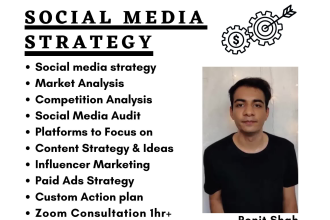

Level 2
I will create a social media strategy for your brand
4.9(292)


Pro
I will consult with you on your branding or brand strategy
5.0(278)


I will create a marketing strategy that grow your business faster
5.0(40)
6. Define your marketing budget
Just as every business is different, there isn’t a ‘one size fits all’ figure when it comes to determining your marketing budget. Because of this, defining a budget is often considered the most difficult aspect of putting together an online marketing strategy plan however, with the appropriate assistance and expertise, it doesn’t need to be.
Remember how we discussed the importance of a marketing strategist in the previous step? When discussing your business’ goals for your online promotion, your marketing strategist will give you a clearer idea of how much you can expect to spend on these promotional methods, as well as how you should allocate your budget across different channels.
Research suggests total marketing budgets are commonly between 8 and 16% of a business’s total revenue, with the average business allocating 45% of their total marketing budget to online promotional methods.
A marketing strategist will take a number of factors into consideration to help them determine your required budget for online promotion, such as:
- the cost to produce required content, such as blog articles, landing pages, or banners for SEM
- the cost-per-acquisition of target keywords
- hidden expenses such as outsourcing work to freelance experts or purchasing required software or tools
Along with enlisting the help of a marketing strategist, the other key to keeping your budget on track is to keep your campaign simple. Online promotion methods such as SEM, retargeting, and social media ads are becoming increasingly complicated, with campaigns costing thousands (or in some cases, millions) of dollars. A much more affordable form of online promotion, for example, is SEO, which largely only requires the cost of hiring an SEO expert.
Again, a marketing strategist will advise you on which promotional methods are not only the most affordable but also meet your goals and provide the best ROI in the least amount of time.
7. Define the KPIs for your various channels
KPIs (Key Performance Indicators) areused to measure the success of your campaigns. Here below we have listed the most common KPIs you should track across the various inbound channels.
#1. Social media advertising
- Number of clicks
- Number of likes
- Number of shares
- Number of comments
- Number of active (and new) followers
#2. Mobile advertising
- CPA (cost per acquisition)
- RR (Retention rate)
- Sales revenue
- Return on ad spend (ROAS)
#3. PPC/SEM
- CPA (cost-per-acquisition)
- CTR (click-through-rate)
- Conversion rate
- CPC (cost per click)
#4. SEO
- Number of Pageviews
- Keywords rankings (both, increases or decreases)
- Average session duration
- Number of natural backlinks
- Click-through-rate (CTR)
#5. Email marketing (retargeting/remarketing)
- Total clicks
- Click to conversion (CTC) rate
- Return on ad spend (ROAS)
- Total conversions
- Click-through rate (CTR)
#6. Affiliate marketing
- Number of new affiliates
- Number of new customers
- Average order value
- Average earnings per click
- Click traffic
8. Start a blog
Ensure you have a well-designed, professional website to direct potential customers to, as well as a blog filled with helpful posts to keep them sticking around.
Companies that blog receive 55% more web traffic and 67% more leads than those who don’t. Blogs provide your audience with helpful, share-worthy content and establish your business as an authority within your industry. Blogs also help increase your site’s opportunities to appear in Google search results, providing another avenue for prospective customers to find your business.
Tip: Do not disable comments on your blog. By allowing blog comments you encourage people to interact with your business, which will help you build trusting and long-term relationships
9. Leverage the power of social media
An incredible 55% of buyers do research via social media before making a purchase, so you’ll also want to ensure your business is being promoted on platforms such as Facebook, Twitter, Instagram, Pinterest, and more. Find out which platforms your target audience is most active on, then cater your promotion strategies (with the help of a social media marketing expert) to each of those.
10. Launch Email marketing campaigns
Email marketing still remains one of the most effective forms of online promotion, with 91% of shoppers wanting to hear from companies they do business with via this format. Emails are also the most commonly used forms of CRM (Customer Relationship Management), allowing brands to reach their audience through targeted email campaigns, regular newsletters, and other promotional methods that increase demand, such as sales and giveaways.
11. Promote your business through videos
Video marketing, when done right, is considered a very effective online strategy. Videos tend to cover niche topics and contain an engaged, passionate audience. Therefore, making a good impression can go a long way in establishing your business as an authority in these fields, helping you to attract leads and convert them into customers.
12. Answer questions, give solutions
Sites such as Quora and Reddit allow users to answer questions from other members of the community. The aim here is that users notice your high-quality, authoritative answers and follow outbound links to your webpage, where they discover more useful content, along with your related products or services.
Another helpful Q&A platform is Help a Reporter (HARO), which matches journalists with credible expert sources across a variety of fields, including small business owners. You simply respond to a HARO request related to your niche, and if you’re quoted as a source, you’ll establish yourself as a leader within your industry and potentially get the word out about your unique products or services.
13. Optimize your website for SEO
In today’s increasingly digital world, your website acts as your online storefront. Almost half of the buyers will visit a company’s website before making a purchasing decision, so make sure it has a professional, eye-catching, and engaging design and is free of spelling and grammatical errors.
If you want your website to be found, get traffic, and generate leads, then all your website’s pages must be optimized for SEO. If not there are no chances for search crawlers to find, index and rank your website. Nowadays SEO is a highly technical online strategy that requires specific knowledge and skills, therefore a good idea to help you save money and time, it’s to hire a professional SEO expert whose responsibility will be to find the key keywords for which your website should rank for, and strategically implement them within your pages Meta Tags for search engines’ relevancy.
14. Grow your traffic with forum marketing
Promoting your business through forums, when done right, is considereda very effective online strategy. Forums tend to cover niche topics and contain an engaged, passionate audience. Therefore, making a good impression can go a long way in establishing your business as an authority in these fields, helping you to attract leads and convert them into customers.
Specifically, look for forums that have at least 1,000 members and 10,000 posts, acquire several new posts daily, and aren’t filled with spam.
15. Monitor and analyze your KPIs
The final step is to monitor and analyze your marketing campaign’s results, including tracking KPIs, to determine if it is successful or not. Your KPIs will depend on the type of campaign you launched, as well as the specific goals of your business. Ask yourself:
- Did we meet our KPIs?
- Did we achieve the specific goal(s) we wanted to?
- What was the ROI? Is this higher, lower, or the same as we expected?
- What did we do well?
- What could we have done better?
- Overall, would we deem this campaign successful or unsuccessful? Why?
Conclusion
While there are plenty of options for marketing your business online, they all have one thing in common: digital marketing is a highly-effective way to present information to your target audience, increase demand for your products or services, and generate leads and sales for your business.
When it comes to promoting your business through online campaigns, there isn’t a ‘one size fits all’ approach. The online promotion methods you choose should be specifically catered towards your business, including your goals, target audience persona, and budget, in order to meet your KPIs and provide an excellent ROI.
It may seem like there’s a lot involved in online marketing, but thankfully, you’re not alone. With numerous marketing experts available to help you out, as well as our in-depth and step-by-step guide to promoting your business online in 2020, you’re already well on your way to achieving success.
Related Guides
7 Extensive Book Promotion Ideas to Drive Sales in 2024


What is affiliate marketing and how to get started


Categories
- Graphics & Design
- Digital Marketing
- Writing & Translation
- Video & Animation
- Music & Audio
- Fiverr Logo Maker
- Programming & Tech
- Data
- Business
- Lifestyle
- Photography
- End-to-End Projects
- Sitemap
About
- Careers
- Press & News
- Partnerships
- Privacy Policy
- Terms of Service
- Intellectual Property Claims
- Investor Relations
Support and Education
- Help & Support
- Trust & Safety
- Selling on Fiverr
- Buying on Fiverr
- Fiverr Guides
- Fiverr WorkspaceInvoice Software
- LearnOnline Courses
Community
englishlearningcurriculam
www.LetusLearnEnglish.Com

Course Curriculum
Intermediate Course (B1-B2 Level)
Beginner Course

Dialogue 1: An Invitation to the Park
Lesson 1: Formal & Informal Greetings
Lesson 2: Ways of Asking “How are you?”
Lesson 3: Ways of Responding to “How are you?”
Lesson 4: Question Words (What, Where, When…)
Lesson 5: Ways of Saying “Goodbye”
● Speaking Exercise
● Understanding Quiz
● Writing Exercise
Dialogue 3: Casual Weather Talk
Lesson 1: Talking About the Weather
Lesson 2: Basic Adjectives
Lesson 3: Using “Though”
Lesson 4: There is / There are
Lesson 5: Using “It sounds like…”
● Speaking Exercise
● Understanding Quiz
● Writing Exercise
Dialogue 5: At the Hair Salon
Lesson 1: Modal Verb: Can
Lesson 2: Hair Salon Vocabulary
Lesson 3: Ways of Saying “Of course”
Lesson 4: The Comparative
Lesson 5: Using “Too”
● Speaking Exercise
● Understanding Quiz
● Writing Exercise
Dialogue 7: Chatting Through the Week
Lesson 1: Days of the Week
Lesson 2: The Verb “To be”
Lesson 3: Adverbs of Frequency (Always, Often, Never..)
Lesson 4: The Verb “To have”
Lesson 5: Using “Hang out”
● Speaking Exercise
● Understanding Quiz
● Writing Exercise
Dialogue 9: Each Month has its Charm
Lesson 1: Months of the Year
Lesson 2: Valentine’s Day Vocabulary
Lesson 3: Halloween Vocabulary
Lesson 4: Christmas Vocabulary
Lesson 5: New Year Vocabulary
● Speaking Exercise
● Understanding Quiz
● Writing Exercise
Dialogue 11: Sharing Hobbies and Preferences
Lesson 1: Describing Likes & Dislikes
Lesson 2: Hobbies
Lesson 3: Book Genres
Lesson 4: Movie Genres
Lesson 5: Music Genres
● Speaking Exercise
● Understanding Quiz
● Writing Exercise
Dialogue 13: Grocery Shopping
Lesson 1: Fruits
Lesson 2: Vegetables
Lesson 3: Basic Verbs
Lesson 4: Using “On the go”
Lesson 5: Using “One”
● Speaking Exercise
● Understanding Quiz
● Writing Exercise
Dialogue 15: Compliments and Coffee Plans
Lesson 1: Giving Compliments
Lesson 2: Using “By the way”
Lesson 3: Describing Physical Appearance
Lesson 4: Describing Personality
Lesson 5: Using “Grab”
● Speaking Exercise
● Understanding Quiz
● Writing Exercise
Dialogue 17: Take it Easy
Lesson 1: Parts of the Face
Lesson 2: Parts of the Body
Lesson 3: Bed-Related Vocabulary
Lesson 4: Using “On a brighter note”
Lesson 5: Jewelries
● Speaking Exercise
● Understanding Quiz
● Writing Exercise
Dialogue 19: How’s Your Family?
Lesson 1: Family Members
Lesson 2: Ways of Saying “Congratulations”
Lesson 3: Adverbs
Lesson 4: Demonstrative Pronouns (This, That, These & Those)
Lesson 5: Using “Time flies”
● Speaking Exercise
● Understanding Quiz
● Writing Exercise
Dialogue 21: Preparing for a Journey
Lesson 1: Using “I think so” & “I don’t think so”
Lesson 2: Conjunctions (for, and, nor, but, or, yet, so)
Lesson 3: Using “Head”
Lesson 4: Contractions
Lesson 5: Plane Vocabulary
● Speaking Exercise
● Understanding Quiz
● Writing Exercise
Dialogue 23: Catching up and Dinner Plans
Lesson 1: Possessive ‘s
Lesson 2: So VS Too
Lesson 3: Using “Such”
Lesson 4: Anyone, Anybody, Anything, Anywhere, Anytime, Anyhow & Anyway
Lesson 5: Using “Look forward to”
● Speaking Exercise
● Understanding Quiz
● Writing Exercise
Dialogue 25: Planning a Coffee Meetup
Lesson 1: Negation With “Don’t/Doesn’t”
Lesson 2: Interrogation With “Do”
Lesson 3: Meals of the Day
Lesson 4: Prepositions of Time (at, in, on…)
Lesson 5: Definite Article “The”
● Speaking Exercise
● Understanding Quiz
● Writing Exercise
Dialogue 2: At the Bakery
Lesson 1: Subject Pronouns (I, You, He…)
Lesson 2: Bakery Vocabulary
Lesson 3: Present Simple Tense
Lesson 4: Numbers 0-20
Lesson 5: Expressions of Presentation (Here we go, Here it is…)
● Speaking Exercise
● Understanding Quiz
● Writing Exercise
Dialogue 4: Gabby’s Birthday Surprise
Lesson 1: Numbers 20-100
Lesson 2: What about you VS How about you
Lesson 3: Imperative Mood
Lesson 4: Clothes Vocabulary
Lesson 5: Ways of Saying “Thank you”
● Speaking Exercise
● Understanding Quiz
● Writing Exercise
Dialogue 6: Consultation for a Cold
Lesson 1: Sickness Vocabulary
Lesson 2: Possessive Adjectives (My, Your, His…)
Lesson 3: Using “Plenty”
Lesson 4: Ways of Saying “Get well soon!”
Lesson 5: Using “Feel free to…”
● Speaking Exercise
● Understanding Quiz
● Writing Exercise
Dialogue 8: Discussing the New Café
Lesson 1: Describing Places
Lesson 2: Using “Quite”
Lesson 3: Prepositions of Place (in, on, at…)
Lesson 4: Places in the City
Lesson 5: Phrasal Verbs With “Check”
● Speaking Exercise
● Understanding Quiz
● Writing Exercise
Dialogue 10: From Brazil to Canada
Lesson 1: Countries
Lesson 2: Nationalities
Lesson 3: Present Continuous Tense
Lesson 4: Languages
Lesson 5: Using “Enjoy”
● Speaking Exercise
● Understanding Quiz
● Writing Exercise
Dialogue 12: Discussing Daily Routines
Lesson 1: Describing Daily Routines
Lesson 2: Telling the Time
Lesson 3: Using “Then”
Lesson 4: Expressions With “Go for”
Lesson 5: Using “All”
● Speaking Exercise
● Understanding Quiz
● Writing Exercise
Dialogue 14: A Tour of the House
Lesson 1: Rooms of the House
Lesson 2: Objects in the House
Lesson 3: Here VS There VS Over there
Lesson 4: Possessive Pronouns (Mine, Yours, His…)
Lesson 5: Pet Animals
● Speaking Exercise
● Understanding Quiz
● Writing Exercise
Dialogue 16: Recalling a Dream Vacation
Lesson 1: Using “How was…”
Lesson 2: The Superlative
Lesson 3: Beach Vocabulary
Lesson 4: Beach Activities
Lesson 5: Indefinite Articles “A” & “An”
● Speaking Exercise
● Understanding Quiz
● Writing Exercise
Dialogue 18: Colors and Shapes in Our Surroundings
Lesson 1: Colors
Lesson 2: Modes of Transportation
Lesson 3: Shapes
Lesson 4: Everyone, Everybody, Everything & Everywhere
Lesson 5: Object Pronouns (Me, You, Him…)
● Speaking Exercise
● Understanding Quiz
● Writing Exercise
Dialogue 20: Directions to the Post Office
Lesson 1: Asking for Help
Lesson 2: Giving Directions
Lesson 3: Expressions With “Take”
Lesson 4: Using “Get”
Lesson 5: Using “Pretty”
● Speaking Exercise
● Understanding Quiz
● Writing Exercise
Dialogue 22: Observations in the Park
Lesson 1: Irregular Plurals
Lesson 2: Much VS Many
Lesson 3: Adverbs of Time (Now, Today, Soon…)
Lesson 4: Using “From”
Lesson 5: Ways of Saying “Interesting”
● Speaking Exercise
● Understanding Quiz
● Writing Exercise
Dialogue 24: Getting to Know Each Other
Lesson 1: Ways of Saying “Nice to meet you”
Lesson 2: Using “Especially”
Lesson 3: Using “Definitely”
Lesson 4: Flavors
Lesson 5: Ways of Saying “Awesome”
● Speaking Exercise
● Understanding Quiz
● Writing Exercise

Dialogue 1: Buying a Car
Lesson 1: Parts of a Car
Lesson 2: Some VS Any
Lesson 3: Prepositional Verbs (Rely on, Run out of, Pick up..)
Lesson 4: Using “Right”
Lesson 5: Phrasal Verbs With “Fill”
● Speaking Exercise
● Understanding Quiz
● Writing Exercise
Dialogue 3: Lisa’s Beach Holiday Preparation
Lesson 1: Present Perfect Tense
Lesson 2: Verb + Verb-ing
Lesson 3: Using “Be able to”
Lesson 4: About VS Around
Lesson 5: A lot of VS Lots of
● Speaking Exercise
● Understanding Quiz
● Writing Exercise
Dialogue 5: Organizing a Picnic
Lesson 1: Think of VS Think about
Lesson 2: Modal Verb: Should
Lesson 3: Future Simple Tense
Lesson 4: Drinks Vocabulary
Lesson 5: Maybe VS Perhaps
● Speaking Exercise
● Understanding Quiz
● Writing Exercise
Dialogue 7: Tech Talk
Lesson 1: Technology Vocabulary
Lesson 2: Which VS That
Lesson 3: Phrasal Verbs With “Look”
Lesson 4: For VS To
Lesson 5: Using “Good at”
● Speaking Exercise
● Understanding Quiz
● Writing Exercise
Dialogue 9: The Talking Parrot
Lesson 1: Say VS Tell
Lesson 2: Using “Even”
Lesson 3: Fun VS Funny
Lesson 4: Modal Verb: Could
Lesson 5: Using “What if”
● Speaking Exercise
● Understanding Quiz
● Writing Exercise
Dialogue 11: Punctuation Makes a Big Difference
Lesson 1: Punctuation
Lesson 2: Adverbs of Degree (Very, Too, Quite…)
Lesson 3: Make VS Do
Lesson 4: For + ing
Lesson 5: Advise VS Advice
● Speaking Exercise
● Understanding Quiz
● Writing Exercise
Dialogue 13: Packing for a Trip
Lesson 1: Modal Verb: Must
Lesson 2: Travel Items
Lesson 3: Expressions With “Make” & “Do”
Lesson 4: With VS Without
Lesson 5: Ways of Saying “Important”
● Speaking Exercise
● Understanding Quiz
● Writing Exercise
Dialogue 15: Comparing Yesterday’s Activities
Lesson 1: Past Continuous Tense
Lesson 2: Cooking Verbs
Lesson 3: Using “While”
Lesson 4: Using “Work out”
Lesson 5: Using “Turn out”
● Speaking Exercise
● Understanding Quiz
● Writing Exercise
Dialogue 17: After-School Activities
Lesson 1: Every day VS Everyday
Lesson 2: Learn VS Teach
Lesson 3: Musical Instruments
Lesson 4: Sports
Lesson 5: Using “Keep an eye out”
● Speaking Exercise
● Understanding Quiz
● Writing Exercise
Dialogue 19: At the Restaurant
Lesson 1: Titles: Mr, Mrs, Miss & Ms
Lesson 2: Phrases at the Restaurant
Lesson 3: Zero Conditional
Lesson 4: Ways of Saying “I’m sorry”
Lesson 5: First Conditional
● Speaking Exercise
● Understanding Quiz
● Writing Exercise
Dialogue 21: On the Phone
Lesson 1: “On the Phone” Expressions
Lesson 2: Household Chores
Lesson 3: Kitchen Utensils
Lesson 4: Phrasal Verbs With “Put”
Lesson 5: Using “Else”
● Speaking Exercise
● Understanding Quiz
● Writing Exercise
Dialogue 23: Booking a Hotel Room
Lesson 1: When to Omit “The”
Lesson 2: Booking a Hotel Room
Lesson 3: Ordinal Numbers (First, Second, Third…)
Lesson 4: Seem VS Look like
Lesson 5: Using “All set”
● Speaking Exercise
● Understanding Quiz
● Writing Exercise
Dialogue 25: Unwinding After a Long Day at Work
Lesson 1: Lie VS Lay
Lesson 2: Ways of Saying “Tired”
Lesson 3: Lose VS Lost
Lesson 4: Dessert VS Desert
Lesson 5: Rise VS Arise
● Speaking Exercise
● Understanding Quiz
● Writing Exercise
Dialogue 2: Jake’s Countryside Weekend with Grandparents
Lesson 1: Past Simple Tense
Lesson 2: Irregular Verbs
Lesson 3: Farm Animals
Lesson 4: Expressions of Quantity (A lot of, Plenty of, A few…)
Lesson 5: Phrasal Verbs With “Come”
● Speaking Exercise
● Understanding Quiz
● Writing Exercise
Dialogue 4: Job searching
Lesson 1: Jobs & Professions
Lesson 2: Quiet VS Quite VS Quit
Lesson 3: Expressions With “Give it…”
Lesson 4: Using “Kind of”
Lesson 5: Ways of Saying “Difficult”
● Speaking Exercise
● Understanding Quiz
● Writing Exercise
Dialogue 6: How’s College Life?
Lesson 1: Using “A bit”
Lesson 2: School Subjects
Lesson 3: Using “Catch up”
Lesson 4: Using “Each other”
Lesson 5: Sometimes VS Sometime
● Speaking Exercise
● Understanding Quiz
● Writing Exercise
Dialogue 8: Misadventures at the Park
Lesson 1: Prepositions of Direction (into, onto, towards…)
Lesson 2: Using “Dive in”
Lesson 3: Phrasal Verbs With “Take”
Lesson 4: Using “Instead of”
Lesson 5: Ways of Saying “I have no idea”
● Speaking Exercise
● Understanding Quiz
● Writing Exercise
Dialogue 10: Lost Glasses
Lesson 1: Prepositions of Spatial Relationship (Above, Below, Beside…)
Lesson 2: Adverbs of Manner (Carefully, Quickly, Gently…)
Lesson 3: Using “End up”
Lesson 4: Using “For a while”
Lesson 5: Happy VS Glad
● Speaking Exercise
● Understanding Quiz
● Writing Exercise
Dialogue 12: We all Make Mistakes
Lesson 1: Using “Down”
Lesson 2: Using “Through”
Lesson 3: As VS Like
Lesson 4: Using “Matter”
Lesson 5: Using “Ups and downs”
● Speaking Exercise
● Understanding Quiz
● Writing Exercise
Dialogue 14: Overcoming Boredom
Lesson 1: Bored VS Boring
Lesson 2: Something VS Someone VS Somebody VS Somewhere VS Sometimes VS Somehow
Lesson 3: Other VS Another
Lesson 4: Beside VS Besides
Lesson 5: Practice VS Practise
● Speaking Exercise
● Understanding Quiz
● Writing Exercise
Dialogue 16: Helping Find a Lost Notebook
Lesson 1: Describing Feelings
Lesson 2: Nobody VS No one VS Nothing VS Nowhere
Lesson 3: Watch VS See VS Look
Lesson 4: Ways of Saying “Easy”
Lesson 5: Good VS Well
● Speaking Exercise
● Understanding Quiz
● Writing Exercise
Dialogue 18: Documentary Night
Lesson 1: Actually VS Currently
Lesson 2: Borrow VS Lend
Lesson 3: The 5 Senses
Lesson 4: Alone VS Lonely
Lesson 5: Sea Animals
● Speaking Exercise
● Understanding Quiz
● Writing Exercise
Dialogue 20: Apartment unting
Lesson 1: Colloquial Expressions
Lesson 2: Using “Commute”
Lesson 3: Either… Or…
Lesson 4: Using “Scrolling”
Lesson 5: Using “Once”
● Speaking Exercise
● Understanding Quiz
● Writing Exercise
Dialogue 22: Room Organization Tips
Lesson 1: Than VS Then
Lesson 2: All ready VS Already
Lesson 3: Sensitive VS Sensible
Lesson 4: Breath VS Breathe
Lesson 5: Briefly VS Shortly
● Speaking Exercise
● Understanding Quiz
● Writing Exercise
Dialogue 24: Discussing Job Skills
Lesson 1: Skills
Lesson 2: Describing Skills
Lesson 3: Types of Coffee
Lesson 4: Customer VS Client
Lesson 5: Using “Make sure”
● Speaking Exercise
● Understanding Quiz
● Writing Exercise
Intermediate Course

Dialogue 1: Planning a Movie Night
Lesson 1: Past Simple VS Present Perfect Tense
Lesson 2: Present Simple VS Present Continuous
Lesson 3: Modal Verb: Would
Lesson 4: After VS Afterward
Lesson 5: Using “Be up for/to”
● Speaking Exercise
● Understanding Quiz
● Writing Exercise
Dialogue 3: Let’s Go Hiking!
Lesson 1: Modal Verb: Might
Lesson 2: Affect VS Effect
Lesson 3: Neither… Nor…
Lesson 4: Using “Figure out”
Lesson 5: Modal Verb: May
● Speaking Exercise
● Understanding Quiz
● Writing Exercise
Dialogue 5: Adjusting to a New Job and Neighborhood
Lesson 1: Used to VS Be used to VS Get used to
Lesson 2: Who VS Whom
Lesson 3: For me VS To me
Lesson 4: Reflexive Pronouns (Myself, Yourself…)
Lesson 5: Using “Altogether”
● Speaking Exercise
● Understanding Quiz
● Writing Exercise
Dialogue 7: Apology for Missing a Café Meetup
Lesson 1: Using “Get caught up”
Lesson 2: Past Perfect Tense
Lesson 3: Modal Perfect: Should have
Lesson 4: Using “As long as”
Lesson 5: Expressions With “Run”
● Speaking Exercise
● Understanding Quiz
● Writing Exercise
Dialogue 9: Dealing with Car Repairs
Lesson 1: Causative Structures (have something done)
Lesson 2: Past Simple VS Past Perfect Tense
Lesson 3: Further VS Farther
Lesson 4: Modal Perfect: Could have
Lesson 5: Using “Early on”
● Speaking Exercise
● Understanding Quiz
● Writing Exercise
Dialogue 11: A Fun Party Experience
Lesson 1: Abbreviations
Lesson 2: Reported Speech
Lesson 3: Was VS Were
Lesson 4: Using “One of”
Lesson 5: Present Perfect VS Past Perfect Tense
● Speaking Exercise
● Understanding Quiz
● Writing Exercise
Dialogue 13: The New Downtown Gem
Lesson 1: Coffee Shop Vocabulary
Lesson 2: Adjective + Preposition
Lesson 3: Quick VS Fast
Lesson 4: Phrasal Verbs With “Try”
Lesson 5: Spot VS Place VS Site
● Speaking Exercise
● Understanding Quiz
● Writing Exercise
Dialogue 15: Tom and Alice’s Weekend Anticipations
Lesson 1: Future Perfect Tense
Lesson 2: Using “By then”
Lesson 3: Phrasal Verbs With “Come”
Lesson 4: Talk VS Discuss
Lesson 5: Using “Ahead”
● Speaking Exercise
● Understanding Quiz
● Writing Exercise
Dialogue 17: Fitness Goals
Lesson 1: Phrasal Verbs With “Get”
Lesson 2: Ways of Saying “But”
Lesson 3: Using “Had better”
Lesson 4: Gerunds
Lesson 5: Phrasal Verbs With “Wind”
● Speaking Exercise
● Understanding Quiz
● Writing Exercise
Dialogue 19: Mountain Getaway Plans
Lesson 1: Using “Shall”
Lesson 2: Future Continuous Tense
Lesson 3: Stuff VS Things
Lesson 4: Using “Munch”
Lesson 5: Adverbial Clauses of Manner
● Speaking Exercise
● Understanding Quiz
● Writing Exercise
Dialogue 21: Hiking Adventure Plans
Lesson 1: The whole VS The entire
Lesson 2: Phrasal Verbs With “Walk”
Lesson 3: Adverbial Clauses of Place
Lesson 4: Common Idioms
Lesson 5: Using “Snooze”
● Speaking Exercise
● Understanding Quiz
● Writing Exercise
Dialogue 23: Planning the History Project
Lesson 1: Adverbial Clauses of Time
Lesson 2: Phrasal Verbs With “Pick”
Lesson 3: Phrasal Verbs With “Meet”
Lesson 4: Phrasal Verbs With “Go”
Lesson 5: Using “Nail”
● Speaking Exercise
● Understanding Quiz
● Writing Exercise
Dialogue 25: A Productive Day
Lesson 1: Reviewing All Modal Verbs
Lesson 2: Adverbial Clauses of Purpose
Lesson 3: Review VS Revise
Lesson 4: Tough VS Though VS Through VS Thorough VS Throughout
Lesson 5: Expressions With “Have”
● Speaking Exercise
● Understanding Quiz
● Writing Exercise
Dialogue 2: Discussing a Photography Project
Lesson 1: Present Perfect Continuous Tense
Lesson 2: For VS While VS During
Lesson 3: Present Perfect VS Present Perfect Continuous Tense
Lesson 4: Carry VS Hold
Lesson 5: Anywhere VS Everywhere VS Somewhere VS Nowhere
● Speaking Exercise
● Understanding Quiz
● Writing Exercise
Dialogue 4: A New Job Experience
Lesson 1: Another VS Other VS Others VS The other VS The others
Lesson 2: Relative Pronouns (Who, Whom, Whose…)
Lesson 3: Using “Own”
Lesson 4: Question Tags (Aren’t you?, Don’t you?…)
Lesson 5: Any VS No VS None
● Speaking Exercise
● Understanding Quiz
● Writing Exercise
Dialogue 6: Preparation for an Upcoming Meeting
Lesson 1: Remind VS Remember VS Recall
Lesson 2: Whether VS If
Lesson 3: Fewer VS Less
Lesson 4: Expect VS Except
Lesson 5: Using “Heads up”
● Speaking Exercise
● Understanding Quiz
● Writing Exercise
Dialogue 8: Staying Healthy
Lesson 1: Health & Fitness Vocabulary
Lesson 2: Using “All about”
Lesson 3: Using “Struggle with”
Lesson 4: Using “Lead”
Lesson 5: Using “Over time”
● Speaking Exercise
● Understanding Quiz
● Writing Exercise
Dialogue 10: Discussing a Local Art Exhibition
Lesson 1: Art Vocabulary
Lesson 2: Active & Passive Voice
Lesson 3: Ways of Saying “Famous”
Lesson 4: Whose VS Whom
Lesson 5: Using “Wish”
● Speaking Exercise
● Understanding Quiz
● Writing Exercise
Dialogue 12: Lisa’s Hiking Adventure
Lesson 1: Compound Adjectives with Numbers
Lesson 2: -ing Adjectives
Lesson 3: -ed Adjectives
Lesson 4: Reviewing All Present Tenses
Lesson 5: Compound Adjectives
● Speaking Exercise
● Understanding Quiz
● Writing Exercise
Dialogue 14: Alice’s Job Interview
Lesson 1: Using “Ace”
Lesson 2: Second Conditional
Lesson 3: Third Conditional
Lesson 4: Ways of Saying “Don’t worry”
Lesson 5: Using “Ever”
● Speaking Exercise
● Understanding Quiz
● Writing Exercise
Dialogue 16: A Weekend in the Mountains
Lesson 1: Mountain Vocabulary
Lesson 2: Modal Verb: Ought to
Lesson 3: Modal Verb: Dare
Lesson 4: Such VS So VS Such a VS Such as
Lesson 5: Ways of Saying “I agree”
● Speaking Exercise
● Understanding Quiz
● Writing Exercise
Dialogue 18: The Mailman’s Cat
Lesson 1: Wait VS Await
Lesson 2: Using “All over”
Lesson 3: Coworker VS Colleague
Lesson 4: Ways of Saying “Small”
Lesson 5: Using “These days”
● Speaking Exercise
● Understanding Quiz
● Writing Exercise
Dialogue 20: Strategizing the Blog Post
Lesson 1: Modal Perfect: Must have
Lesson 2: Phrasal Verbs With “Stand”
Lesson 3: Phrasal Verbs With “Bring”
Lesson 4: Social Media & Internet Vocabulary
Lesson 5: Phrasal Verbs With “Hang”
● Speaking Exercise
● Understanding Quiz
● Writing Exercise
Dialogue 22: New Project Team Strategy
Lesson 1: Adverbial Clauses of Condition
Lesson 2: Phrasal Verbs With “Break”
Lesson 3: Using “Handle”
Lesson 4: Common Idioms
Lesson 5: Phrasal Verbs With “Help”
● Speaking Exercise
● Understanding Quiz
● Writing Exercise
Dialogue 24: The Community Clean-up
Lesson 1: Environment Vocabulary
Lesson 2: Need to VS Have to
Lesson 3: Might VS May
Lesson 4: Using “Just in case”
Lesson 5: Adverbial Clauses of Reason
● Speaking Exercise
● Understanding Quiz
● Writing Exercise

Dialogue 1: The Charity Event
Lesson 1: Past Perfect Continuous Tense
Lesson 2: Using “For the past”
Lesson 3: Although VS Though VS Even though
Lesson 4: Expressions With “Be”
Lesson 5: Phrasal Verbs With “Pull”
● Speaking Exercise
● Understanding Quiz
● Writing Exercise
Dialogue 3: A Conversation Between Warriors
Lesson 1: War & Peace Vocabulary
Lesson 2: Linking Words of Addition
Lesson 3: Each other VS One another
Lesson 4: Using “Mere”
Lesson 5: Using “Aftermath”
● Speaking Exercise
● Understanding Quiz
● Writing Exercise
Dialogue 5: The Future of Journalism
Lesson 1: News & Media Vocabulary
Lesson 2: Future Perfect Continuous
Lesson 3: Linking Words of Opposition
Lesson 4: Prefixes (Un-, Im-, Dis-…)
Lesson 5: Using “Albeit”
● Speaking Exercise
● Understanding Quiz
● Writing Exercise
Dialogue 7: Morning Coffee Plans
Lesson 1: Passive Voice (Advanced)
Lesson 2: For me VS To me
Lesson 3: Preparatory Subjects (It & There)
Lesson 4: Describing Atmosphere
Lesson 5: Using “In order”
● Speaking Exercise
● Understanding Quiz
● Writing Exercise
Dialogue 9: Planning Financial Investments
Lesson 1: Money & Finance Vocabulary
Lesson 2: Reviewing All Future Tenses
Lesson 3: Using “Allocate”
Lesson 4: Infinitive of Purpose
Lesson 5: Expressions With “Stay”
● Speaking Exercise
● Understanding Quiz
● Writing Exercise
Dialogue 11: Reflecting on a Trip to Italy
Lesson 1: Possessive ’s With Time Expressions
Lesson 2: Modal Perfect: Would have
Lesson 3: Using “Scratch the surface”
Lesson 4: Tourism Vocabulary
Lesson 5: Proper VS Appropriate VS Suitable
● Speaking Exercise
● Understanding Quiz
● Writing Exercise
Dialogue 13: Discussing Urban Redevelopment
Lesson 1: Construction Vocabulary
Lesson 2: Advanced Causative Structures
Lesson 3: In the long run VS In the long term
Lesson 4: Improve VS Enhance
Lesson 5: Linking Words of Conclusion
● Speaking Exercise
● Understanding Quiz
● Writing Exercise
Dialogue 15: Planning Party Food for Guests
Lesson 1: Advanced Use of Quantifiers (a few, a little, many…)
Lesson 2: Using “Wonder”
Lesson 3: Direct VS Indirect Questions
Lesson 4: Linking Words of Conclusion
Lesson 5: Think through VS Think over
● Speaking Exercise
● Understanding Quiz
● Writing Exercise
Dialogue 17: Overheating in Circuit Design
Lesson 1: Linking Words of Time
Lesson 2: Gerund and Infinitive (Advanced)
Lesson 3: Engineering Vocabulary
Lesson 4: Encounter VS Meet
Lesson 5: Input VS Output
● Speaking Exercise
● Understanding Quiz
● Writing Exercise
Dialogue 19: Finding a Quiet Workspace
Lesson 1: Using “Due to”
Lesson 2: Linking Words of Place
Lesson 3: Expressions With “Fall”
Lesson 4: Emphatic Structures
Lesson 5: Ellipsis and Substitution
● Speaking Exercise
● Understanding Quiz
● Writing Exercise
Dialogue 21: Guidance and Encouragement for a Thesis Proposal
Lesson 1: Academic Vocabulary
Lesson 2: Expressing Emotions and Feelings (Advanced)
Lesson 3: Phrasal Verbs With “Ask”
Lesson 4: Excited VS Eager
Lesson 5: Using “Endeavor”
● Speaking Exercise
● Understanding Quiz
● Writing Exercise
Dialogue 23: Addressing Student Concerns After a Midterm Exam
Lesson 1: Phrasal Verbs With “Pass”
Lesson 2: Advanced Question Forms
Lesson 3: Contrastive Stress in Speech
Lesson 4: Using “Grasp”
Lesson 5: Expressions With “Feel”
● Speaking Exercise
● Understanding Quiz
● Writing Exercise
Dialogue 25: Providing a Project Update
Lesson 1: Advanced Prepositions
Lesson 2: Phrasal Verbs With “Hand”
Lesson 3: Polite Forms and Formal Language
Lesson 4: Using “Reach out”
Lesson 5: Using “Thus”
● Speaking Exercise
● Understanding Quiz
● Writing Exercise
Dialogue 2: Jack and Lucy’s Breakup
Lesson 1: Relationships Vocabulary
Lesson 2: Reviewing All Past Tenses
Lesson 3: Using “Back then”
Lesson 4: Expressions With “Be in”
Lesson 5: Stay VS Remain
● Speaking Exercise
● Understanding Quiz
● Writing Exercise
Dialogue 4: A Day at the Amusement Park
Lesson 1: Amusement Park Vocabulary
Lesson 2: Reported Speech (Advanced)
Lesson 3: Modal Perfect: Might have
Lesson 4: Subjunctive Mood
Lesson 5: Phrasal Verbs With “Miss”
● Speaking Exercise
● Understanding Quiz
● Writing Exercise
Dialogue 6: Making Career Choices Under Uncertainty
Lesson 1: Reviewing All Conditional Sentences (Zero, First, Second, Third)
Lesson 2: Alternative to “If” in Conditional (Unless, In case, Whether or not…)
Lesson 3: Switch VS Change
Lesson 4: Linking Words of Concession
Lesson 5: Using “Understandably so”
● Speaking Exercise
● Understanding Quiz
● Writing Exercise
Dialogue 8: Preparing for the Big Presentation
Lesson 1: Modal Perfect: May have
Lesson 2: Participle Clauses
Lesson 3: Linking Words of Condition
Lesson 4: Once VS One time
Lesson 5: Using “On the spot”
● Speaking Exercise
● Understanding Quiz
● Writing Exercise
Dialogue 10: Exploring the Depths of Psychology
Lesson 1: Suffixes
Lesson 2: Linking Words of Emphasis
Lesson 3: Cleft Sentences
Lesson 4: Emphasize VS Highlight
Lesson 5: Day-to-day VS Daily
● Speaking Exercise
● Understanding Quiz
● Writing Exercise
Dialogue 12: Home Renovation
Lesson 1: Compound Nouns & Possessive Forms
Lesson 2: Reviewing All Modal Perfect Verbs
Lesson 3: Phrasal Verbs With “Give”
Lesson 4: Using “Go overboard”
Lesson 5: Using “Have a knack”
● Speaking Exercise
● Understanding Quiz
● Writing Exercise
Dialogue 14: Relaxing Riverside Walk
Lesson 1: Along VS Alongside
Lesson 2: Ensure VS Assure
Lesson 3: Using “Speaking of”
Lesson 4: Beside VS Besides
Lesson 5: Using “Hidden gem”
● Speaking Exercise
● Understanding Quiz
● Writing Exercise
Dialogue 16: Strategizing to Meet Project Deadlines
Lesson 1: Business Vocabulary
Lesson 2: Idiomatic Expressions
Lesson 3: Making Suggestions
Lesson 4: Using “Free up”
Lesson 5: Together VS Altogether
● Speaking Exercise
● Understanding Quiz
● Writing Exercise
Dialogue 18: Debating Solutions to Urban Traffic Congestion
Lesson 1: Unreal Uses of Past Tenses (Wish, Would Rather, If only, It’s time)
Lesson 2: Expressions for Debating and Arguing
Lesson 3: Using “Foresight”
Lesson 4: Synonyms
Lesson 5: Using “Have a say in”
● Speaking Exercise
● Understanding Quiz
● Writing Exercise
Dialogue 20: Catching up and Making Plans
Lesson 1: Slang and Informal Language
Lesson 2: Cultural and Social Terms
Lesson 3: Advanced Adjectives
Lesson 4: Gaming Vocabulary
Lesson 5: Phrasal Verbs With “Set”
● Speaking Exercise
● Understanding Quiz
● Writing Exercise
Dialogue 22: Strategies for Improving Sales Team Performance
Lesson 1: Phrasal Verbs With “Turn”
Lesson 2: Noun Phrase Complexity
Lesson 3: Complex Sentence Structures
Lesson 4: Expressions With “Need”
Lesson 5: Using “Overnight”
● Speaking Exercise
● Understanding Quiz
● Writing Exercise
Dialogue 24: Addressing a Client’s Request for Project Changes
Lesson 1: Advanced Punctuation
Lesson 2: Nominalisation
Lesson 3: Phrasal Verbs with “Hold”
Lesson 4: Maintain VS Sustain
Lesson 5: Using “Hinge”
● Speaking Exercise
● Understanding Quiz
● Writing Exercise
Advanced Course

Dialogue 1: Branching Out and Balancing Life
Lesson 1: Using “Dabble”
Lesson 2: Using “Mull over”
Lesson 3: Using “Outdoorsy”
Lesson 4: Using “Daily Grind”
Lesson 5: Using “Get bogged down”
● Speaking Exercise
● Understanding Quiz
● Writing Exercise
Dialogue 3: The Evolution of Artificial Intelligence
Lesson 1: Using “Stringent”
Lesson 2: Using “Interplay”
Lesson 3: Using “Outlook”
Lesson 4: Using “Harness”
Lesson 5: Using “Augment”
● Speaking Exercise
● Understanding Quiz
● Writing Exercise
Dialogue 5: Exploring the Ocean Depths
Lesson 1: Using “Stride”
Lesson 2: Using “Frigid”
Lesson 3: Using “Groundbreaking”
Lesson 4: Using “Conduct”
Lesson 5: Using “Compromised”
● Speaking Exercise
● Understanding Quiz
● Writing Exercise
Dialogue 7: Extraterrestrial Life
Lesson 1: Using “Sheer”
Lesson 2: Using “Conundrum”
Lesson 3: Using “Alter”
Lesson 4: Using “Multidisciplinary”
Lesson 5: Using “Ramifications”
● Speaking Exercise
● Understanding Quiz
● Writing Exercise
Dialogue 9: The Significance of Dreams
Lesson 1: Using “Repressed”
Lesson 2: Using “Insight”
Lesson 3: Using “Prophetic”
Lesson 4: Using “Somewhat”
Lesson 5: Using “Psyche”
● Speaking Exercise
● Understanding Quiz
● Writing Exercise
Dialogue 11: The Science of Nutrition and Health
Lesson 1: Using “Overlook”
Lesson 2: Using “Adage”
Lesson 3: Using “Relevant”
Lesson 4: Using “One-size-fits-all”
Lesson 5: Using “Ever-evolving”
● Speaking Exercise
● Understanding Quiz
● Writing Exercise
Dialogue 13: Advancements in Medicine
Lesson 1: Using “Unprecedented”
Lesson 2: Using “Leap”
Lesson 3: Using “Underserved”
Lesson 4: Using “Empower”
Lesson 5: Using “Concerted”
● Speaking Exercise
● Understanding Quiz
● Writing Exercise
Dialogue 15: The Evolution of Language and Communication
Lesson 1: Using “Entity”
Lesson 2: Using “Facilitate”
Lesson 3: Using “Undergo”
Lesson 4: Using “Catalyze”
Lesson 5: Using “Die out”
● Speaking Exercise
● Understanding Quiz
● Writing Exercise
Dialogue 17: Ancient Civilizations and Their Mysteries
Lesson 1: Using “Remnants”
Lesson 2: Using “Baffle”
Lesson 3: Using “Compelling”
Lesson 4: Using “Decipher”
Lesson 5: Using “Enduring”
● Speaking Exercise
● Understanding Quiz
● Writing Exercise
Dialogue 19: The Evolution of Education Systems
Lesson 1: Using “Reflect”
Lesson 2: Using “Rote”
Lesson 3: Using “Holistic”
Lesson 4: Using “Grounded”
Lesson 5: Using “Equip”
● Speaking Exercise
● Understanding Quiz
● Writing Exercise
Dialogue 21: The Psychology of Leadership and Influence
Lesson 1: Using “Self-awareness”
Lesson 2: Using “Directive”
Lesson 3: Using “Critical”
Lesson 4: Using “Integrity”
Lesson 5: Using “Instill”
● Speaking Exercise
● Understanding Quiz
● Writing Exercise
Dialogue 23: The Future of Urban Planning
Lesson 1: Using “Contemplate”
Lesson 2: Using “Infrastructure”
Lesson 3: Using “A select few”
Lesson 4: Using “Inclusive”
Lesson 5: Using “Thrive”
● Speaking Exercise
● Understanding Quiz
● Writing Exercise
Dialogue 25: The Ethics of Cloning and Stem Cell Research
Lesson 1: Using “Field”
Lesson 2: Using “Immense”
Lesson 3: Using “Contentious”
Lesson 4: Using “Sole”
Lesson 5: Using “Unforeseen”
● Speaking Exercise
● Understanding Quiz
● Writing Exercise
Dialogue 2: The Future of Space Exploration
Lesson 1: Using “Ponder”
Lesson 2: Using “Foresee”
Lesson 3: Using “Unparalleled”
Lesson 4: Using “Paramount”
Lesson 5: Using “Odyssey”
● Speaking Exercise
● Understanding Quiz
● Writing Exercise
Dialogue 4: The Impact of Social Media on Society
Lesson 1: Using “Multifaceted”
Lesson 2: Using “Foster”
Lesson 3: Using “Exacerbate”
Lesson 4: Using “Underscore”
Lesson 5: Using “Discerning”
● Speaking Exercise
● Understanding Quiz
● Writing Exercise
Dialogue 6: The Psychology of Happiness
Lesson 1: Using “Interlink”
Lesson 2: Using “Paradoxical”
Lesson 3: Using “Elusive”
Lesson 4: Using “Strive”
Lesson 5: Using “Encompass”
● Speaking Exercise
● Understanding Quiz
● Writing Exercise
Dialogue 8: The Influence of Advertising on Consumer Behavior
Lesson 1: Using “Appeal”
Lesson 2: Using “Sway”
Lesson 3: Using “Double-edged sword”
Lesson 4: Using “Prevalent”
Lesson 5: Using “Strike”
● Speaking Exercise
● Understanding Quiz
● Writing Exercise
Dialogue 10: Historical What-If Scenarios
Lesson 1: Using “Engross”
Lesson 2: Using “Counterfactual”
Lesson 3: Using “Thought-provoking”
Lesson 4: Using “Shifted”
Lesson 5: Using “Contingency”
● Speaking Exercise
● Understanding Quiz
● Writing Exercise
Dialogue 12: The Ethics of Animal Rights and Zoos
Lesson 1: Using “Grapple”
Lesson 2: Using “Grey area”
Lesson 3: Using “Endangered”
Lesson 4: Using “Welfare”
Lesson 5: Using “Outreach”
● Speaking Exercise
● Understanding Quiz
● Writing Exercise
Dialogue 14: The Science of Sleep
Lesson 1: Using “Delve”
Lesson 2: Using “Consolidate”
Lesson 3: Using “Vivid”
Lesson 4: Using “Rejuvenate”
Lesson 5: Using “Advent”
● Speaking Exercise
● Understanding Quiz
● Writing Exercise
Dialogue 16: The Role of Comedy and Humor in Society
Lesson 1: Using “Palatable”
Lesson 2: Using “Catalyst”
Lesson 3: Using “Spark”
Lesson 4: Using “Discourse”
Lesson 5: Using “Bridge”
● Speaking Exercise
● Understanding Quiz
● Writing Exercise
Dialogue 18: Universal Basic Income
Lesson 1: Using “Displacement”
Lesson 2: Using “Irrespective”
Lesson 3: Using “Incentive”
Lesson 4: Using “In this regard”
Lesson 5: Using “Proponents”
● Speaking Exercise
● Understanding Quiz
● Writing Exercise
Dialogue 20: The Influence of Music on Culture
Lesson 1: Using “Transcend”
Lesson 2: Using “Cross-cultural”
Lesson 3: Using “Widespread”
Lesson 4: Using “Overshadow”
Lesson 5: Using “Interplay”
● Speaking Exercise
● Understanding Quiz
● Writing Exercise
Dialogue 22: Climate Change Solutions
Lesson 1: Using “Daunting”
Lesson 2: Using “Pattern”
Lesson 3: Using “Mitigate”
Lesson 4: Using “Withstand”
Lesson 5: Using “Coastal”
● Speaking Exercise
● Understanding Quiz
● Writing Exercise
Dialogue 24: The Evolution of Video Games
Lesson 1: Using “Intricate”
Lesson 2: Using “Phenomena”
Lesson 3: Using “Realm”
Lesson 4: Using “Blur”
Lesson 5: Using “Boundary”
● Speaking Exercise
● Understanding Quiz
● Writing Exercise

Dialogue 1: The Philosophy and Ethics of Time Travel
Lesson 1: Using “Quandaries”
Lesson 2: Using “Causality”
Lesson 3: Using “Standpoint”
Lesson 4: Using “Minefield”
Lesson 5: Using “Spawn”
● Speaking Exercise
● Understanding Quiz
● Writing Exercise
Dialogue 3: The Importance of Biodiversity and Ecosystems
Lesson 1: Using “Myriad”
Lesson 2: Using “In turn”
Lesson 3: Using “Interconnectedness”
Lesson 4: Using “Tangible”
Lesson 5: Using “Inherent”
● Speaking Exercise
● Understanding Quiz
● Writing Exercise
Dialogue 5: The Future of Cryptography
Lesson 1: Using “Juncture”
Lesson 2: Using “Looming”
Lesson 3: Using “Conceptual”
Lesson 4: Using “Prevalent”
Lesson 5: Using “Apparent”
● Speaking Exercise
● Understanding Quiz
● Writing Exercise
Dialogue 7: Cultural Diversity and Globalization
Lesson 1: Using “Erosion”
Lesson 2: Using “Proliferation”
Lesson 3: Using “Dilution”
Lesson 4: Using “Enrich”
Lesson 5: Using “Marginalized”
● Speaking Exercise
● Understanding Quiz
● Writing Exercise
Dialogue 9: The Evolution of Comedy Across Cultures
Lesson 1: Using “Subtlety”
Lesson 2: Using “Prevailing”
Lesson 3: Using “Guise”
Lesson 4: Using “Jester”
Lesson 5: Using “Enlighten”
● Speaking Exercise
● Understanding Quiz
● Writing Exercise
Dialogue 11: The Psychology of Color
Lesson 1: Using “Mourn”
Lesson 2: Using “Energize”
Lesson 3: Using “Intersect”
Lesson 4: Using “Embed”
Lesson 5: Using “Tapestry”
● Speaking Exercise
● Understanding Quiz
● Writing Exercise
Dialogue 13: The Impact of Social Media on Language
Lesson 1: Using “Usher”
Lesson 2: Using “Ubiquitous”
Lesson 3: Using “Commonplace”
Lesson 4: Using “Erode”
Lesson 5: Using “Predominance”
● Speaking Exercise
● Understanding Quiz
● Writing Exercise
Dialogue 15: The Science of Memory
Lesson 1: Using “Encode”
Lesson 2: Using “Retrieve”
Lesson 3: Using “Cornerstone”
Lesson 4: Using “Liken”
Lesson 5: Using “Episodic”
● Speaking Exercise
● Understanding Quiz
● Writing Exercise
Dialogue 17: The World of Professional eSports
Lesson 1: Using “Mere”
Lesson 2: Using “Encompass”
Lesson 3: Using “Pivotal”
Lesson 4: Using “Prevalence”
Lesson 5: Using “Regimes”
● Speaking Exercise
● Understanding Quiz
● Writing Exercise
Dialogue 19: The History of Clocks and Timekeeping
Lesson 1: Using “Quest”
Lesson 2: Using “Propel”
Lesson 3: Using “Pinnacle”
Lesson 4: Using “Ornate”
Lesson 5: Using “Relentless”
● Speaking Exercise
● Understanding Quiz
● Writing Exercise
Dialogue 21: The Art and Science of Chocolate Making
Lesson 1: Using “Connoisseur”
Lesson 2: Using “Ferment”
Lesson 3: Using “Grind”
Lesson 4: Using “Snap”
Lesson 5: Using “Akin”
● Speaking Exercise
● Understanding Quiz
● Writing Exercise
Dialogue 23: The Mystery of Lost Civilizations
Lesson 1: Using “Once-great”
Lesson 2: Using “Unrest”
Lesson 3: Using “Folklore”
Lesson 4: Using “Cyclical”
Lesson 5: Using “Adversity”
● Speaking Exercise
● Understanding Quiz
● Writing Exercise
Dialogue 25: The Phenomenon of Synesthesia
Lesson 1: Using “Conventional”
Lesson 2: Using “Vivid”
Lesson 3: Using “Disorienting”
Lesson 4: Using “Conflicting”
Lesson 5: Using “Retrieval”
● Speaking Exercise
● Understanding Quiz
● Writing Exercise
The one who cheated is not from us=جس نے دھوکہ دیا وہ ھم میں سے نھیں ہے
فرمانِ مصطفیٰ مُحَمَّد ﷺ
جس نے دھوکہ دیا وہ ھم میں سے نھیں ہے
Decree of Mustafa Muhammad ﷺThe one who cheated is not from us
https://news.dawateislami.net/category/dhoke-ki-muzammat-per-farameen-e-mustafa
فرمانِ مصطفیٰ مُحَمَّد ﷺ
جس نے دھوکہ دیا وہ ھم میں سے نھیں ہے

دھوکا ایک ایسا قبیح عمل ہے جسے ہر صورت میں اسلام نے نا پسند قرار دیا ہے جبکہ آج دھوکہ دہی لوگوں کے درمیان ایک عام سی چیز بن گئی ہے، لوگ ایک دوسرے کو اس طرح دھوکا دیتے ہیں گویا ان کے نزدیک اسلام میں یہ حرام اور گناہ کا کام ہی نہ ہو ۔دھوکے میں دنیاوی اور اخروی دونوں طرح کے نقصان ہیں۔ دھوکہ بازوں کے بارے میں اللہ تعالیٰ قرآن پاک میں فرماتا ہے: یُخٰدِعُوْنَ اللّٰهَ وَ الَّذِیْنَ اٰمَنُوْا ۚ-وَ مَا یَخْدَعُوْنَ اِلَّاۤ اَنْفُسَهُمْ وَ مَا یَشْعُرُوْنَؕ(۹)ترجَمۂ کنزُالایمان: فریب دیا چاہتے ہیں اللہ اور ایمان والوں کو اور حقیقت میں فریب نہیں دیتے مگر اپنی جانوں کو اور انہیں شعور نہیں۔(پ1،البقرۃ:9)
دھوکے کی تعریف:علامہ عبدالرؤف مناوی رحمۃ اللہ علیہ لکھتے ہیں :کسی چیز کی(اصلی)حالت کو پوشیدہ رکھنا دھوکا ہے۔(فیض القدیر،ج6،ص240،تحت الحدیث:8879)
دھوکے کے متعلق احادیثِ مبارکہ:
حدیث:دھوکا دینے والے سے اللہ عزوجل کے محبوب صلَّی اللہ علیہ واٰلہٖ وسلَّم نے لاتعلقی کااظہار کیا ہے چنانچہ سیدنا ابوہریرہ رضی اللہ عنہ سے روایت ہے، رسول صلَّی اللہ علیہ واٰلہٖ وسلَّم نے فرمایا: ”جو شخص ہم پر ہتھیار اٹھائے وہ ہم میں سے نہیں ہے اور جو شخص ہم کو دھوکا دے وہ ہم میں سے نہیں ہے۔(صحيح مسلم/كِتَاب الْإِيمَان،حدیث: 283)
حدیث:رسولُ اللہ صلَّی اللہ علیہ واٰلہٖ وسلَّم نے فرمایا: ”قافلہ سے نہ ملو بیع کے لیے۔اور نہ بیچے شہر والا باہر والے کے مال کو اور نہ بند رکھو تھن میں دودھ اونٹ کا یا بکری کا پھر کوئی خریدے ایسے جانور کو (جس کا دودھ تھن میں رکھا گیا ہو دھوکا دینے کے لیے) تو خریدنے والے کو اختیار ہے (جب وہ دودھ دوہے اور اس کو معلوم ہو کہ دودھ اتنا نہیں نکلا جتنا گمان تھا) اگر پسند آئے تو رکھ لے اور جو ناپسند ہو تو وہ جانور واپس کر دے اور ایک صاع کھجور کا دودھ کے بدلے پھیر دے۔(صحيح مسلم/كِتَاب الْبُيُوعِ، حدیث:3815 ملتقط)
حدیث:نبی کریم صلَّی اللہ علیہ واٰلہٖ وسلَّم نے فرمایا کہ فریب دوزخ میں لے جائے گا اور جو شخص ایسا کام کرے جس کا حکم ہم نے نہیں دیا تو وہ مردود ہے۔(صحيح البخاري/كِتَاب الْبُيُوعِ /حدیث2142)
حدیث:اللہ کے آخری نبی حضرت محمد صلَّی اللہ علیہ واٰلہٖ وسلَّم نے فرمایا: “المكر والخديعة في النار “مکر اور دھوکا آگ میں ہیں۔(سلسلۃ احاديث صحيحه/الاخلاق والبروالصلة /حدیث:2567)
مذکورہ آ یت اور احایثِ مبارکہ سے یہ بات روزِ روشن کی طرح واضح ہے کہ اسلام دھوکا دہی کو سخت نا پسند کرتا ہے کہ چنانچہ سیدی سندی اعلی حضرت علیہ الرحمۃ ارشاد فرماتےہیں:’’غدر (دھوکا دہی)و بد عہدی مطلقاً سب سے حرام ہے مسلم ہو یا کافر، ذمی ہو یا حربی، مستامن ہو یا غیر مستامن، اصلی ہو یا مرتد ۔ (فتاوی رضویہ، جلد 14، صفحہ 139، رضا فاؤنڈیشن، لاهور)
اللہ تبارک و تعالیٰ ہمیں دھوکا دینے اور دھوکا کھانے سے محفوظ فرمائے۔آمین
फसवणूक हे एक घृणास्पद कृत्य आहे ज्याचा इस्लामने प्रत्येक बाबतीत निषेध केला आहे, तर आज फसवणूक ही लोकांमध्ये एक सामान्य गोष्ट बनली आहे, लोक एकमेकांना फसवतात जणू त्यांच्या मते ते इस्लाममध्ये निषिद्ध आहे आणि पाप करू नका. फसवणूक दोन्ही सांसारिक आहे. आणि नंतरचे नुकसान. फसवणूक करणाऱ्यांबद्दल, अल्लाह सर्वशक्तिमान पवित्र कुरआनमध्ये म्हणतो: येखदुन अल्लाह वा अल-धिन अमानवा – आणि ते स्वतःला सोडून काय फसवतात आणि त्यांना काय वाटते (९) कंझल इमानचे भाषांतर: ते अल्लाह आणि विश्वासणाऱ्यांना फसवू इच्छितात आणि प्रत्यक्षात त्यांच्या आत्म्यांना फसवू नका आणि त्यांना जाणीव नाही (Q1, अल-बकारा: 9).
फसवणुकीची व्याख्या: अल्लामा अब्दुल रौफ मनवी (अल्लाह दया) लिहितात: एखाद्या गोष्टीची (मूळ) स्थिती लपवून ठेवणे म्हणजे फसवणूक होय.
फसवणूक बद्दल अहादीस:
हदीस: अल्लाहचा प्रिय, देव त्याला आशीर्वाद देईल आणि त्याला शांती देईल, त्याने फसवणूक करणाऱ्याबद्दल आपली उदासीनता व्यक्त केली आहे, म्हणून सय्यदुना अबू हुरैरा यांच्याकडून असे वर्णन केले गेले आहे की, देव त्याला आशीर्वाद देईल आणि त्याला शांती देईल, देवाचे मेसेंजर, देवाचे त्याला आशीर्वाद द्या आणि त्याला शांती द्या, म्हणाले: “जो कोणी आमच्यावर शस्त्र उचलतो तो आमच्यापैकीच आहे.” नाही, आणि जो आम्हाला फसवतो तो आमच्यापैकी नाही. (सहीह मुस्लिम/किताब अल-इमान, हदीस: 283)
हदीस: अल्लाहचा मेसेंजर, देवाने त्याला आशीर्वाद द्यावा आणि त्याला शांती द्यावी, असे म्हटले: “विक्रीसाठी काफिला भेटू नका. आणि बाहेरच्या लोकांची मालमत्ता विकू नका, आणि उंट किंवा बकरीचे दूध ठेवू नका. कासे, मग कोणीतरी असा प्राणी विकत घेऊ द्या.” (ज्याचे दूध कासेमध्ये फसवण्यासाठी ठेवलेले आहे) तर खरेदीदाराचा अधिकार आहे (जेव्हा तो दूध काढतो आणि त्याला लक्षात येते की त्याला वाटले तितके दूध बाहेर आले नाही) जर त्याला आवडत असेल तर तो ठेवू शकतो आणि जर त्याला आवडत नसेल तर तो ठेवू शकतो.
हदीस: पैगंबर, देवाने त्याला आशीर्वाद द्यावा आणि त्याला शांती द्यावी, असे म्हटले आहे की फसवणूक नरकात नेईल, आणि जो कोणी असे काही करतो ज्याचा आम्ही आदेश दिलेला नाही, तर तो नाकारला जातो.
हदीस: अल्लाहचा शेवटचा संदेष्टा, हजरत मुहम्मद, देवाने त्याला आशीर्वाद द्यावा आणि त्याला शांती द्यावी, असे म्हटले: “अल-मकर वाल-खिदिया फी अन-अन-अर” (मकर आणि फसवणूक अग्नीमध्ये आहे).
वरील उल्लेख केलेल्या आयती आणि आहिथांवरून हे स्पष्ट आहे की इस्लामला फसवणूक आवडत नाही, म्हणूनच सिदी सिंदी आला हजरत (अलेही रहमत) म्हणतात: “विश्वासघात (फसवणूक) आणि वाईट आश्वासने पूर्णपणे निषिद्ध आहेत.” मग तो एक असो. मुस्लिम किंवा काफिर, धम्मी किंवा हरबी, आस्तिक किंवा अविश्वासी, वास्तववादी किंवा धर्मत्यागी. (फतवी रझाविया, खंड 14, पृष्ठ 139, रझा फाऊंडेशन, लाहोर)
अल्लाह तआला आम्हाला फसवणूक आणि फसवणूक होण्यापासून वाचवेल. आमेन

دھوکا ایک ایسا قبیح عمل ہے جسے ہر صورت میں اسلام نے نا پسند قرار دیا ہے جبکہ آج دھوکہ دہی لوگوں کے درمیان ایک عام سی چیز بن گئی ہے، لوگ ایک دوسرے کو اس طرح دھوکا دیتے ہیں گویا ان کے نزدیک اسلام میں یہ حرام اور گناہ کا کام ہی نہ ہو ۔دھوکے میں دنیاوی اور اخروی دونوں طرح کے نقصان ہیں۔ دھوکہ بازوں کے بارے میں اللہ تعالیٰ قرآن پاک میں فرماتا ہے: یُخٰدِعُوْنَ اللّٰهَ وَ الَّذِیْنَ اٰمَنُوْا ۚ-وَ مَا یَخْدَعُوْنَ اِلَّاۤ اَنْفُسَهُمْ وَ مَا یَشْعُرُوْنَؕ(۹)ترجَمۂ کنزُالایمان: فریب دیا چاہتے ہیں اللہ اور ایمان والوں کو اور حقیقت میں فریب نہیں دیتے مگر اپنی جانوں کو اور انہیں شعور نہیں۔(پ1،البقرۃ:9)
دھوکے کی تعریف:علامہ عبدالرؤف مناوی رحمۃ اللہ علیہ لکھتے ہیں :کسی چیز کی(اصلی)حالت کو پوشیدہ رکھنا دھوکا ہے۔(فیض القدیر،ج6،ص240،تحت الحدیث:8879)
دھوکے کے متعلق احادیثِ مبارکہ:
حدیث:دھوکا دینے والے سے اللہ عزوجل کے محبوب صلَّی اللہ علیہ واٰلہٖ وسلَّم نے لاتعلقی کااظہار کیا ہے چنانچہ سیدنا ابوہریرہ رضی اللہ عنہ سے روایت ہے، رسول صلَّی اللہ علیہ واٰلہٖ وسلَّم نے فرمایا: ”جو شخص ہم پر ہتھیار اٹھائے وہ ہم میں سے نہیں ہے اور جو شخص ہم کو دھوکا دے وہ ہم میں سے نہیں ہے۔(صحيح مسلم/كِتَاب الْإِيمَان،حدیث: 283)
حدیث:رسولُ اللہ صلَّی اللہ علیہ واٰلہٖ وسلَّم نے فرمایا: ”قافلہ سے نہ ملو بیع کے لیے۔اور نہ بیچے شہر والا باہر والے کے مال کو اور نہ بند رکھو تھن میں دودھ اونٹ کا یا بکری کا پھر کوئی خریدے ایسے جانور کو (جس کا دودھ تھن میں رکھا گیا ہو دھوکا دینے کے لیے) تو خریدنے والے کو اختیار ہے (جب وہ دودھ دوہے اور اس کو معلوم ہو کہ دودھ اتنا نہیں نکلا جتنا گمان تھا) اگر پسند آئے تو رکھ لے اور جو ناپسند ہو تو وہ جانور واپس کر دے اور ایک صاع کھجور کا دودھ کے بدلے پھیر دے۔(صحيح مسلم/كِتَاب الْبُيُوعِ، حدیث:3815 ملتقط)
حدیث:نبی کریم صلَّی اللہ علیہ واٰلہٖ وسلَّم نے فرمایا کہ فریب دوزخ میں لے جائے گا اور جو شخص ایسا کام کرے جس کا حکم ہم نے نہیں دیا تو وہ مردود ہے۔(صحيح البخاري/كِتَاب الْبُيُوعِ /حدیث2142)
حدیث:اللہ کے آخری نبی حضرت محمد صلَّی اللہ علیہ واٰلہٖ وسلَّم نے فرمایا: “المكر والخديعة في النار “مکر اور دھوکا آگ میں ہیں۔(سلسلۃ احاديث صحيحه/الاخلاق والبروالصلة /حدیث:2567)
مذکورہ آ یت اور احایثِ مبارکہ سے یہ بات روزِ روشن کی طرح واضح ہے کہ اسلام دھوکا دہی کو سخت نا پسند کرتا ہے کہ چنانچہ سیدی سندی اعلی حضرت علیہ الرحمۃ ارشاد فرماتےہیں:’’غدر (دھوکا دہی)و بد عہدی مطلقاً سب سے حرام ہے مسلم ہو یا کافر، ذمی ہو یا حربی، مستامن ہو یا غیر مستامن، اصلی ہو یا مرتد ۔ (فتاوی رضویہ، جلد 14، صفحہ 139، رضا فاؤنڈیشن، لاهور)
اللہ تبارک و تعالیٰ ہمیں دھوکا دینے اور دھوکا کھانے سے محفوظ فرمائے۔آمین
دھوکے کی مذمت پر 5 فرامینِ مصطفےٰ از بنت شبیر حسین، سیالکوٹ
Tue, 18 Oct , 2022
1 year ago
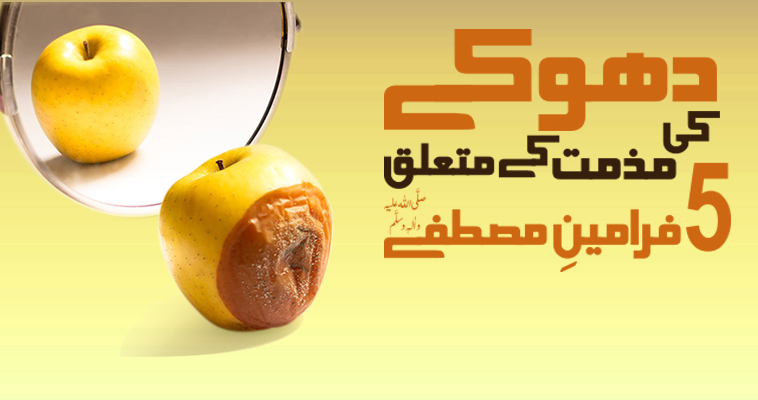
دھوکے کی تعریف: نفس کا اس پر ٹھہر جانا، جو خواہش نفس کے مطابق ہواور شیطانی شبہات اور فریب کے باعث طبیعت اس طرف مائل ہو، دھوکا کہلاتا ہے۔
کھوئی ہوئی چیز وہیں سے مل جاتی ہے، جہاں وہ گمی تھی، سوائے اعتبار(اعتماد)کے، کیونکہ جس شخص کا اعتبار ایک مرتبہ ختم ہوجائے، دوبارہ مشکل ہی سے قائم ہوتا ہے، اعتبارختم ہونے میں اہم کردار دھو کے کا بھی ہے، جب ہم کسی سے جان بوجھ کر غلط بیانی کریں گے یاگھٹیا چیز کوعمدہ بول کر اسے بے وقوف بنانےکی کوشش کریں گے تو حقیقت سامنے آنے پر وہ دوبارہ کبھی بھی ہم پر بھروسا کرنے کے لئے تیار نہیں ہوگا۔
فی زمانہ جن دوستوں، گھرانوں، تاجروں وغیرہ میں اعتبارکارشتہ مضبوط ہے، وہ سکھی اور جنہیں کسی نے دهوکادیا، وہ دُکھی دکھائی دیتے ہیں، دھوکا دینے والے سے اللہ پاک اور حضور علیہ الصلوة والسلام نے ناپسندیدگی کا اظہار کیا ہے۔
فرامینِ مصطفیٰ:
1۔ مَنْ غَشَّنَا فَلَیْسَ مِنَّا۔جس نے ہمارے ساتھ دھوکا کیا، وہ ہم میں سے نہیں۔(مسلم، ص45، حدیث 101)علا مہ عبدالرؤف مناوی رحمۃ اللہ علیہ لکھتے ہیں:کسی چیز کی ( اصلی ) حالت کو پو شده رکھنادھوکا ہے۔(فيض القدير، ج 4، ص 240، تحت الحديث 8879)
2۔ مؤمن ایک دوسرے کے لئے خیرخواہ ہیں اور ایک دوسرے سے محبت کرتے ہیں، اگرچہ ان کے گھر اور بدن دور ہوں اور فاسق لوگ ایک دوسرے کو دھوکا دینے والے اور خیانت کرنے والے ہیں، اگرچہ ان کے گھر اور بدن قریب ہی ہوں۔(الترغيب والترهيب، کتاب البیوع، الترہيب من الغش۔۔الخ، الحديث 2750 ، ج 2 ص 368 )
3۔ جس نے کسی مسلمان کو نقصان پہنچایا، اسے فریب(دهوکا) دیا تو وہ ملعون(لعنت کیا گیا)ہے۔(ترمذی، 378/3،حدیث 1948)
4۔ دھوکا دینے والاجنت میں داخل نہ ہو گا۔(المسندلامام احمدبن حنبل، مسندابی بکر الصدیق، الحدیث 32، ج 1، ص 27 )
اس حدیث مبارکہ میں جنت میں داخل نہ ہونے سے مراد ابتداء میں داخل ہونا ہے۔
5۔ جس نے ملاوٹ کی، وہ ہم میں سے نہیں اور مکر اور دھوکا دینے والا جہنم میں ہے۔(المعجم الکبیر، ج5، ص833، ح8831)
دھو کا دینے والوں کو یاد رکھنا چاہئے کہ ایک دن وہ بھی آئے گا، جب انہیں دنیا سے رخصت ہونے کے بعد ہی کرنی کا پھل بھگتنا ہوگا، چنانچہ حسابِ آخرت سے بچنے کے لئے یہیں دنیامیں سچی توبہ کرکے اپنا حساب بے باک کر لیں کہ جس جس کی رقم ہتھیائی ہے، اس کو واپس کریں یا معاف کروالیں، اگر وہ زندہ ہو تو اس کے وارثوں کو ادائیگی کریں یامعاف کروا لیں۔
اللہ کریم ہمیں دھوکا دینے اور دھوکا کھانے سے بچائے۔اللهم آمین
دھوکے کی مذمت پر 5 فرامینِ مصطفےٰ از ام حسان مدنیہ، کراچی
Tue, 18 Oct , 2022
1 year ago
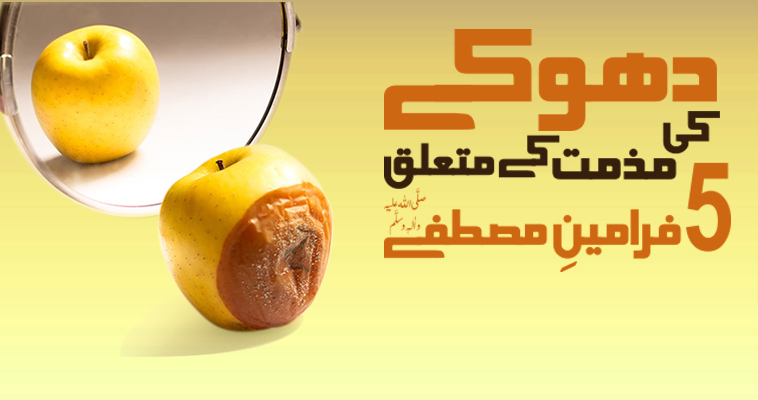
الحمدللہ باحسانہ ہم مسلمان ہیں اور مسلمان کا ہر کام اس کے ربّ تعالیٰ اور محمد مصطفی ﷺ کے حکم کے مطابق ہونا چاہئے، آج علمِ دین سے دوری کے باعث دھوکا دہی بہت عام ہو چکی ہے، ہر شخص بس کسی نہ کسی طرح دوسرے کو دھوکا دے کر نقصان پہنچانے میں منہمک (مشغول) نظر آتا ہے، یہ بہت برا فعل ہے، اس کی قرآن و حدیث میں مذمت بیان کی گئی ہے، جیساکہ سورۃ نحل پارہ 14 آیت نمبر59 میں ارشاد فرمایا:
اَفَاَمِنَ الَّذِيْنَ مَكَرُوا السَّيِّاٰتِ اَنْ يَّخْسِفَ اللّٰهُ بِهِمُ الْاَرْضَ اَوْ يَاْتِيَهُمُ الْعَذَابُ مِنْ حَيْثُ لَا يَشْعُرُوْنَۙ0(پ 14، النحل:45)تو کیا جو لوگ برے مکر کرتے ہیں اس سے نہیں ڈرتے کہ اللہ انہیں زمین میں دھنسا دے گا یا انہیں وہاں سے عذاب آئے، جہاں سے انہیں خبر نہ ہو۔(ظاہری گناہوں کی معلومات، صفحہ94)
تعریف:دھوکا کی تعریف یہ ہے کہ برائی کو دل میں چھپا کر اچھائی ظاہر کرنا، ہمارے معاشرے میں پائی جانے والی دھوکا کی چند مثالیں پیش کی جاتی ہیں۔
کسی چیز کا عیب چھپا کر اس کو بیچنا، اچھی چیز بتا کر نقل دینا، غلط بیانی کرکے کسی کا مال لے لینا، صحیح چیز کے ساتھ خراب بھی ڈال دینا۔(فرض علوم سیکھئے، صفحہ 717)
حکم: یاد رکھئے! دھوکا بازی اور دغابازی کرنا قطعاً حرام، گناہِ کبیرہ اور جہنم میں لے جانے والا کام ہے۔
اس کی مذمت و حرمت کے بارے میں چند حدیثیں بڑی ہی رقت خیز و عبرت آموز ہیں۔
احادیث طیبہ:
1۔ ملعون(لعنت کیا گیا) ہے وہ شخص، جس نے کسی مؤمن کو نقصان پہنچایا یا دھوکا دیا۔ (فرض علوم سیکھئے، صفحہ 718)
2۔ جو کسی مسلمان کو ضرر(نقصان) پہنچائے، اللہ تعالیٰ اس کو ضرور ضرر یعنی نقصان پہنچائے گا اور جو مسلمانوں کو مشقت میں ڈالے گا، اللہ پاک اس کو مشقت میں ڈال دے گا ۔(جہنم کے خطرات، صفحہ 115، مکر اور دھوکا بازی)
3۔ جو کسی مسلمان کو دھوکا دے یا نقصان پہنچائے، وہ ہم میں سے نہیں۔
اللہ اکبر!اس حدیث مبارکہ کو سن کر اس سے ہمیں جلد سے جلد چھٹکارا حاصل کرنا چاہئے کہ ہمارے پیارے آقا ﷺ نے فرما دیا کہ جو شخص کسی بھی مسلمان کو کسی بھی انداز میں دھوکا دیتا ہے، تو اس کے لئے یہ خبر دے دی کہ وہ ہم میں سے نہیں، یعنی وہ ہمارے طریقہ پر نہیں۔
4۔ تین شخص جنت میں داخل نہیں ہوں گے،٭دھوکاباز، ٭احسان جتانے والا، ٭بخیل۔(جہنم کے خطرات، صفحہ 116)
5۔ جو ہمارے ساتھ دھوکا بازی کرے گا، وہ ہم میں سے نہیں اور مکرو دھوکا بازی جہنم میں ہے۔(جہنم کے خطرات، ح3،صفحہ 115)
آئیے نیت کر لیں، آج کے بعد کسی کو اپنی ذات سے دھوکا نہیں دیں گے، اگر ہم کسی کو فائدہ نہیں پہنچا سکتے تو نقصان بھی نہیں پہنچائیں گے، اپنے پیارے آقا ﷺ کی امت کو اپنی ذات سے فائدہ پہنچائیں گے۔
کاش!ہم اس موم بتی کی طرح ہوجائیں، جو خود کو پگھلتی رہتی ہے، مگر دوسروں کو روشنی دے کر فائدہ دیتی ہے۔
اللہ ہمیں شریعت کے احکام پر عمل کی توفیق عطا فرمائے۔آمین
دھوکے کی مذمت پر 5 فرامینِ مصطفےٰ از ام بنت عبد الحکیم، جتوئی
Tue, 18 Oct , 2022
1 year ago
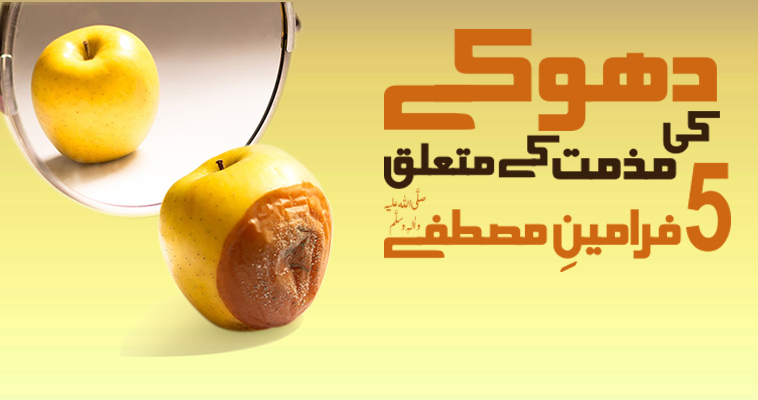
تمہیدی الفاظ: دینِ اسلام بہت ہی پیارا دین ہے اور یہ اس قدر تیزی سے پھیل رہا ہے کہ ہمیں گھر بیٹھے ہی علمِ دین کا خزانہ حاصل ہو جاتا ہے، دین کی اتنی اشاعت کے باوجود بھی معاشرے میں پائی جانے والی برائیاں بھی دن بدن بڑھتی جا رہی ہیں، ان قابلِ مذمت برائیوں میں سے ایک برائی دھوکا بھی ہے، جس کی وجہ سے مسلمانوں میں لڑائی جھگڑے عام ہیں، دنیا کی دولت کمانے کی دھن میں دھوکا اور اس طرح کے دوسرے ذرائع کا سہارا لیا جا رہا ہے، علمِ دین سے دوری کی بنا پر لوگ یہ جاننے سے قاصر ہوتے ہیں کہ ہمارا ایسا کرنا دھوکا دینا ہے؟ تو آئیے سب سے پہلے ہم دھوکا کے بارے میں جاننے کی کوشش کرتی ہیں۔
دھو کے کی تعریف اور مثالیں: برائی کو دل میں چھپا کر اچھائی ظاہر کرنا دھوکا ہے۔(ظاہری گناہوں کی معلومات، صفحہ 94) کسی چیز کا عیب چھپا کر اس کو بیچ دینا، اصل بتا کر نقل دے دینا وغیرہ یہ سب دھوکا ہے، جو کہ حرام اور گناہِ کبیرہ ہے، جس کی سزا جہنم کا عذابِ عظیم ہے۔
دھوکے کی مذمت پر پانچ فرامینِ مصطفی ﷺ:
1۔ملعون ہے وہ شخص، جس نے کسی مسلمان کو نقصان پہنچایا یا دھوکا دیا۔
2۔ جو دھوکا دے، وہ ہم میں سے نہیں۔
3۔ عقلمندوں کے کھانے پینے اور لباس کی بھی کیا بات ہے، انہیں جاہلوں کی شب بیداری اور عبادت و محبت مشقت کیسے دھوکا دے سکتی ہے؟ صاحبِ تقویٰ اور یقین رکھنے والے کا ذرا برابر عمل دھوکے میں مبتلا لوگوں کے زمین بھر کے عمل سے افضل ہے۔
4۔ عقلمند وہ ہے، جو اپنے نفس کو فرمانبردار بنائے اور موت کے بعد کام آنے والے عمل کرے اور بے وقوف وہ ہے، جو خواہشِ نفس کی پیروی کرے، پھر بھی اللہ عزوجل سے امید رکھے۔(احیاء العلوم، جلد سوم، صفحہ 1209)
5۔میری امت کے دو قسم کے لوگوں کو میری شفاعت نہ پہنچے گی،٭ظالم و دھوکے باز بادشاہ، ٭دین میں حد سے بڑھنے والا۔(76 کبیرہ گناہ، ص61)
دین میں حد سے بڑھنے سے مراد امورِ دینیہ میں حد سے تجاوز کرنا اور پیچیدہ ارشاد سے متعلق بحث کرنا، نیز ان پیچیدہ امور کی علتوں کو ظاہر کرنے کی کوشش کرنا ہے، آپ ﷺ نے ان کے خلاف شہادت دی اور ان سے بیزاری ظاہر فرمائی۔
دھوکے سے بچنے کے لئے ضروری ہے کہ اس کے دنیوی و اخروی نقصانات کو پیشِ نظر رکھے کہ لوگ دھوکے باز سے دور بھاگتے اور اس سے خرید و فروخت اور دیگر معاملات کرنا پسند نہیں کرتے، مزید یہ کہ اس میں جہنم کی حقداری بھی ہے، قناعت اختیار کیجئے، تاکہ مال و دولت کی محبت دور ہو، دھوکا اور اس طرح کے دیگر گناہوں سے بچنے کے لئے ضروری ہے کہ دینی ماحول سے جُڑے رہیں، تاکہ گناہوں سے بچنے کا ذہن ملے۔
دھوکے کی مذمت پر 5 فرامینِ مصطفےٰ از بنت منظور احمد، رحیم یار خان
Tue, 18 Oct , 2022
1 year ago
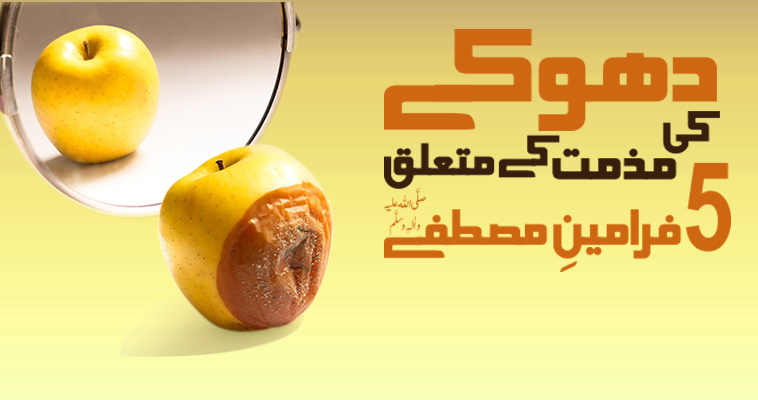
تعریف:دھوکا یہ ہے کہ کوئی شخص کسی چیز کو ظاہر کرے اور اس کے خلاف کو چھپائے یا کوئی بات کہے اور اس کے خلاف کو چھپائے، دھوکا کہلاتا ہے ۔(غریب الحدیث للحربی:685/2)
معاشرے میں دھوکے کی مثال:کسی مسلمان سے کہنا کچھ اور، اور کرنا کچھ اور، یہ بھی دھوکے میں شامل ہوتا ہے اور کچھ لوگ اللہ کے دین میں غلط بیانی کرتے ہیں۔
دھوکے کی مذمت کے متعلق تمہید:اللہ تعالیٰ نے قرآن مجید میں ارشاد فرمایا:زمین میں بڑائی چاہئے اور برا مکر وہ فریب کرنے کی وجہ سے اور برا مکر وہ فریب اپنے چلنے والے پر ہی پڑتا ہے، تو وہ پہلے لوگوں کے دستور کا انتظار کر رہے ہیں تو تم ہرگز اللہ کے دستور کے لیے تبدیلی نہیں پاؤ گے اور ہرگز اللہ کے قانون کے لئے تبدیلی نہیں پاؤ گے اور ہرگز اللہ کے قانون کے لئے ٹالنا نہ پاؤ گے۔(پ 22، سورہ فاطر، آیت نمبر 43 ،ترجمہ کنزالایمان)
احادیث:
1: جس نے ہم سے دھوکا کیا، وہ ہم میں سے نہیں۔
2 : دھوکا کرنے والا جہنم میں ہے۔
3 : جس نے کسی مسلمان سے دھوکا کیا، وہ ملعون ہے۔( حدیث1945 ،ترمذی)
4: دھوکا دینے والا جنت میں داخل نہ ہو گا۔(تعلیماتِ قرآن،حصہ 3)
5: وہ شخص ہمارے گروہ میں سے نہیں ہے، جس نے کسی مسلمان کو دھوکا دیا۔(تعلیمات قرآن،حصہ 3)
دھوکے سے بچنے کا درس: دھوکا دینا بہت بڑا گناہ ہے، جو شخص دوسروں کو دھوکا دیتا ہے، وہ لوگوں میں اپنا اعتماد کھو بیٹھتا ہے، ہمیں چاہئے کہ ہمیں دوسروں کو دھوکا دینے سے بچنا چاہئے اور دوسروں کو دھوکا دینے سے منع کرنا چاہئے، دھوکا گناہ ہے اور گناہ اگر ہمارے سامنے ہو رہا ہو تو ہمیں منع کرنا چاہئے اگر ہم روکنے پر قادر ہیں، ورنہ ہم بھی گنہگار ہوں گے۔
اللہ ہم سب کو دھوکا دینے سے بچائے۔آمین
دھوکے کی مذمت پر 5 فرامینِ مصطفےٰ از ام بلال رضا، سیالکوٹ
Tue, 18 Oct , 2022
1 year ago
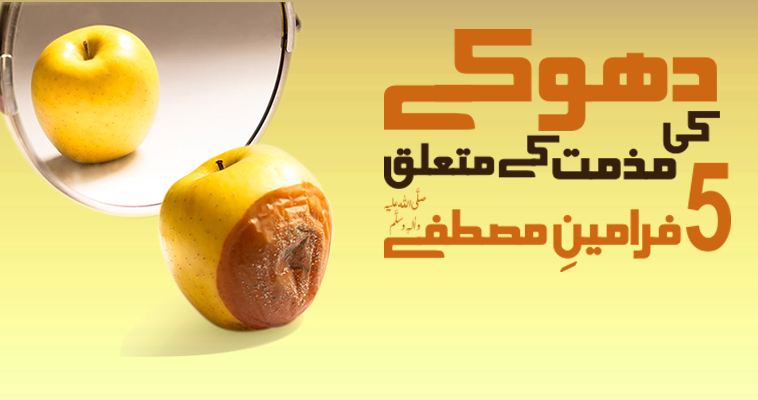
دھوکے کی تعریف: کسی چیز کے عیب کو چھپانا اور خوبی کو بڑھا چڑھا کر بیان کرنا ۔ مسلمانوں کے ساتھ دھوکا بازی اور دغابازی کرنا قطعا حرام اور گناہ کبیرہ ہے جس کی سزا جہنم کا عذاب ہے۔
دھوکے کی ممانعت اور حرمت کے بارے میں قرآنی آیات اور حدیث: اللہ پاک قرآن پاک میں ارشاد فرماتا ہے پارہ 9 سورہ انفال آیت نمبر 27۔ ترجمہ کنزالایمان اے ایمان والو اللہ اور رسول سے دغا نہ کرو اور نہ اپنی امانتوں میں دانستہ خیانت ۔
فرامینِ مصطفیٰ:
1۔من غشنا فلیس منا یعنی جو دھوکا دہی کرے وہ ہم میں سے نہیں ہے( جامع ترمذی )۔
2۔جو کسی مومن کو ضرر پہنچائے یا اس سے مکر اور دھوکا بازی کرے وہ ملعون ہے(سنن ترمذی )
3۔تین شخص جنت میں داخل نہیں ہوں گے: نمبر 1دھوکا باز نمبر2 احسان جتانے والا نمبر 3 بخیل (کنزل العمال کتاب الاخلاق )
حضرت عبد اللہ بن عباس رضی اللہ تعالیٰ عنہ کی خدمت میں کچھ لوگ حاضر ہوئے اور عرض کی کے ہم سفر حج پر نکلے ہوئے ہیں مقام صفاح پر ہمارے قافلے کا ایک آدمی فوت ہوگیا ہے ہم نے اس کے لئے جب قبر کھودی تو ایک بہت بڑا کالا سانپ بیٹھا نظر آیا جس نے قبر کو بھر رکھا تھا اسے چھوڑ کر دوسری قبر کھودی تو اس میں بھی وہی سانپ نظر آیا آپ رضی اللہ تعالیٰ عنہ کی خدمت میں اس گھمبیر مسئلے کے حل کے لیے حاضر ہوئے حضرت عبداللہ بن عباس رضی اللہ تعالیٰ عنہ نے فرمایا یہ اس کی خیانت کی سزا ہے جس کا وہ مرتکب ہوا کرتا تھا اسے ان دونوں میں سے کسی ایک قبر میں دفن کر دو خدا کی قسم اگر اس دنیا کی ساری زمین بھی خود ڈالو گے تب بھی ہر جگہ یہی صورتحال ہوگی بالآخر لوگوں نے اسے ایک قبر میں دفنا دیا واپس آ کر اس کا سامان اس کے گھر والوں کو دے دیا اور اس کی بیوہ سے اس کے بارے میں پوچھا تو اس نے بتایا کہ یہ کھانا بیچتا تھا اور اس میں خیانت کرتا تھا اس طرح کے اس میں سے اپنے گھر کے لئے کچھ نکال لیتا پھر کمی پوری کرنے کے لیے اس میں اتنی ہی ملاوٹ کر دیتا تھا۔
دھوکے کے اسباب اور بچنے کے علاج:
سبب نمبر 1 جس طرح اچھی نیت اخلاق و کردار کے لیے شفا اور اکسیر کا درجہ رکھتی ہے اسی طرح بدنیتی کا زہر بندے کے اعمال کو تباہ و برباد کر دیتا ہے اس کا علاج یہ ہے کہ بندہ اپنی نیت کو درست رکھے اور اپنا یہ ذہن بنائے اللہ تعالیٰ میری حسن نیت اور ایمانداری کی بدولت دنیا آخرت میں کامیابی عطا فرمانے پر قادر ہے لہٰذا دھوکا دہی کر کے دنیا آخرت میں نقصان کرنے کا کیا فائدہ!
سبب نمبر 2 دھوکا دینےکی بری عادت اس کا علاج یہ ہے کہ بندہ اپنے ذہن میں دھوکا دہی کے نقصانات کو پیش نظر رکھیں کہ دھوکا دینا ایک نہایت ہی قبیح اور برا عمل ہے دھوکا دینے والے سے رسول اللہ ﷺ نے براءت کا اظہار فرمایا ہے دھوکا دینا مومن کی صفت نہیں دھوکا دینے سے جہاں وقار مجروح ہوتا ہے وہی لوگوں کا اعتماد بھی ختم ہوتا ہے لہٰذا احترام مسلم کا ہر دم خیال رکھیں اور ذہن بنائے کے وقتی نفع حاصل کرنے کے لیے دائمی نقصان مول لینا یقیناً عقلمندی نہیں ہے ۔
سبب نمبر 3 تو کل علی اللہ کی کمی ہے بندہ اپنے کمزور اعتقاد کی بنا پر یہ سمجھتا ہے کہ خیانت کا راستہ اختیار کرنے میں ہی میری کامیابی ہے اس کا علاج یہ ہے کہ بندہ اللہ عزوجل پر کامل بھروسہ رکھیں اور یہ بھی ذہن بنائے کے دنیا میں جو بھی رستہ اللہ کی نافرمانی کا سبب بنتا ہو اس پر چل کر مجھے کبھی بھی کامیابی نہیں مل سکتی لہٰذا میں دھوکا دہی کے راستے کو چھوڑ کر ایمانداری والا رستہ اختیار کروں گی اس کا بہترین علاج یہ بھی ہے کہ بندہ نیک دیانت دار اور خوف خدا رکھنے والوں کی صحبت اختیار کرے تاکہ اس مہلک مرض کے ساتھ ساتھ دیگر اخلاقی برائیوں سے بھی اپنے آپ کو بچا سکے۔ صلو علی الحبیب
دھوکے کی مذمت پر 5 فرامینِ مصطفےٰ از بنت اللہ بخش، بلوچستان
Tue, 18 Oct , 2022
1 year ago
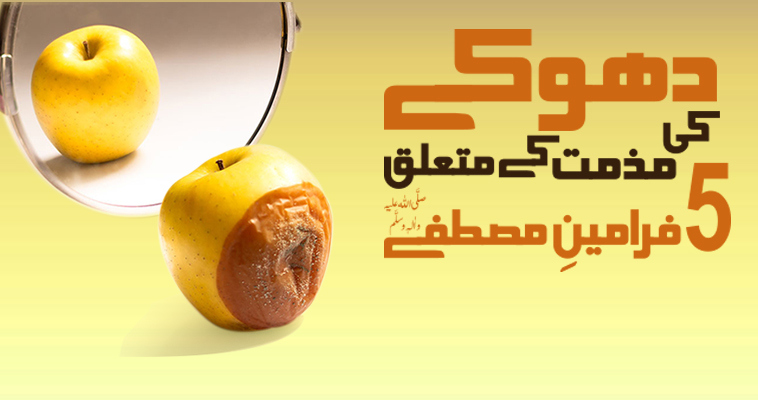
دھوکا دہی جو ایک نہایت مذموم اور بری صفت ہے، مسلمانوں کے ساتھ مکر یعنی دھوکا بازی قطعاً حرام ہے اور گناہِ کبیرہ ہے، جس کی سزا جہنم کا عذاب ہے۔(جہنم کے خطرات، ص171)
دھوکے کی چند مثالیں:
کسی چیز کا عیب چھپا کر اس کو بیچنا،
اچھی چیز دکھا کر نقل دے دینا،
غلط بیانی کرکے کسی سے مال بٹورنا، جیسا کہ پیشہ ور بھکاریوں کا طریقہ ہے۔(ظاہری گناہوں کی معلومات، صفحہ 94)
دھو کہ دہی کی مذمت احادیث مبارکہ نیز آیت کریمہ میں بھی فرمائی گئی، چنانچہ پارہ 14، سورہ نحل کی آیت نمبر 45 میں ارشاد ہوتا ہے:
ترجمہ کنزالایمان:تو کیا جو لوگ برے مکر کرتے ہیں اس سے نہیں ڈرتے کہ اللہ انہیں زمین میں دھنسا دے گا یا انہیں وہاں سے عذاب آئے، جہاں سے انہیں خبر نہ ہو۔
دھوکا دہی کی مذمت سے متعلق احادیث مبارکہ:
1۔ مَنْ غَشَّنَا فَلَیْسَ مِنَّا۔وہ ہم میں سے نہیں، جو دھوکا دے۔(ملفوظاتِ اعلی حضرت، صفحہ 476)
2۔ ملعون(لعنت کیا گیا) ہے وہ شخص، جس نے کسی مؤمن کو نقصان پہنچایا یا دھوکا دیا۔(ترمذی کتاب البر والصلۃ)
3۔عقلمندوں کے کھانے پینے اور سونے کی بھی کیا بات ہے، انہیں جاہلوں کی شب بیداری اور عبادت میں محنت و مشقت کیسے دھوکا دے سکتی ہے، صاحبِ تقویٰ اور یقین رکھنے والے کا ذرہ برابر عمل دھوکے میں مبتلا لوگوں کے زمین بھر کے عمل سے افضل ہے ۔(احیاء العلوم، جلد 3، صفحہ 1124)
4۔عقلمند وہ ہے، جو اپنے نفس کو فرمانبردار بنائے اور موت کے بعد کام آنے والے عمل کرے اور بے وقوف وہ ہے، جو خواہشِ نفس کی پیروی کرے، پھر بھی اللہ سے امید رکھے۔(سنن ترمذی، کتاب صفۃ القیامۃ)
5۔ جو کسی مؤمن کو ضرر پہنچائے یا اس کے ساتھ دھوکا کرے، وہ ملعون ہے۔(باطنی بیماریوں کی معلومات، صفحہ 166)
اللہ پاک ہمیں دھوکا سے محفوظ فرمائے۔آمین
دھوکے کی مذمت پر 5 فرامینِ مصطفےٰ از ام بنت جاوید احمد، مورو سندھ
Tue, 18 Oct , 2022
1 year ago
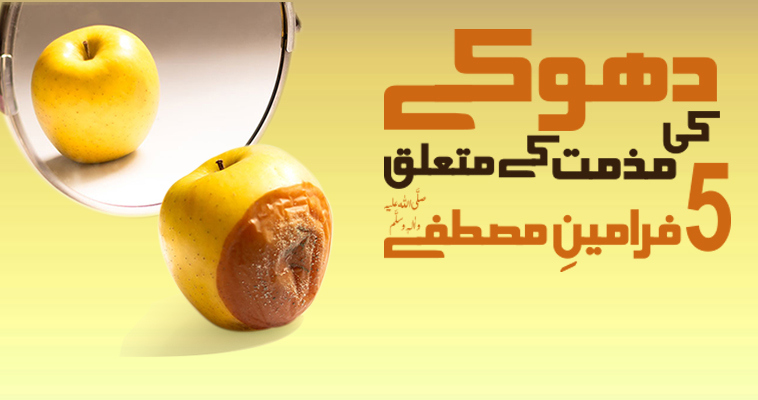
تعريف:وہ فعل جس میں اس فعل کے کرنے والے کا با طنی ارادہ اس کے ظاہر کے خلاف ہو، مکر یعنی دھوکا کہلاتا ہے۔
دھوکا کی دوسری تعریف یہ ہے کہ برائی کو چھپا کر اچھائی ظا ہر کرنا ۔
دھوکا دہی کی چند مثالیں:
٭کسی چیز کا عیب چھپا کر اس کو بیچنا۔
٭اصل بتا کر نقل دے دینا۔
دھوکا کے متعلق قرآن مجید پاره 14، سوره النحل، آیت نمبر 45 پر ارشاد ہے:
ترجمہ کنزالایمان:تو کیا جو لوگ برے مکر کرتے ہیں اس سے نہیں ڈرتے کہ اللہ انہیں زمین میں دھنسا دے گا یا انہیں وہاں سے عذاب آئے، جہاں سے انہیں خبر نہ ہو۔
حکم:مسلمانوں کے ساتھ مکریعنی دھوکا بازی قطعاً حرام اور گناہِ کبیرہ ہے، جس کی سزا جہنم کا عذاب عظیم ہے، مکرو فریب اور ڈرا دھمکا کر کسی سے مال لینا قطعی حرام ہے۔
احادیث مبارکہ:
1۔ ملعون ہے وہ شخص، جس نے کسی مؤمن کو نقصان پہنچایا یا دھوکا دیا۔(ترمذی ، کتاب البر والصلة ، باب ماجاء فی الخیانۃ والغش، ص 475،حديث 1941)
2۔ وہ ہم میں سے نہیں، جو دھوکا دے۔(مسلم، کتاب الایمان، باب قول النبي، من غشنا فليس منا، ص57، ح 164 (101)
3۔ جو کسی مؤمن کو ضرر پہنچائے یا اس کے ساتھ مکر اور دھوکا بازی کرے، وہ ملعون ہے۔(ترمذی ، کتاب البر والصلة ، باب ماجاء فی الخیانۃ والغش، ج 3، ص378،حديث 1948)
4۔ دھوکا دینے والا جنت میں داخل نہ ہوگا۔(المسند الامام احمد بن حنبل، مسند ابي بكر الصديق، حديث 32، ج 1، ص 27)
5۔ جس نے ملاوٹ کی، وہ ہم میں سے نہیں۔(جامع الترمذی، ابواب البیوع، باب ما جاء في كراہیۃ، حدیث 1315، ص 1784)
مکر یعنی دھوکے کے اسباب، علاج:
1۔مکر کا پہلا اور سب سے بڑا سبب حرص ہے کہ بندہ مال و دولت یا کسی دنیوی شے کے حصول کے سبب مکر و فریب کرتا ہے۔
اس کا علاج یہ ہے کہ بندہ حبِ مال یعنی(مال سے محبت ) کی مذمت پر غور کرے، اور یہ ذہن بنائے کہ یہ مال فانی ہے اور فانی یعنی (ختم ہونے والی)چیز کےلئے کسی کو دھوکا دے کر ایک گناه اپنے سر لینا عقل مندی نہیں، بلکہ حماقت ہے۔
2۔دوسرا سبب جہالت ہے، اس کا علاج یہ ہے کہ بنده مکر کے متعلق شرعی احکام، اس کے دنیوی و اخروی نقصانات سیکھے اوراس سے بچنے کی کوشش کرے۔
3۔بری صحبت، علاج:عاشقانِ رسول کی صحبت اختیار کیجئے اور برے لوگوں سے ہمیشہ دور رہے۔
دھوکے کی مذمت پر 5 فرامینِ مصطفےٰ از ام سلمہ مدنیہ، ملیر
Tue, 18 Oct , 2022
1 year ago
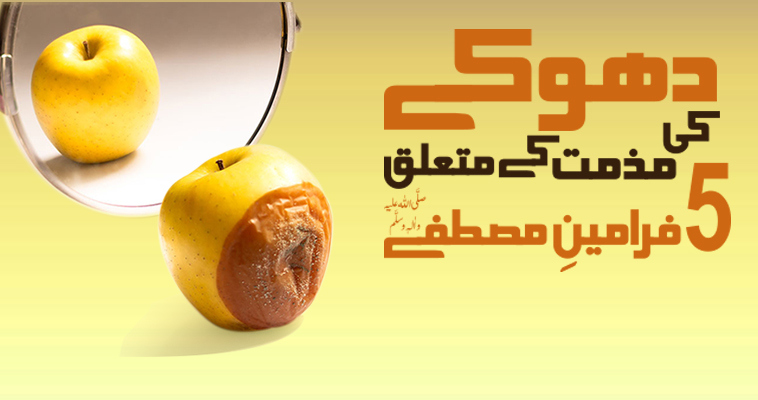
دینِ اسلام ایک مکمل ضابطۂ حیات ہے جو تمام انسانیت کے حقوق کا محافظ ہے۔ یہی وجہ ہے کہ اس میں ہر ایسے کام کو ممنوع و ناجائز قرار دیا گیا ہے جس سے کسی کو تکلیف پہنچے یا اس کی حق تلفی ہو۔ انہیں میں سے ایک دھوکا بھی ہے۔ دھوکا ایک ایسا مذموم فعل ہے کہ دوسروں کو دھوکا دینے والا بھی خود دھوکا کھانا پسند نہیں کرتا۔
دھوکے کی تعریف:دھوکا یہ ہے کہ کوئی شخص کسی چیز کو ظاہر کرے اور اس کے خلاف (یعنی حقیقت)کو چھپائے یا کوئی بات کہے اور اس کے خلاف (یعنی حقیقی بات)کو چھپائے۔ (غریب الحدیث للحربی، 2/ 658)فی زمانہ ہمارے معاشرے میں دھوکا بہت زیادہ پایا جاتا ہے۔ کہیں خرید و فروخت میں لوگوں کے ساتھ دھوکا کرنا رائج ہے تو کہیں موبائل فون وغیرہ کے ذریعے نت نئے طریقوں سے دھوکا دینا بالکل عام ہے، حالانکہ یہ سب نہ تو مذہبی اعتبار سے درست ہے اور نہ ہی اخلاقی لحاظ سے۔
اللہ پاک کے آخری نبی، محمدِ عربی ﷺ نے مسلمانوں کو دھوکا دینے سے بچنے کی بطورِ خاص تاکید فرمائی اور دھوکا دینے والوں کے بارے میں ارشاد فرمایا کہ وہ ہم میں سے نہیں۔
دھوکے کی مذمت سے متعلق احادیث مبارکہ:
1_حضور سید المرسلین، خاتم النبیین ﷺ غلہ کے ایک ڈھیر پر گزرے تو اپنا ہاتھ شریف اس میں ڈال دیا۔ آپ ﷺ کی انگلیوں نے اس میں تری پائی تو فرمایا: اے غلہ والے یہ کیا؟ عرض کی: یا رسول اللہ ﷺ ! اس پر بارش پڑ گئی۔ فرمایا: تو گیلے غلہ کو تو نے ڈھیر کے اُوپر کیوں نہ ڈالا تاکہ اسے لوگ دیکھ لیتے، جو دھوکا دے وہ ہم میں سے نہیں۔ (صحیح مسلم ، کتاب الایمان، باب قول النبی ﷺ من غش فلیس منا، الحدیث 102، ص 65)
2_مومن دھوکا کھا جانے والا ہوتا ہے (یعنی اپنے کرم کی وجہ سے دھوکا کھا جاتا ہے نہ کہ بے عقلی سے) اور فاجر دھوکا دینے والا لئیم یعنی بدخلق ہوتا ہے۔ (سنن الترمذي، کتاب البر والصلۃ، باب ماجاء في البخل،الحدیث: 1971 ،ج 3 ،ص 388
3_وہ شخص ہمارے گروہ میں سے نہیں ہے جو مسلمان کو دھوکا دے یا ضرر پہنچائے یا اس کے ساتھ مکر کرے۔ (کنزالعمال، کتاب الاخلاق، قسم الاقوال، حرف المیم، المکر والخدیعۃ، 2 / 218، الحدیث: 7822، الجزء الثالث)
4_سازش کرنے والے اور دھوکا دینے والے جہنم میں ہیں۔ (مسند الفردوس، باب المیم، 4 / 217، الحدیث: 6658)
5_ایمان والے ایک دوسرے کے خیرخواہ اور باہم محبت کرنے والے ہوتے ہیں اگرچہ ان کے گھر اور اَجسام جدا جدا ہوں اور فاجرلوگ آپس میں ایک دوسرے کے ساتھ دھوکا اورخیانت کرنے والے ہوتے ہیں، اگرچہ ان کے گھر اور بدن اکھٹے ہوں۔ (الفردوس بماثورالخطاب، باب المیم، 4 / 189، الحدیث: 6584)
اللہ پاک ہمیں لوگوں کو دھوکا دینے سے بچائے۔ آمین بجاہ خاتم النبیین ﷺ
دھوکے کی مذمت پر 5 فرامینِ مصطفےٰ از ام غزالی، کراچی
Tue, 18 Oct , 2022
1 year ago
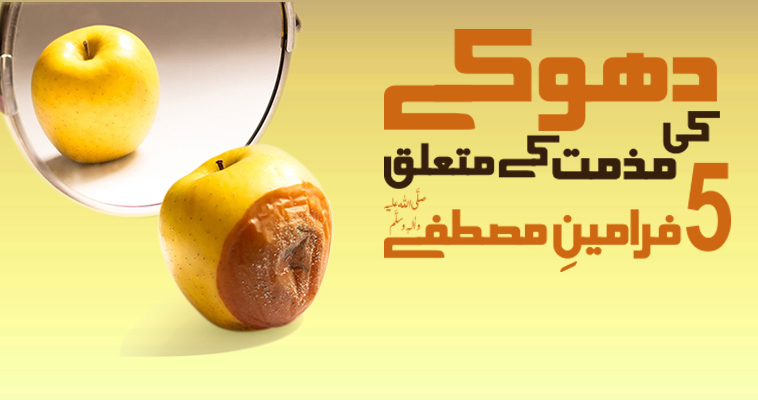
انسان کا سب سے بڑا دشمن شیطان ہے اور اس سے بھی بڑھ کر دشمن اس کا نفس ہے،آقا علیہ السلام نے فرمایا:یعنی تیرا سب سے بڑا دشمن تیرا نفس ہے کہ تیرے دونوں پہلوؤں کے درمیان ہے۔(تہذیب الآثار للطبری، الجزء 3، ص 160،حدیث919، جامع الاحادیث، قسم الاول حروف اللام ، الجزء 18، ص269، حدیث19377،نفس و شیطان کے دھوکے،مفتی محمد فیض احمد اویسی رضوی، ص 1)اس کے مکر و فریب اور دھوکے شیطان سے بھی زیادہ ہیں، اعلیٰ حضرت فرماتے ہیں:
رضا نفس دشمن ہے دم میں نہ آنا
کہاں تم نے دیکھے ہیں چند رانے والے
ان دونوں دشمنوں سے بچنا بڑا مشکل ہے، مگر کسی مرشدِ کامل کی نگاہِ کرم سے ان سے بچا جاسکتا ہے، ہمارے بزرگان نفس و شیطان کے دھوکے سے آشکار ہو جایا کرتے تھے،ان کی عاجزی پر ہماری جانیں قربان کہ حضرت سیّد ابو محمد مرتعش رحمۃ اللہ علیہ فرماتے ہیں:میں نے بہت حج کئے اور ان میں سے اکثر سفرِ حج کسی قسم کے سامان لئے بغیر کئے، پھر مجھ پر ظاہر ہوا کہ یہ سب تو میرے نفس کا دھوکا تھا، کیونکہ ایک مرتبہ میری ماں نے مجھ سے پانی کا گھڑا بھر کر لانے کا حکم دیا تو میرے نفس کو برا لگا۔
چنانچہ میں نے سمجھ لیا، سفر حج میں میرے نفس نے میری موافقت فقط اپنی لذت کے لئے کی اور مجھے دھوکے میں رکھا، کیونکہ اگر میرا نفس فناء ہو چکا ہوتا تو ماں کا کہنا ماننا میرے نفس کو دشوار محسوس نہ ہوتا۔(رسالہ قشیریہ ،ص 135، رسالہ معلوماتی پمفلٹس، ص 1)
اس حکایت میں عبرت کے نہایت مدنی پھول ہیں کہ نفس و شیطان کے دھوکے ہمیں ہر وقت جہنم کا ایندھن بنانے کی فکر میں ہیں، حبِ جاہ کی لذت ہلاکت کا باعث ہے، ہمیں اپنے بزرگانِ دین کی دینی سوچ اپنانے کی ضرورت ہے ۔
دھوکے کی تعریف:برائی کو دل میں چھپا کر اچھائی ظاہر کرنا دھوکا ہے۔(تفسیر نعیمی، پ1، البقرہ، تحت الآیۃ9،164/1، ظاہری گناہوں کی معلومات ، ص 94)
معاشرے میں پائی جانے والی دھوکے کی چند مثالیں: زندگی کے ہر ہر پہلو میں دھوکا دہی عام ہے، ہمارا معاشرہ ایسی بے شمار مثالوں سے بھرا ہوا ہے، آئیے چند مثالیں پڑھتے ہیں۔
1 : کسی چیز کا عیب چھپا کر اس کو بیچنا ۔
2 : اصل بتا کر نقل دے دینا۔
3 : غلط بیانی کرکے کسی کا مال بٹورنا۔
4 : سونا چاندی کے ساتھ کھوٹ ملا کر بیچنا۔5
5 : دودھ میں پانی ملانا۔
6 : تجارتی معاملات میں دھوکا دہی سے کام لینا وغیرہ،
یہ مثالیں ہمارے معاشرے میں اس قدر عام ہیں کہ ان کو گناہ تصور نہیں کیا جاتا ۔
دھوکا دہی کا حکم: مسلمانوں کے ساتھ مکر یعنی دھوکے بازی قطعاً حرام اور گناہ کبیرہ ہے، جس کی سزا جہنم کا عذابِ عظیم ہے۔ (جہنم کے خطرات ، ص 171 ملتقظاً، ظاہری گناہوں کی معلومات ، ص 95)
اللہ عزوجل قرآن کریم میں دھوکا دینے والوں کے متعلق فرماتا ہے:
ترجمہ کنزالایمان:تو کیا جو لوگ برے مکر کرتے ہیں اس سے نہیں ڈرتے کہ اللہ انہیں زمین میں دھنسا دے گا یا انہیں وہاں سے عذاب آئے، جہاں سے انہیں خبر نہ ہو۔
دھوکے کی مذمت پر 5 فرامینِ مصطفیٰ صلی اللہ علیہ وسلم:
1: وہ ہم میں سے نہیں، جو دھوکا دے۔(ظاہری گناہوں کی معلومات، ص 95)
2: ملعون( لعنت کیا گیا) ہے، وہ شخص جس نے کسی مؤمن کو نقصان پہنچایا یا دھوکا دیا۔(ترمذی، کتاب البر و الصلۃ ما جاء فی الجنانۃ و الغش، ص 475، حدیث1941، ظاہری گناہوں کی معلومات ،ص95)
3: مکر و فریب اور خیانت کرنے والا جہنم میں ہے۔(المستدرک کتاب الاھوال باب تحشر ھذہ الآیۃ علی ثلاثۃ احناف، حدیث8831،ج 5 ص: 833، تجارت میں ملاوٹ اور دھوکے کا انجام ،ص 15)
4: جس نے ہم پر اسلحہ اٹھایا، وہ ہم میں سے نہیں اور جس نے ہمیں دھوکا دیا، وہ ہم میں سے نہیں۔(صحیح مسلم، کتاب الایمان، باب قول النبی من غشا فلیس منا، حدیث283 ، ص695، تجارت میں ملاوٹ اور دھوکے کا انجام)
5:آقا علیہ السلام ایک شخص کے پاس سے گزرے، جو اناج بیچ رہا تھا، آپ نے اس سے پوچھا: اے غلے کے مالک! کیا بیچنے والا اناج اوپر والے اناج جیسا ہے؟ اس نے عرض کی:یا رسول اللہ ﷺ ہاں، ایسا ہی ہے تو آپ نے ارشاد فرمایا:جس نے مسلمانوں کو دھوکا دیا، وہ ہم میں سے نہیں۔(المعجم الکبیر، الحدیث921، ج18، ص359، تجارت میں ملاوٹ اور دھوکے کا انجام ،ص3)
اسباب و علاج:
1:مال جمع کرنے کا لالچ۔
2:بری صحبت۔
3:خیانت کرنے کی عادت۔
4:مسلمانوں کے لئے خیرخواہی کے جذبے کا نہ ہونا،
اگر قناعت اختیار کی جائے، مال و دولت کا لالچ دل سے نکال کر فکرِ آخرت لاحق ہو جائے تو انسان ہر ظاہری و باطنی بیماری سے بچ سکتا ہے۔
اللہ عزوجل نے ہمیں ایمان کی دولت سے نوازا ہے، تو ہمیں بھی اس کا شکر ادا کرتے ہوئے قناعت کی دولت اختیار کرنی چاہیئے،لالچ کو دل سے نکال کر اپنی آخرت سنوارنی چاہئے، ملاوٹ کرنے والا، دھوکا دینے والا اللہ عزوجل اور اس کے رسول ﷺ کی ناراضگی کا باعث ہے، مکار، دھوکے باز، ملاوٹ کرنے والے، باطل بیع کرنے والے اور فاسد تجارات کے ذریعے لوگوں کا مال کھانے والے غور کریں کہ آقا علیہ السلام نے فرمایا:کہ جس نے ہمیں دھوکا دیا، وہ ہم میں سے نہیں۔
اس سے معلوم ہوا کہ دھوکے کے معاملات اور اس کا انجام بہت خطرناک ہے،جس سے انسان کا ایمان داؤ پر لگ جاتا ہے، دنیا و آخرت برباد ہو سکتی ہے، دودھ میں پانی ملانے والے بھی ان احادیث مبارکہ سے عبرت حاصل کریں۔
اللہ عزوجل ہمیں سیدھی راہ کی طرف رہنمائی کرے، اگر اس بات کا احساس رہے گا کہ اسی کی طرف لوٹنا ہے تو انسان نفس و شیطان کے دھوکے سے بچ جائے گا۔
دھوکے کی مذمت پر 5 فرامینِ مصطفےٰ از ام ہلال ، سیالکوٹ
Tue, 18 Oct , 2022
1 year ago
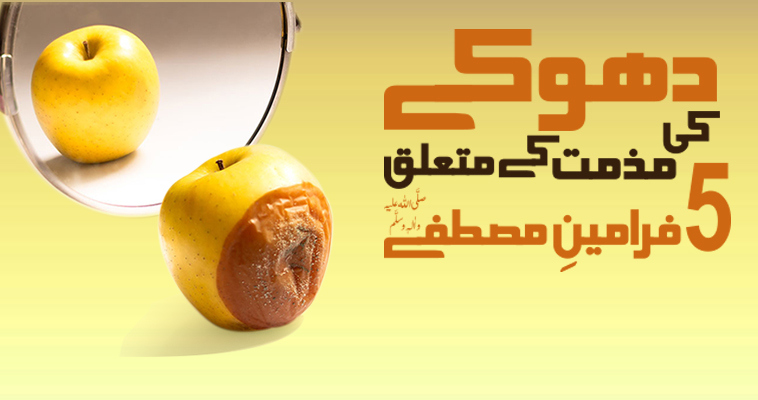
اولاً تو ہمیں اس بات کا علم ہونا چاہئے کہ دھوکا کہتے کس کو ہیں، اس بارے میں عبد الرؤف مناوی رحمۃ اللہ علیہ لکھتے ہیں:کہ کسی چیز کی اصل حالت کو پوشیدہ رکھنا دھوکا ہے۔(فیض القدیر، حدیث8879)
مثلاً کسی عیب دار چیز کو اس کا عیب چھپا کر بیچنا یا ملاوٹ والی چیز کو اصل اور خالص کہہ کر بیچنا وغیرہ، کھوئی ہوئی چیز تو وہاں سے مل جاتی ہے، جہاں وہ گُمی تھی، سوائے اعتبار کے، کیوں کہ جس کا اعتبار ایک مرتبہ ختم ہو جائے تو دوبارہ مشکل سے ہی قائم رہتا ہے۔
٭اعتبار ختم ہونے میں اہم کرداردھوکے کا بھی ہے کہ جب ہم کسی سے جان بوجھ کر غلط بیانی کریں گے، تو حقیقت سامنے آنے پر وہ دوبارہ کبھی بھی ہم پر بھروسہ کرنے کے لئے آمادہ نہیں ہوگا، اللہ عزوجل قرآن کریم میں ارشادفرماتاہے:
ترجمہ کنزالایمان:اور دنیا کی زندگی تو صرف دھوکے کا سامان ہے۔(پ 4، آل عمران:185)
دھوکا دینے والے سے اللہ کے محبوب ﷺ نے ناپسندیدگی کا اظہار کیا ہے، اس سے متعلق احادیث مبارکہ درج ذیل ہیں۔
1۔جس نے کسی مسلمان کو نقصان پہنچایا یا اسے فریب( دھوکا ) دیا تو وہ ملعون ہے۔(ترمذی شریف، حدیث 1948)
2۔ہر دھو کا دینے والے کے لئے قیامت کے دن ایک جھنڈا ہوگا، جس کے ذریعے وہ پہچانا جائے گا۔(بخاری شریف، حدیث6966)
3۔جس شخص کو اللہ کسی رعایا کا حکمران بنا دے اور وہ اس حال میں مرے کہ وہ اپنی رعایا کے ساتھ دھوکا دہی کرتا تھا تو اللہ عزوجل اس پر جنت کو حرام کر دیتا ہے۔(مسلم شریف، حدیث142)
4۔جو دھوکا دہی کرے گا، وہ مجھ سے(تعلق رکھنے والا) نہیں ہے۔(مسلم شریف، حدیث284)
5۔مؤمن ایک سوراخ سے دوبارہ نہیں کاٹا جاتا۔
شانِ نزول: اس حدیث مبارکہ کا شانِ نزول یہ ہے کہ ایک کافر شاعر جس کا نام ابو عزہ تھا، وہ حضور ﷺ اور مسلمانوں کی مخالفت میں سخت توہین آمیز اشعار کہا کرتا تھا، جنگِ بدر میں گرفتار ہو گیا، اس نے گذشتہ کی معافی مانگی اور آئندہ نہ کرنے کا عہد کیا تو اسے چھوڑ دیا گیا، پھر اسی حرکت میں مشغول ہوگیا، پھر جنگِ احد میں گرفتار ہوگیا، پھر اس نے معذرت کی تو صحابہ کرام نے اس کی رہائی کی سفارش کی، تب حضور ﷺ نے فرمایا:کہ مؤمن ایک سوراخ سے دوبار نہیں کاٹا جاتا۔
اور اسے رہائی نہ بخشی، یعنی جس شخص سے ایک بار دھوکا کھا لیا، دوبارہ اس کے دھوکے میں نہ آؤں، پھر اس کافر شاعر کو قتل کر دیا گیا۔(مراۃ المناجیح، جلد ششم، صفحہ 421)
دھوکا دینے والوں کو یاد رکھنا چاہئے کہ ایک دن وہ بھی آئے گا کہ جب دنیا سے رخصت ہونے کے بعد اپنی کرنی کا پھل بھگتنا ہو گا، چنانچہ حسابِ آخرت سے بچنے کے لئے دنیا ہی میں سچی توبہ کرلیں، جس کی رقم میں کمی وغیرہ کی تھی، اس کو واپس کر دیں یا معاف کروا لیں۔
اللہ عزوجل ہمیں دھوکا دینے اور دھوکا کھانے سے بچائے۔آمین
مزمل حسین ملتانی(درجہ خامسہ جامعۃ المدینہ اشاءت الاسلام ملتان پاکستان)
Tue, 18 Oct , 2022
1 year ago
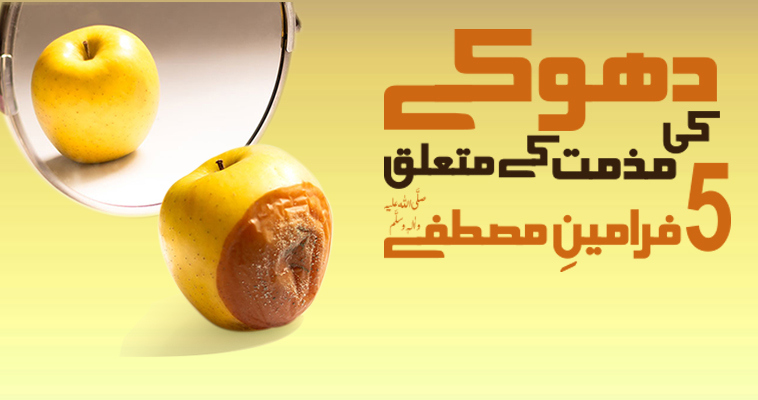
حقیقتِ حال سے بے خبر رکھ کر دوسرے کو غلط راستے پر ڈالنے کا نام دھوکا ہے۔ دنیا کی زندگی بھی ایک دھو کا ہے ہم بہت سی خواہشات لیے گھوم پھر رہے ہوتے ہیں حالانکہ ہمیں پتہ ہے کہ دنیا کی زندگی ایک دھوکا ہے اس کے سوا کچھ نہیں۔ اللہ پاک نے قراٰن مجید میں دھوکے سے متعلق ارشاد فرمایا : اِنَّ وَعْدَ اللّٰهِ حَقٌّ فَلَا تَغُرَّنَّكُمُ الْحَیٰوةُ الدُّنْیَاٙ ترجمۂ کنزُالعِرفان: بیشک اللہ کا وعدہ سچا ہے تو دنیا کی زندگی ہرگز تمہیں دھوکا نہ دے۔( پ 22، الفاطر :5)
دھوکے کی مختلف صورتیں: دھوکا دینا کئی طرح سے ہوتا ہے مثال کے طور پر (1) الله اور اس کے رسول کی پیروی نہ کرنا۔ (2)والدین اور عزیز و اقارب کو دھوکہ دینا۔(3) خود کو اور اپنے دوستوں کو دھوکہ دینا ۔اسلام نے ان تمام صورتوں سے منع کیا ہے پس ہم پر لازم ہے کہ ہم قراٰن و سنت پر عمل کر کے دونوں جہاں میں۔ سرخرو ہو سکیں۔
نکاح میں دھو کا: اب تو ایسا زور آگیا ہے کہ معاذ اللہ نکاح کے معاملات میں بھی دھوکہ دہی سے کام لیا جاتا ہے کبھی لڑکے کی آمدن تو کبھی لڑکی کی تعلیم اور عمر کے حوالے سے جھوٹ بولا جاتا ہے اور مسلمانوں کو دھو کر دیا جاتا ہے۔
معزز قارئین! اب دھوکہ کی مذمت پر چند فرامین مصطفیٰ صلَّی اللہ علیہ واٰلہٖ وسلَّم ذکر کیے جائیں گے اللہ کرے ہم ان فرامین کے مطابق زندگی گزارنے والے بن جائیں۔
(1) اللہ کے آخری نبی صلَّی اللہ علیہ واٰلہٖ وسلَّم نے فرمایا: جس نے کسی مؤمن کو نقصان پہنچایا یا اس کے ساتھ مکر اور دھوکہ بازی کرے وہ ملعون ہے۔(ترمذی، 3/378، حدیث:1948)
(2) حضرت سعد رضی اللہ عنہ سے روایت ہے کہ حضور علیہ السلام نے ارشار فرمایا کہ اہل مدینہ کے ساتھ جو شخص بھی فریب کرے گا (یعنی دھوکہ دے گا) وہ گھل جائے گا جس طرح نمک پانی میں گھل جاتا ہے۔(بخاری شریف )
(3) اللہ کے آخری نبی نے ارشاد فرمایا کہ من غمش فلیش منا یعنی جو دھوکہ دے وہ ہم میں سے نہیں۔ (مسلم شریف کتاب الایمان حدیث :283)
(4) حضور علیہ السلام نے جانور کے تھنوں میں دودھ روک کر اسے بیچنے سے منع فرمایا ہے یہ دھوکہ ہے اور حضور نے دھوکہ کرنے سے منع فرمایا ہے۔ حدیثِ پاک میں حضرت ابو ہریرہ سے روایت ہے کہ حضور نے ارشاد فرمایا : بکری اور اونٹنی کے تھنوں میں (دھوکہ دینے کی غرض سے بیچنے کے لیے) دودھ روک کر نہ رکھو ( مسلم ،حدیث:928)
(5) اللہ کے پیارے نبی صلَّی اللہ علیہ واٰلہٖ وسلَّم نے ارشاد فرمایا کہ ہر دھوکہ دینے والے کے لیے قیامت کے دن ایک جھنڈا ہو گا جس کے ذریعے وہ پہچانا جائے گا۔ ( بخاری شریف، حدیث: 6966)
الله پاک ہمیں دھوکہ دینے سے محفوظ رکھے اور اپنے پیارے محبوب کے ان فرامین کے مطابق زندگی بسر کرنے کی توفیق عطا فرمائے۔ اٰمین یا رب العالمین
Electoral Bonds Scam of the biggest scams of india
Disclosure of Electoral Bonds
Disclosure of Electoral Bonds
- Details of Electoral Bonds submitted by SBI Part- II
- Date: Thursday 14 Mar 2024, 7:55 PM
- Details of Electoral Bonds submitted by SBI Part- I
- Date: Thursday 14 Mar 2024, 7:53 PM
The biggest SCAM of independent India, as soon as the data of Electoral Bonds comes out, the game of extortion in the name of donations exposed
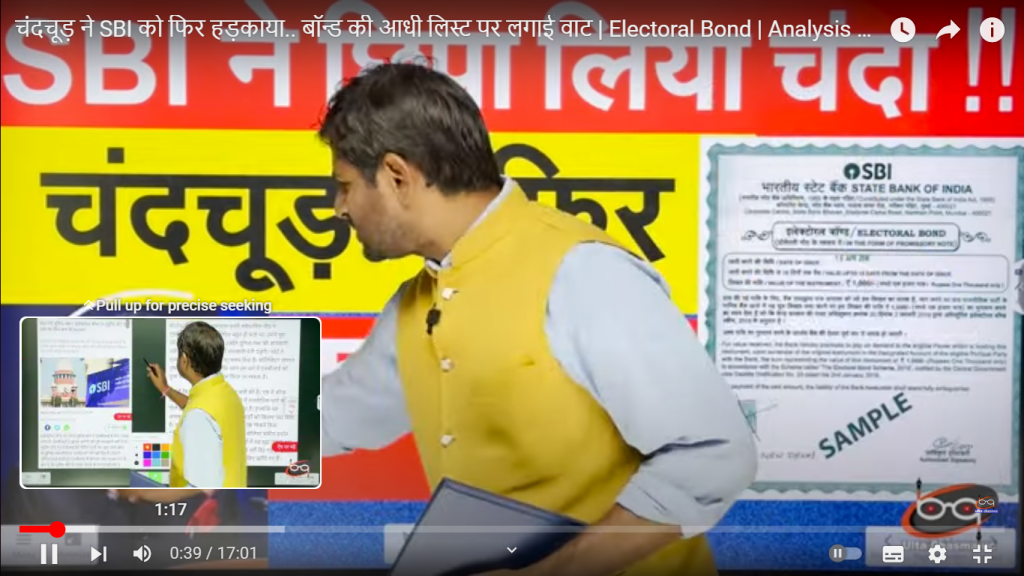


UMEED
WWW.UMEED.ORG.IN

HTTP://WWW.UMEED.ORG.IN

Final fundraising video with further clarification.
We’ve raised 5.5 cr in 5 days.
Sharing new account details:
Al Hadi Educational Trust
AC: 923020049222542
IFSC: UTIB0002759
Branch: Topsia
Axis Bank | Current Account |
Keep supporting us to reach our 10 crore target.
Share This :

Quick Links
Quick Links
Other Pages
Contact Info
- 102/2A, Canopy Enclave, 1st Floor Tiljala Rd, Gobra, Kolkata, West Bengal 700046
- +91 73870 82620
+91 98307-86771 - info@umeed.org.in
Donate Us
Your Support Will Help A Child Come Out Of The Vicious Cycle Of Generational Poverty Through Education, Health Care And Good Upbringing
Privacy Policy | Terms & Conditions
Our Latest Features
TIMES OF INDIA
Bengal man crowdfunds “school of rich for poor”, raises Rs 6 crore in 6 days
Wali Rahmani, a 25-year-old from West Bengal, has successfully crowdfunded Rs 6 crore in just six days for his plan to build a English-medium for underprivileged children
NEWS CUBIC
25 year old Wali Rahmani raised Rs 6 crore for children in 6 days, ‘Umeed Academy’ will open, know how?
25 year old Wali Rahmani, resident of West Bengal, is in discussion on social media these days. The reason is the Rs 6 crore fund raised for the education of poor children
TIMES NOW
Academy That Raised Rs 5.5 Crore in 5 Days, All About Umeed Academy Wali Rahmani
Umeed Academy Founder Wali Rahmani, a social activist and lawyer from West Bengal has successfully crowfunded Rs 5.5 crore in 5 days.
RELIANCE NEWS
Wali Rahmani Crowdfunds 6 Crore in 6 Days to Establish Quality School for Poor Students
When Wali Rahmani, 25, appealed for crowdfunding to establish a quality school for poor children last week, he received overwhelming response. In the last six days, he has been able to collect donation of Rs 6 crore out of Rs 10 crore that he has planned for.
Quick Links
Other Pages
Contact Info
- 102/2A, Canopy Enclave, 1st Floor Tiljala Rd, Gobra, Kolkata, West Bengal 700046
- +91 73870 82620
+91 98307-86771
+91 87770 75988
+91 89817 48572 - info@umeed.org.in
Donate Us
Your Support Will Help A Child Come Out Of The Vicious Cycle Of Generational Poverty Through Education, Health Care And Good Upbringing
FREE MARKETING PLAN
https://www.klientboost.com/
https://910705287724.fbo.foreverliving.com/ind/en-us/home
https://910705287724.fbo.foreverliving.com/ind/en-us/home

GOOD WIFES
https://910705287724.fbo.foreverliving.com/ind/en-us/home
https://910705287724.fbo.foreverliving.com/ind/en-us/home

Ramazan Short Speeches Right After Fajar Prayers for 8 to 10 minutes in Masajid.

Ramazan Short Speeches Right After Fajar Prayers for 8 to 10 minutes in Masajid.
Topics:-
- Taqwa
- Talluq Billah
- Rozay Ki Hifazat
- Itteba e Rasool (SAW)
- Quran Ka Haq
- Haqeeqi Kamyabi
- Zakat
- Maal Ki Muhabbat
- Sabar
- Sukr
- Maut Ki Yaad
- Aakhirat
- Diyanat Dari wo Amaanat
- Allah se Maahidah
- Sacchayei
- Amar Bil Maaroof
- Ahl wo Ayaal Ki Tarbiyat
- Isteqaamat
- Astaghfaar
- Izzat Ka Mayaar
- Padosi Kay Huqooqh
- Deen Ki Tableeqh
- Buraeeyain
- Apni Tarbiyat Aap
- Jumaa Kay Din Kay Aadaab
- Fahhasi wo Bayhayaei
- Zikr Elaahi
- Ghussa
- Namaaz
- Eid Kis Ki
- Taubah
- رمضان المبارک کی مختصر تقریریں فجر کی نماز کے فوراً بعد 8 سے 10 منٹ تک مسجد میں۔
- عنوانات:-
- تقویٰ
- تعلّق باللہ
- روزے کی حفاظت
- إتّباع رسول صلی اللہ علیہ وسلم
- قرآن کا حق
- حقیقی کامیابی
- زکوٰۃ
- مال کی محبت
- صبر
- شکر
- موت کی یاد
- آخر ت
- دیانت داری و امانت
- اللہ سے معاہدہ
- سچائی
- امر بل معروف
- اہل و عیال کی پرورش
- إستقامت
- إستغفار
- عزّت کا میعار
- پڑوسی کے حقوق
- دین کی تبلیغ
- برائیاں
- اپنی تربیّت آپ
- جمعہ کے دن کا آداب
- فحّاشی و بیحیائی
- ذکر الٰہی
- غصّہ
- نماز
- عید کس کی؟
- توبہ




